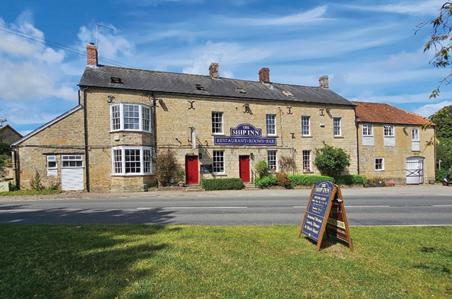

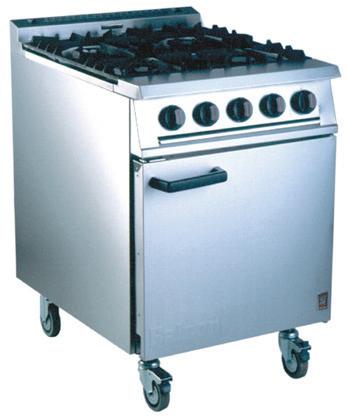
















EDITOR
Peter Adams
The news that 111,000 hospitality jobs will be lost by November's Budget should come as no surprise to anyone who has been paying attention.
At the risk of sounding like a "stuck record," this is a warning we and many other observers, spokespeople, and operators have been sounding for the past 13 months.
The tone deafness is truly astonishing. Like you, I watch government officials talking up the economy and how well we're supposedly doing, and I find myself wondering: am I living in a parallel universe?
The harsh reality is staring us in the face. The sector has lost 8,500 jobs each month since last October – that's almost 300 jobs EACH DAY.
These aren't just statistics on a spreadsheet; they're real people, real livelihoods, and real communities being devastated.
What's particularly galling is that this crisis isn't happening in isolation. As the British Chambers of Commerce (BCC) has reiterated, the government simply cannot place further burdens on businesses when Chancellor Rachel Reeves delivers her Budget next month.
Jane Gratton, deputy director of public policy at the BCC, put it succinctly: "The ongoing impact of business cost pressures, most notably from the national insurance hike, continues to hit the labour market."
She's absolutely right when she adds: "Firms can't absorb further cost pressures. That's why we are clear, there must be no more taxes on business in November's Budget."
So it's not just "sour grapes" from our sector then.
Everyone is saying it –from trade bodies to chambers of commerce, from operators to economists. The warning bells are ringing from every corner of British business.
The hospitality sector has always enjoyed a reputation for resilience, for bouncing back from adversity.

We've weathered recessions, pandemics, and countless challenges over the decades. But there is a point of no return, and we're dangerously close to it.
I sincerely hope the Chancellor heeds these warnings. The choice is stark: either provide genuine support to a sector that employs over 2 million people and serves as the backbone of British social life, or watch as pubs, restaurants, and venues continue to disappear from our high streets and communities at an alarming rate.
On a brighter note, the next 10 days mark Cask Ale Week, and I'm pleased to say that approximately 10,000 pubs and breweries across Britain are participating in this year's celebration, which runs until 28 September.
It's Friday as I write this, and I'm off tonight to celebrate at the Goat & Tricycle here in Bournemouth – fantastic for real ales! This presents significant opportunities for licensees to drive footfall and showcase traditional cask-conditioned ales.
Please do share your photos and comments with us – let's celebrate what makes British hospitality truly special, while we still can.
The sector deserves better than the current trajectory. The question is: will anyone in Westminster be listening?
I would encourage all our readers to follow us on X/Twitter @CLHNews and visit our website at www.catererlicensee.com to sign up for our twice weekly enewsletter.
I can always be contacted at edit@catererlicensee.com




The lowering of the employer NICs threshold has been the most damaging, bringing 774,000 people working part-time and flexible jobs into the tax threshold for the first time.
KEY STATISTICS & TRENDS INCLUDE:
• Increasing Job Losses:
10,963 hospitality jobs were lost in the last month, according to the latest ONS figures.
• Significant Impact:
This brings the total number of job losses since October to 84,000, which is 4% of the sector's total jobs.
• Over Half of All UK Losses:
The hospitality sector accounts for more than half of all jobs lost (55%) across the UK economy since last October.
The scale of job losses necessitates urgent action at the Budget on 26 November. In order to reverse the damage done, UKHospitality is urging the Government to lower business rates, fix NICs and cut VAT.
Kate Nicholls, Chair of UKHospitality, said: “Losing 111,000 hospitality jobs by the Budget will be a devastating landmark for hospitality to reach and will be one that truly illustrates the unthinkable damage done to our sector.
“Hospitality is a sector that has a long and proud history of providing opportunity and jobs for all, and witnessing more than 84,000 jobs lost
in hospitality already is heartbreaking.
“The cost increases introduced at last year’s Budget disproportionately hit our pubs, restaurants, hotels and cafes, to name a few, and particularly the 774,000 people employed on part-time or flexible hours.
“Hospitality is being taxed out and the sheer scale of cost increases hitting the sector is forcing businesses to make tough decisions to cut jobs, raise prices, slash investment and reduce hours.
“This is the opposite of what we want to do. We want to create jobs, help people come back into work, invest in our businesses and support the communities we serve.
“I would urge the Government to act on our concerns and lower business rates, fix NICs and cut VAT at the Budget. We stand ready to work together on solutions that can reverse the damage already done and help hospitality thrive, not just survive.”
Thile the ONS labour market figures show payrolled employees in the accommodation and food services industry saw its biggest year-on-year decline in August, falling 4.1% from 2,174,759 in August 2024 to 2,085,155 in August 2025, vacancies in the sector rose for the first time in a year, up from 74,000 in July 2025 to 78,000 in August 2025.
Saxon Moseley, partner and head of leisure and hospitality at RSM UK, comments:
“While payrolled employees in the hospitality industry saw their biggest year-on-year decline in August, the month-on-month change does indicate the numbers are flattening out. This suggests operators may be close to cutting as far as they can in response to April’s rise in staff

costs.
“Added to this, vacancies in the sector increased for the first time since August 2024, which indicates businesses have turned a corner and are looking to recruit again. However, with speculation and uncertainty building in the lead up to the budget, there’s every possibility this could be derailed, particularly if businesses are hit with additional tax rises.
“Operators need to see government support in the budget rather than further tax burden placed on them. Any tax measures that hit consumers’ disposable income will also have a negative knock-on effect on the sector, so the government must tread extremely carefully.”
Tina McKenzie, Policy Chair of the Federation of Small Businesses, said: “Small businesses are immensely proud of the work they do to help people get on and succeed in life - and we look on in horror at every Government decision that makes that harder.
“Today’s [September 17] awful employment statistics underline the importance of continued efforts in the House of Lords to improve the Government’s proposed new employment laws so that everyone, no matter what their background, has a fair chance of getting into work.
“We urge new Government ministers appointed earlier this month to take the pro-work, pro-jobs action needed to reverse the worrying downward trend in jobs, not least because it’s the right thing to do.
“We continue to ask Peers to hold ministers to their manifesto commitment to full consultation prior to any passing of the Employment Rights Bill, to avoid the negative employment effects needlessly baked into the Bill.”

By Tim Martin

The entire hospitality industry is united in its view that pubs, clubs and restaurants pay wildly excessive taxes, especially VAT and business rates, in comparison with supermarkets.
This tax disparity is harming businesses and high streets, but also the social fabric of the nation –where, other than pubs, can you temporarily escape the attentions of your own family?
Supermarkets pay zero VAT in respect of food sales, whereas pubs and restaurants pay 20%, enabling supermarkets, in effect, to subsidise the selling price of beer, wine and spirits.
A consequent anomaly is that food for posh dinner parties in Notting Hill or the Cotswolds is VATfree, whereas fish and chips at your local pub attracts the full 20%. Just ask Jeremy Clarkson.
As a result of these perverse tax incentives, as investment bank Morgan Stanley recently reported, pubs have lost approximately 50% of their beer trade to supermarkets since the millennium, having lost a substantial amount even before then.
Unfortunately, VAT is not the only hospitality disadvantage. Pubs also pay about 20 times more business rates per pint than supermarkets. Something underhand is afoot.
Here’s how this faulty system works. The explanation is just about complicated enough, so that few people in the government, and maybe even in the Treasury, really understand the details - and therefore the enormous hospitality disadvantage.
The Rateable Value of any business is set by the Valuation Office Agency (VOA), and is equal to the yearly rent the property could have been let for on the open market. For a pub, this is something called the ‘market rent’, which is typically around 10-12% of a pub’s annual turnover.
The Rateable Value is then multiplied by the “National Non-Domestic Rate Multiplier”- the NDRM. For 2025/26 the multiplier is 0.555.
Therefore, a typical pub pays business rates calculated as 0.555 x 10% = 5.6% of its annual turnover. So a pub with sales of £600,000 per annum (less than half the Wetherspoon average) will pay business rates of £33,600 - 5.6% of £600,000 equals £33,600.
Put another way, for every £1 of sales, a pub will pay business rates of 5.6p. That’s 28p on every £5 pint of beer - approximately the average price of a pint these days.
Let’s now compare this with the business rates supermarkets pay. Back in December 2020, Reuters reported that Asda would “pay business rates of £340m… to the UK government… waiving tax relief.”
Asda’s sales were about £23bn in that year, so the business rates payable were just under 1.5% of sales, meaning a £5 pint cost them only 8p.
Unfortunately, the tax disparity per pint between pubs and supermarkets is much worse than that. With their much lower overheads, the average pint of beer bought from a supermarket will be far,
far less than £5 - maybe as little as £1 a pint, meaning a business rate ‘levy’ of only 1.5p.
So, 1.5p in a supermarket versus 28p in a pub… which is nearly 20 TIMES more. Trade organisation UK Hospitality, acting on behalf of the industry, has made a strong case for reducing hospitality taxes, in its heroic campaign to reduce the business rate multiplier.
Unfortunately, this sensible and easy-to-understand approach risks being undermined by a recent, well-meaning suggestion from Greene King, which argues that business rates should be based on profits, rather than sales.

However, this would surely create a nightmare of complexity. Agreeing with government valuation officers a Rateable Value based on the market rent on average, or “hypothetical”, sales is complex enough - but substituting profits for sales involves far more complex calculations, and it’s hard to see how this could benefit publicans, or indeed the government.
Government valuation officers, and those who negotiate with them on behalf of pubs, have built up a substantial body of knowledge, based on local pub sales comparisons.
Reverting to a profits-based analysis would require a huge educational programme, in effect creating a massive increase in demand for tax advisors, which is surely every citizen’s nightmare.
As things stand today, the valuation officers’ primary task, in concert with their pub counterparts, is to estimate the annual sales of a pub on which the market rent is based - that is to say, one number only.
However, a system based on profits is infinitely more complex - the Wetherspoon profit and loss account, for example, has 170 different lines, mostly representing costs, which differ from pub to pub.
In reality, it would be all-but-impossible to agree these costs for every pub in the land. We are sure that Greene King’s heart is in the right place, especially since they brew the sainted
Abbot Ale, but feel they’ve wandered off course, perhaps after a heavy session, by recommending a profitsbased analysis.
Finally, when Jacques Borel campaigned, a few years ago, in the UK for a fairer VAT rate for pubs, clubs and restaurants, which he had successfully obtained in many other European countries, the industry was disunited.
Ted Tuppen of Enterprise Inns and Rooney Anand of Greene King, for example, refused to support Jacques’ campaign. A disunited industry ended up paying far higher VAT than almost any other European country - as the table from The Scottish Hospitality Group, below, illustrates.
The lesson is: Keep It Simple, Stupid. It’s a basic principle that taxes should be fair and equitable. All we’re asking for is equality with supermarkets, which are doing an excellent job for their customers - the same rate of VAT and the same business rates per pint.
That way, of course, the government will collect more taxes in the end, as there will be a more successful hospitality industry, more employment, more vibrant town centres and less vacant shops and pubs. Tax equality equates to sensible economic policies - and we are sure that the entire nation will drink to that.
back to 1782, will be brought back to life under the ownership of Fadmoor Community Pub Limited. The project will be documented in a new Channel 4 observational series titled A Yorkshire Pub with Jon Richardson, produced by Full Fat TV.
Richardson has become a shareholder and says he is ready to put in the hard work with local volunteers. “Pubs are the beating heart of their communities. We’re, hopefully, going to have a great time

was listed as an Asset of Community Value, and last year the group won Community Ownership Fund support to enable the purchase of the building. Renovation is now underway. Integral to this revival is Gerry McMahon, one of the founders of Fadmoor Community Pub Ltd. In early 2025, he was awarded PubAid’s UK Community Regular Hero Award at the Community Pub Hero Awards for his passion, leadership and years of work in saving The Plough.
In the hospitality game, visibility is everything. You can have the coziest bar, the crispiest roast potatoes, and the friendliest service in town – but if people don’t know about it, you’re relying on luck to fill your tables. That’s where HFE Signs comes in.
For over two decades, HFE Signs has been helping pubs, restaurants, and cafés shout about what makes them special. Their high-quality pub & food banners are the perfect way to grab attention, drive footfall, and get your message out to the people who matter – your customers.
BIG, BOLD, AND BUILT TO LAST
These aren’t flimsy bits of plastic that fade in the sun or flap themselves to pieces at the first gust of wind. HFE’s banners are printed on durable PVC with vibrant, UV-resistant inks, ensuring your message stays crisp, colourful, and professional –rain or shine. Measuring a generous 8ft x 3ft, they’re large enough to be read from a distance, whether hung outside your pub, along a roadside fence, or at the entrance to your beer garden. YOUR MESSAGE, YOUR WAY

Whether you want to promote your Sunday carvery, two-for-one burger nights, cask ale festival, or live music weekends, HFE Signs will print your design in stunning full colour. If you don’t have artwork ready, their in-house team can create something for you – at no extra cost. They’ll work with you to make sure your banner is not just eye-catching, but completely on-brand for your pub.
AN OFFER TOO GOOD TO MISS
working day delivery. That’s two huge, professional-quality banners for less than the price of a single small ad in many local papers.
Here’s what that means for you:
• Order on Monday – have them by Tuesday.
• Launch a last-minute special and get the word out instantly.
• Promote different events in different locations at the same time. WHY BANNERS WORK
Advertising isn’t just about reaching people – it’s about reaching the right people. When you place a banner outside your premises or on a nearby busy road, you’re targeting locals and visitors who are already nearby and can easily pop in. It’s immediate, location-specific marketing – the kind that delivers results fast.
Banners also work for repeat visibility. A customer who sees your “Steak Night Thursdays” banner every time they pass will eventually decide to try it. Unlike digital ads that disappear in a scroll, banners stay in place and keep working for you, 24/7.
ORDER TODAY – SEE THE DIFFERENCE TOMORROW
This is the kind of marketing investment that pays for itself in a single busy night. Whether you want to promote an upcoming event, advertise daily specials, or simply make your pub more visible from the
Today’s company insolvency statistics show accommodation and food services insolvencies rose again, this time by 5% (up on the 4% rise last month) from 306 in June 2025 to 327 in July 2025, equalling the highest monthly figure since November 2024.
Year-on-year insolvencies were also up from 323 in July 2024.
It also represented the third consecutive monthly rise – a milestone not surpassed since prior to the current data-set’s starting point in January 2022.
Saxon Moseley, partner and head of leisure and hospitality at leading audit, tax and consulting firm RSM UK, said: “The continued uptick in insolvencies is a worrying trend, but one we have been forecasting for

Pub company Punch Pubs & Co has completed another community clean-up, contributing to the preservation of Cannock Chase’s natural environment.
In partnership with Biffa, the UK’s leader in sustainable waste management, and Molson Coors Beverage Company, the event brought together over 30 volunteers, including members of the local community to tackle litter across the Chase’s stunning woodland.
Held on Monday, 8th September, the initiative reflects Punch’s core value of Doing Well, by Doing Good – the force behind all of the business’s community and sustainability efforts.
Environmental, Social, and Governance (ESG) principles are deeply integrated throughout Punch’s operations, as it continues to engage employees, Publicans, Management Partners (MPs), and suppliers in making it and, in turn, its businesses, more ethical and environmentally friendly.

Families and friends joined the enthusiastic clean-up crew to protect the Chase’s cherished woodland walks, grasslands, and trails – a true community effort to uphold the area of outstanding natural beauty.
Jon Dale, Punch Pubs’ Strategic Corporate Affairs & ESG Lead, who has spearheaded the company’s cleanup campaigns, said: “We’re incredibly proud to have completed a number of community cleans across the country this year. It’s inspiring to see so many people come together to support this initiative and help pro-
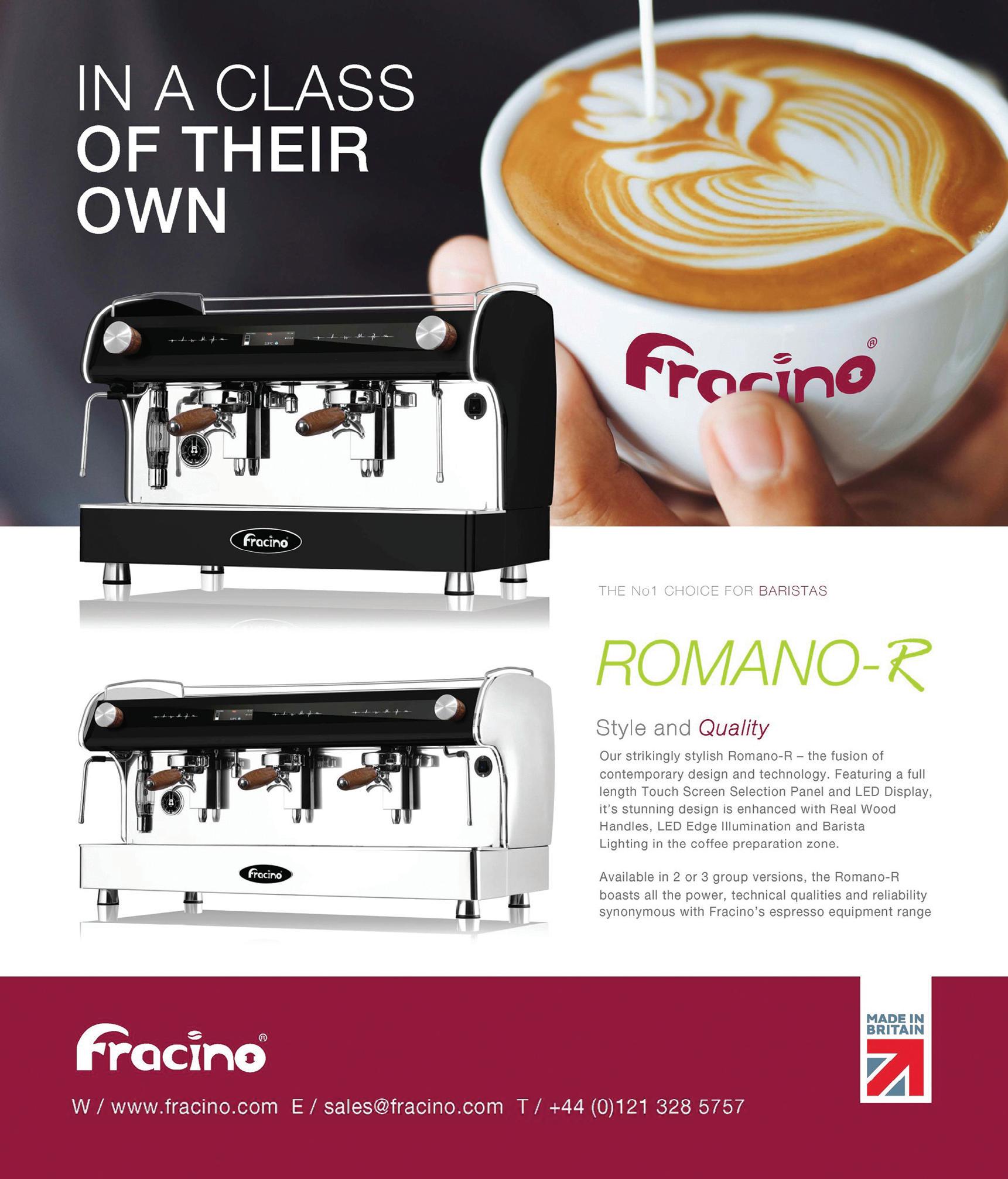
tect these beautiful spaces for future generations.
“Thank you to all who have dedicated their time and effort to ensuring the success of these events. Our momentum continues to increase, and we are confident that we will maintain steady progress in our Doing Well, by Doing Good initiatives, setting a standard within the hospitality industry.”
Together, volunteers collected 76kg of litter, adding to the 390kg of waste gathered across Punch’s community cleans over the past 18 months – all responsibly processed through Biffa’s respected commodity markets.
To celebrate their efforts, volunteers then gathered at local Punch pub, The Hen House, to raise a well-earned pint in recognition of their shared achievement.
Hayley Coles, Staffordshire County Council’s Cabinet Member for Communities and Culture, said: “We’re really grateful to Punch Pubs, Biffa, Molson Coors and all the volunteers who came together to support this clean-up at Cannock Chase. Their efforts make a real difference in protecting the special landscapes and wildlife that make the Chase such a treasured place to visit.
“Partnerships like this show how much we can achieve when communities, businesses and the council work together, and I hope this inspires even more people to volunteer and get involved in caring for our beautiful countryside.”


“The recent proposed increases in business rates in the UK are set to significantly impact various sectors and regions, particularly small and medium-sized enterprises. The adjustments aim to raise £600 million, primarily targeting large retailers like Tesco and Sainsbury's. However, the consequences of these changes will ripple through the economy, affecting SMEs that depend on local consumer spending and economic vitality.
“At BizSpace, we provide flexible workspace solutions to thousands of SMEs across the UK, and many of our clients are reporting that they are at a critical juncture. With soaring inflation and proposed tax increases looming, small and medium-sized enterprises are navigating a precarious economic landscape: the British Retail Consortium has raised alarms about the potential consequences of rising business rates, warning that planned hikes could jeopardise living standards and lead to job losses, particularly among vulnerable SMEs.
“The retail sector, already struggling with declining footfall and rising operational costs, faces a daunting challenge. Major retailers have reported absorbing £7 billion in new costs, a burden that is expected to trickle down to smaller businesses. With food inflation projected to reach 6% by the end of the year, local shops and independent retailers may find it increasingly difficult to compete: many are already feeling the pinch, with reports of shop closures and reduced staff hours, which could further limit consumer spending in local communities.
“The hospitality industry is also on the brink. After weathering the storm of the pandemic, restaurants, cafes and pubs now face the additional strain of rising business rates. With increased operational costs, many estab-
Quote by Aman Parmar, Head of Marketing at BizSpace
(www.bizspace.co.uk)
lishments are being forced to hike prices, which could dampen demand just as they begin to regain their footing. In tourist-dependent areas, such as coastal towns, the combination of reduced visitor numbers and higher prices could stifle recovery efforts, leading to a further decline in local economies.
“The construction sector, too, is feeling the impact. With rising material costs and labour shortages exacerbated by economic uncertainty, construction SMEs are being squeezed from all sides. Many smaller contractors report that increased overheads are making it challenging to take on new projects, while delays in payments from larger firms add to their cash flow woes.
“Conversely, technology and creative industries may have a slight edge in navigating these turbulent waters. These sectors often employ flexible working arrangements and digital solutions, allowing them to adapt more swiftly to changing market conditions. However, they are not immune to rising business rates, which could still lead to increased costs for office space and resources.
“Regional disparities further complicate the situation. Urban areas with a higher concentration of businesses may absorb the impact of rising rates differently from rural areas, where SMEs often operate with fewer resources and rely heavily on local consumer spending. In economically subdued regions, the proposed tax hikes could exacerbate the challenges faced by local businesses, making it all the more difficult to compete with larger firms that can absorb these costs.
“The picture isn’t all doom and gloom. On a more positive note, the prospect of US tariffs on imported goods could present a unique opportunity for British SMEs. By encouraging domestic production and local sourcing, these tariffs may help level the playing field for smaller businesses, allowing them to capture market share and innovate in ways they may not have previously considered. Additionally, the UK government’s new Small Business plan aims to provide targeted support, including financial incentives and mentoring programs, designed to bolster the resilience and growth of SMEs in this challenging climate.
“In an economic environment which is shifting by the day, agility and strategic resource management will be crucial for navigating the challenges ahead. As opportunities emerge alongside the difficulties, it is vital for SMEs to remain adaptable. Without timely action, many could be left fighting to stay afloat in an increasingly difficult landscape.”
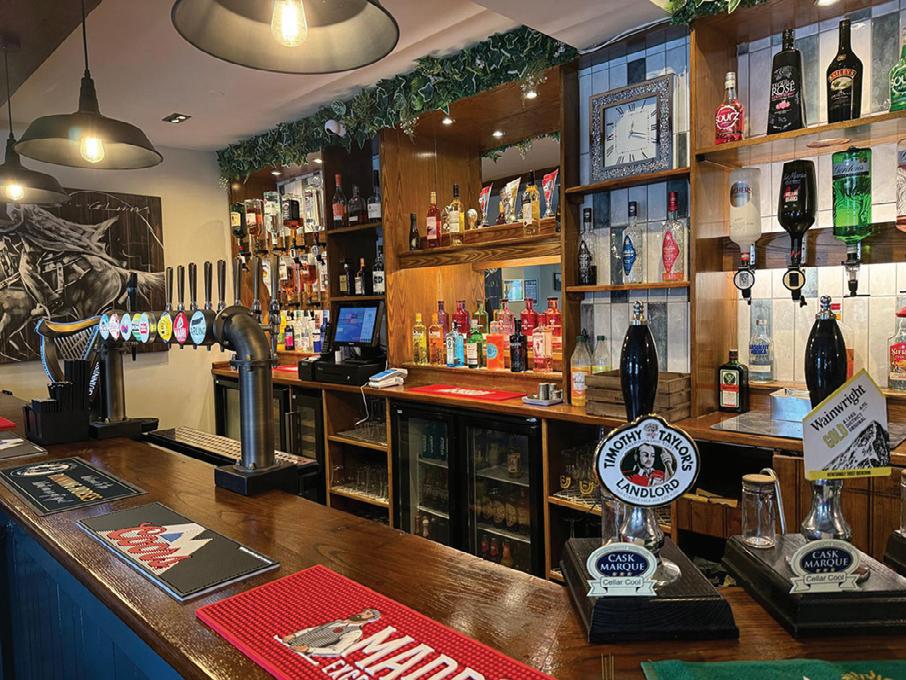
The Running Horses, a family friendly community pub on St James Road in Wigan, is reopening on Friday 19th September following an incredible combined investment of more than £220,000 from Admiral Taverns and passionate licensee, Patricia Nodwell.
The investment will enable the licensee to give the pub a fresh new lease of life and enhance the overall offering to ensure it can remain at the heart of the community for years to come. To celebrate the reopening, the pub will be hosting a live performance from local artist, Andy Crawford, at 8:30pm on Saturday night.
Patricia has been at the helm of The Running Horses for nearly two years and boasts almost a decade of experience within the hospitality sector. Having spent the last 24 years living in Wigan, the licensee brings both comprehensive knowledge and expertise to the pub, alongside a deep understanding and unique passion for the local community.
Patricia Nodwell, Licensee at the Running Horses, commented: “I’m thrilled to be reopening the Running Horses following this fantastic investment. I have loved every second of my time here at the pub and it feels
Benefiting from Fracino's extensive research and development programme, world class engineering skills and state-of-the-art production technology, the Romano-R is a genuine fusion of style and luxurious quality. Available in 2 or 3 group versions, it boasts all the power, technical qualities and reliability synonymous with Fracino products, in a stunning design to create the ultimate coffee bar furniture. The Romano elegantly combines classic curves and retro styling with contemporary materials and close attention to detail, ensuring a truly outstanding finish. Featuring latest technology integration, the full width touch pad features ‘digital trace’ icons for the drink selection and a wide range of control features within the programme - including controlled on/off times for maximum energy efficiency, coffee extraction displayed in volume and time for each espresso shot for precise drink quality, multi-lingual display selection and digital programme
incredibly special to be leading it into this exciting new chapter. I can’t wait to welcome customers, both old and new, back to the pub to show off its brand-new look and everything that it has to offer.
I’d like to take this opportunity to thank the fantastic community for all the support over the last couple of years and of course the team at Admiral Taverns for helping me to bring my vision for the Running Horses to life. I look forward to making everyone proud!”
The pub is owned by Admiral Taverns with 1,400 pubs across England, Scotland and Wales.
Ashleigh Kirk, Business Development Manager at Admiral Taverns, added: “I want to acknowledge and thank Patricia for the passion, energy and commitment she has brought to the Running Horses over the last two years. Her tireless hard work and dedication to the pub have enabled her to create a thriving community pillar that will be enjoyed by all for many years to come.
On behalf of myself and everyone at Admiral Taverns, I wish Patricia and her team at the Running Horses all the very best for the future.”
set-up for easy user adjustment capability.
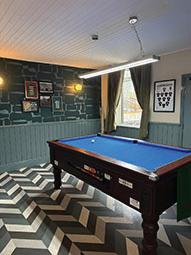
Our powerful combination of stylish design and creative technology enables discerning clients to choose a bespoke finish for their Fracino espresso machine. Our expertise caters for individuality – whether it be to enhance a theme or interior design, promote a brand - or simply to challenge convention.
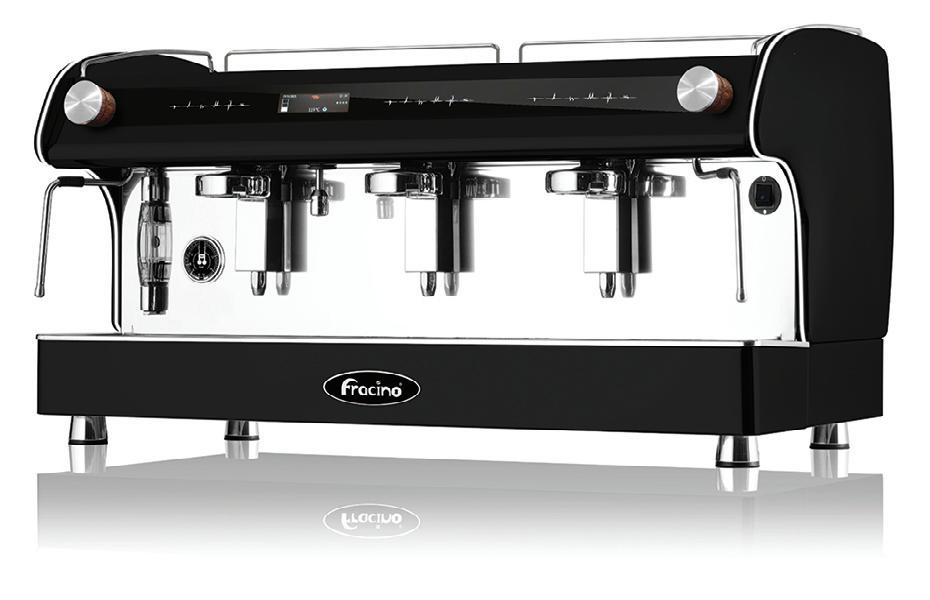
We offer the option to select a bespoke mirror finish in a range of lustrous colours, which draw out the beauty of the highly polished stainless steel, whilst an extensive range of dramatic solid colours – in a satin or matt finish – are available to complement and enhance the interior designer’s creativity and provide the finishing touch befitting the individuality of the exclusive luxury restaurant and coffee bar.
Transforming
Romano!
the advert on page 5 for further
The Bank of England has kept interest rates unchanged at 4% following yesterday’s Monetary Policy Committee meeting, delivering a mixed message for the hospitality and licensed trade sectors grappling with persistent cost inflation and weakened consumer demand.
Governor Andrew Bailey emphasised the need for continued vigilance, stating that monetary policy makers remain cautious about the economic outlook as inflation persists well above the central bank’s 2% target.
The decision comes as food price inflation continues to squeeze profit margins across pubs, restaurants, and hotels. Latest data reveals food and non-alcoholic beverage costs have surged 5.1% year-on-year, with particular pressure from rising beef, dairy, and chocolate prices – key ingredients for many hospitality businesses.
The Bank’s regional agents report that consumer-facing service providers, including licensed premises, continue struggling to pass on elevated labour and food costs to customers already feeling the pinch from broader economic pressures.
TOURISM AND ACCOMMODATION DEMAND REMAINS WEAK
Hotel accommodation and tourism spending across the UK remains notably subdued, according to the
Bank’s latest business intelligence gathering. The central bank noted that consumer demand in these sectors appears concentrated around major events, citing recent high-profile concerts as rare bright spots for venue operators and local hospitality businesses.
This uneven demand pattern presents particular challenges for operators who must maintain staffing and inventory levels while experiencing inconsistent revenue streams.
Two members of the nine-strong Monetary Policy Committee voted for a quarter-point rate cut to 3.75%, suggesting some appetite for further easing. However, the majority position reflects concerns about persistent inflationary pressures, particularly in the services sector where hospitality businesses operate.
The Bank has reduced rates five times since August 2024, bringing them down from a peak of 5.25%. Any future cuts will depend on evidence that underlying price pressures are genuinely subsiding.
With Chancellor Rachel Reeves set to deliver her autumn Budget on 26 November, business confidence remains fragile across the hospitality sector. The Bank’s agents report that many firms cite the upcoming fiscal statement as a source of uncertainty, potentially affecting investment and hiring decisions.
Brakspear held its 13th annual Hospitality Awards on 9th September, bringing together publicans and industry professionals on the banks of the Thames in Henley-on-Thames to recognise outstanding achievement across the brewery’s pub estate.
The awards ceremony celebrated pubs and operators who have demonstrated exceptional performance over the past year, with winners selected through a comprehensive judging process that included business development metrics, customer feedback, mystery visits, TripAdvisor reviews, and assessments by independent industry judges.
Five categories recognised different aspects of pub excellence, with awards going to operators who have shown creativity, community engagement, and business acumen alongside exceptional food and drink offerings.
• Green Fingers Award: The Blackwood Arms, Burnham






Scan below to see how the Landlord of the King’s Head in Carlisle is using his Lincat CIBO+. Speed up service. Expand your menu. Cut down on waste — all without extra sta昀. Discover what the Lincat CIBO+ could do for your business.




• Best Cellar Award: The Dog & Duck, Wokingham
• Best Sunday Roast Award: The Lamb Inn, Great Rissington
• Best Newcomer Award: The Dew Drop Inn, Hurley
• Heart of the Community Award: The Star & Eagle, Goudhurst
The judging process recognised not only commercial success but also the real difference these establishments make within their local communities, highlighting operators who have gone above and beyond in their service delivery and community engagement.
Brakspear extended congratulations to all winners and finalists, acknowledging the dedication of publicans across their estate who maintain high standards of operation throughout the year.
The awards were supported by key industry sponsors including Carlsberg Britvic, Heineken, Diageo, Berkmann Wines, and Beavertown, whose partnership enabled the celebration of excellence across the pub sector.

By Julie Gowland, Partner and Head of Licensing at Birketts LLP (https://www.birketts.co.uk/people/julie-gowland/)

The recent controversy surrounding the Manor Farm pub in Birmingham, where a group of individuals draped in England flags were refused entry, has sparked national debate. But beyond the headlines and social media outrage lies a deeper issue that those within the alcohol licensing industry must consider: the legal and ethical responsibilities of operators under the Licensing Act 2003.
According to reports, the group refused entry had been part of a 200-strong protest against asylum seekers housed at a nearby hotel. Many were intoxicated and confrontational, prompting the pub’s management to deny entry in the interest of safety and public order.
While some critics framed the refusal as unpatriotic or discriminatory, the decision aligns with the core licensing objectives enshrined in the Licensing Act 2003:
1. Prevention of crime and disorder
2. Public safety
3. Prevention of public nuisance
4. Protection of children from harm
These objectives are the foundation of every licensing decision and operational policy.
Operators of licensed premises are legally bound to uphold these objectives. This includes refusing entry to individuals who are intoxicated, aggressive, or likely to disrupt the peace. Section 141 of the Licensing Act makes it an offence to knowingly sell alcohol to a person who is drunk.
Moreover, the Designated Premises Supervisor (DPS), a mandatory role for any premises selling alcohol, must ensure that alcohol is sold responsibly and that staff are trained to identify and manage risks associated with intoxication and disorder.
Greene King, the pub’s parent company, stated that the refused entry was not politically motivated but rather based on concerns over safety and association with protest activity. The manager asked patrons to leave flags at the door to avoid escalating tensions, a decision that aligns with the operator’s duty to prevent disorder and protect staff.
In addition to statutory duties, operators also have a common law right to refuse entry to individuals provided that the refusal is not discriminatory based on the protected characteristics under the Equality Act 2010. Licensed premises are private property, not public spaces, and there is no automatic right of entry for members of the public. This discretion is crucial in managing risk and maintaining order.
In this case, the Manor Farm team acted within their rights and responsibilities. Their refusal was not about the flag itself, but the behaviour and context surrounding its display.
THE IMPORTANCE OF CONTEXT AND DISCRETION
The Licensing Act does not provide a precise definition of “drunk”, nor does it prescribe a one-size-fits-all approach to managing public order. Operators must use discretion, informed by training and experience, to assess risk. This includes evaluating whether a group’s presence could escalate tensions or compromise the safety of other patrons.
The statutory guidance under Section 182 of the Act reinforces this, stating that licence conditions must be tailored to the individual premises and that operators cannot be held responsible for customer behaviour once they leave the premises.
The statutory guidance under Section 182 of the Licensing Act 2003 emphasises that licensing decisions must be proportionate and tailored to the premises. Operators are encouraged to document incidents and decisions to demonstrate compliance with licensing objectives and avoid liability in appeals or judicial reviews.
THE MANOR FARM INCIDENT HIGHLIGHTS THE NEED FOR CLARITY FOR OPERATORS NAVIGATING COMPLEX SOCIAL DYNAMICS, IN PARTICULAR:
1. Clearer guidance on managing politically charged situations
2. Enhanced training on identifying and responding to public order risks
3. Legal protections for staff facing abuse while enforcing licensing conditions
4. Operators are not arbiters of patriotism – they are custodians of public safety. Their decisions must be respected when made in good faith and in line with the law.
PRACTICAL TIPS FOR OPERATORS:
• Train staff to recognise signs of intoxication and disorder.
• Keep incident logs to justify refusals including time, behaviour observed, staff actions and retain any CCTV footage.
• Apply dress codes and search policies consistently.
• Avoid refusals based on political symbols unless linked to behaviour.
• Consult your premises licence for specific conditions.
STANDING FIRM ON LICENSING PRINCIPLES
Political tensions increasingly spill into public spaces and operators must be equipped not only with legal knowledge but also with the confidence to act decisively and fairly. Industry bodies and licensing authorities are increasingly working together to provide clearer frameworks for managing such incidents, ensuring that frontline staff are supported in upholding the law.
Four distinguished establishments in the City of London have been recognized at this year’s Safety Thirst Awards, held at Guildhall. The Steel Yard at All Hallows Lane claimed the Overall Winner award, while Forge Bar on Cornhill secured Runner Up status. Additionally, 1 Lombard Street was honoured with the Best Safety Initiative award, and East India Arms on Gracechurch Street received recognition for Best Community Contribution.
The Safety Thirst Awards celebrate excellence among licensed venues across the Square Mile, including cafes, bars, pubs, clubs, restaurants, and events spaces that participate in the City of London Corporation’s comprehensive safety scheme.
A record 78 Square Mile licensed venues – the highest figure ever –were accredited for this year’s awards, which were first launched in 2006.
As the Licensing Authority for the City, the organisation’s awards promote high standards in reducing crime and anti-social behaviour, while also helping to ensure a safe and pleasant environment for people to socialise in. Businesses apply to become accredited and will only be approved to join the scheme on completion of a satisfactory site assessment. The scheme recognises and celebrates responsible and well-managed venues in the City’s nighttime economy.
It was expanded recently to include criteria on counter terrorism, combatting drink spiking, enhancing women’s safety, tackling sexual harassment, and suicide prevention, all of which are a top priority for the UK’s night-time economy.
Accredited venues, of which they are currently 310, are eligible for a 30% discount from the City’s late-night levy applicable to all venues with permission to sell alcohol between the hours of midnight and 6am on any day of the week.
‘Safety Thirst’ supports Destination City, the City Corporation’s growth strategy for the Square Mile. Attracting businesses, workers, and visitors will ensure the City of London continues to play a leading role in driving London’s and UK’s economy.

Chairman of the City of London Corporation’s Licensing Committee, John Fletcher, said: “Many congratulations to The Steel Yard, Forge Bar, 1 Lombard Street, and East India Arms on their success at this year’s Safety Thirst scheme.
“Venues, such as these four winners, and all 78 accredited venues raise the profile of the Square Mile as a safe place in which to enjoy a night out, as well as underlining the importance that we place on the safety of visitors to the Square Mile.
“For my part, I am delighted that we reached a record number this year, and I hope that this upward trend will continue in the coming years.”
Chief Building Officer at The Steel Yard, Ian McGregor, said: “It was an honour to have won this year’s award as Overall Winner at the Safety Thirst Awards.
“The Steel Yard takes great pride in providing a safe space for people to enjoy themselves in the City of London at the array of different events that we host. The Steel Yard team is very grateful to have the efforts that we all make recognised by the City of London Corporation, and hope to continue to serve the public for many years
to come.”
CEO Eclection Group, Operators of Forge, Roger Payne, said: “We’re incredibly proud that Forge has been recognised as a runner-up in this year’s Safety Thirst Awards.
“Creating a safe, welcoming, and inclusive environment for our guests is at the heart of everything we do, and this accreditation reinforces the work our team puts in every day.
“Initiatives like Safety Thirst are vital for London’s night-time economy, and we are committed to continuing to raise the bar on customer safety, wellbeing, and hospitality excellence.”
Head of Beverages at 1 Lombard Street, Maite Belausteguigoitia, said: “Receiving the award for 1 Lombard Street truly feels like a collective win.
“We are grateful to be surrounded by so many talented professionals who inspire us every day, as well as amazing venues that continue to raise the bar when it comes to innovation, safety, and hospitality excellence.
“My colleagues and I remain committed to making 1 Lombard Street a safe, welcoming, and lively place where people can come together for breakfast, lunch, or dinner. We also feel privileged to play our small part in helping the City of London remain great — a place that is safe, vibrant, and accessible to everyone.”
Licensee of the East India Arms, Bob Benton, said: “I have had the pleasure of being the licensee of the East India Arms for 20 years, and it gave me enormous pride to win the Safety Thirst Best Community Contribution Award.
“There has been a pub on this site since the 1630s, with the current building dating from 1829. We are an historic beacon in the ever-growing Eastern Cluster of the City of London.
“With the support of Shepherd Neame and a great team working with me, we thrive on serving a great range of beers to workers, tourists, and the local community.”
The UK labour market showed further signs of cooling in the latest quarterly data released today by the Office for National Statistics, with unemployment climbing to 4.7% between May and July 2025 – a development that could have mixed implications for hospitality and licensed trade businesses already grappling with staffing challenges.
The unemployment rate has increased from the previous quarter and stands higher than the same period last year, while payroll employment dropped by 142,000 workers (0.5%) in the year to July 2025. The most recent monthly data for August shows payrolled employees falling by 127,000 compared to the same month in 2024.
For hospitality operators, these figures present a complex picture. While the broader labour market cooling might suggest greater availability of workers, the sector continues to face unique recruitment and retention challenges that have persisted since the pandemic.

The ONS data shows UK job vacancies fell by 10,000 (1.4%) in the quarter, dropping to 728,000 between June and August 2025. This downward trend in available positions reflects what economists describe as a normalisation of the labour market following the unprecedented disruption of recent years.
Liz McKeown, ONS Director of Economic Statistics, noted that firms reported fewer job openings in the latest period, though she emphasised that wage growth remains “strong by historic standards” even as it moderates in cash terms when bonuses are excluded.
The cooling labour market comes at a critical time for pub, bar and restaurant operators who have been rebuilding their workforce following pandemic-era disruptions. Many venues have struggled with high staff
turnover and difficulty filling both front-of-house and kitchen positions.
Last month research from insight & research consultancy revealed that a total of 98,746 sites were operating at the end of June—374 fewer than at the start of the year, equating to 62 net closures per month, or two per day. In the context of the overall size of the market, Britain’s number of licensed premises fell by 0.4% in the first six months of 2025.
The closures mean the sector is now 14.2% smaller (net) than it was at the start of the COVID-19 pandemic in March 2020, having recorded more than 16,000 net closures in the ensuing five-year period.
The ONS has cautioned that labour force survey estimates continue to show increased volatility, particularly for data from mid-2023 onwards. Officials recommend interpreting the figures alongside other employment indicators including workforce jobs data and PAYE information.
The August payroll figure of 30.3 million employees is described as provisional and likely to be revised when additional data becomes available next month.
For hospitality business owners, these employment trends underscore the importance of robust recruitment strategies and competitive employment packages. While a softer labour market might eventually ease some hiring pressures, the sector’s specific challenges are likely to persist in the near term.
The data also highlights the ongoing need for the industry to focus on staff retention and career development opportunities to build sustainable workforces in an evolving employment landscape.
This summer’s sunny weather has helped pub operator Young’s increase its half-year sales, as they provide an update on trading for the 24 weeks ended 15 September, ahead of its Capital Markets Day taking place tomorrow, 18 September.
The group report that the strong trading momentum announced in its AGM trading update on the 9 July 2025 has continued through the summer, with like-for-like sales up 5.6% and total sales up 5.3% in the period.
This performance they say, reflects healthy demand for premium, individual and well invested pubs, supported by the ongoing sunny weather as customers continued to enjoy gardens, riverside locations and out-
door spaces.
Investments during the period also included several former City Pub sites such as Daly’s Wine Bar, Bow Street Tavern and the Old Firehouse, all completed ahead of the autumn and busy festive periods. Simon Dodd, CEO of Young’s, commented: “It is fantastic to be reporting another strong trading period for Young’s. This performance is all thanks to our brilliant teams who continue to delight our customers across our well invested pubs, against a backdrop of prolonged warm weather in the UK. We enter the autumn in a strong position and expect to maintain the momentum into the all-important Christmas trading period, giving us confidence in the remainder of the year.”

By Giles Fuchs, Owner and Co-Managing Director of Burgh

Heston Blumenthal has issued a call to arms in CityAM, urging action to preserve the future of Britain's pubs . The crisis facing Britain’s pubs is no longer abstract. In the first half of 2025 alone, 209 pubs closed their doors in England and Wales; an average of eight every week More than 8,000 are technically insolvent, with 4,600 at the highest level of financial risk Business rates relief has been cut from 75 percent to 40 percent, increasing tax bills for many small pubs by 140 percent almost overnight. Meanwhile, April’s rise in employer National Insurance Contributions has added an additional £1 billion in costs across the hospitality sector, affecting an estimated 774,000 For most pubs, these pressures are punishing. For historic pubs, which shoulder extra costs in maintaining listed buildings or preserving centuries-old interiors, the challenge is existential. If we allow these cultural landmarks to vanish, we are not merely losing businesses; it means erasing part of Britain’s cultural and architectural legacy.
Historic pubs are more than drinking establishments. They are places where culture, economy, and community converge. Consider Ye Olde Cheshire Cheese in London, restored after the Great Fire and beloved by generations of writers. Or The Lamb & Flag in Oxford, frequented by John Dryden and countless students since. Or The Spaniards Inn in Hampstead, once the haunt of Dick Turpin and immortalised in Bram Stoker’s Dracula. Closer to home, my own Pilchard Inn has survived centuries of storms, pirates, and smugglers. Legend has it that Tom Crocker, one of Britain’s most notorious pirates, still haunts its bar. Pubs such as these have long been at the heart of English life, from serving as meeting places for local councils in medieval times to shelters for soldiers during the world wars. To see such pubs vanish would be a cultural tragedy. They are not just places to raise a pint but living repositories of memory and tradition; woven into the fabric of their communities.
A MANIFESTO FOR PRESERVATION
This is not an inevitable decline. With targeted support, we can preserve these places for generations to
come. I propose six practical steps.
1. Enhanced business rate relief for historic pubs. Listed pubs or those of cultural significance should receive additional relief, reducing the financial pressure that has been compounded by the April cut in sector-wide support.
2. A Heritage Pub Fund. Public or philanthropic finance could provide grants for the authentic restoration of historic pubs; conserving Victorian interiors, timber frames, or façades that might otherwise be lost.
3. Commercial partnerships. Local breweries, landlords, or national drinks companies could commit a portion of profits to preservation, mirroring how The Lamb & Flag in Oxford channels its income into scholarships.
4. Employer NIC relief. The April 2025 increase in NIC has disproportionately hit low-paid hospitality staff. Offering targeted NIC relief for historic pubs would offset these pressures and keep more people employed.
5. A dedicated historic hospitality strategy. Sector-specific consultation before tax or wage changes would give heritage pubs greater stability. We cannot treat a 700-year-old inn in the same way as a modern chain pub.
6. Match-funding for community crowdfunding. If a community rallies to save its local historic pub, central or local government should match those contributions, officially recognising their cultural value.
The hospitality sector already contributes £93 billion to the UK economy each year and employs 3.5 million people. UKHospitality estimates it could add £29 billion and half a million more jobs by 2027 with the right support. But that growth will be undermined if our most historic establishments vanish.
At Burgh Island, we know the challenges intimately. Running a centuries-old pub is not the same as running a modern bar. Tides dictate when staff can arrive and leave. Maintenance costs are constant. Yet the value it brings to the community and to Britain’s tourism industry is immeasurable.
This is why we must act now. Just as the country invests in protecting its cathedrals, stately homes, or industrial heritage, we must invest in protecting pubs that tell the story of our nation.
The late Victorian poet G. K. Chesterton once described the pub as “the house of commons of the common man.” That phrase remains true today. Pubs are where communities meet, debates are held, friendships are formed, and memories are made.
We should not allow the combined weight of soaring costs, rising taxes, and mounting debt to snuff out such a central part of our heritage. The six steps outlined are both achievable and practical offering historic pubs the lifeline they urgently require.
Britain’s historic pubs are not relics; they are living, breathing institutions. If we act now, we can ensure they remain not just for us, but for generations to come. To lose them would be to lose a vital part of our national identity.

the future of station pubs forever from forgotten places that were there to kill time, to being a destination in its own right and a place where trains were deliberately missed for another pint and weary travellers could refuel, recharge and relax.
On the top floor of this iconic building, full service and laid tables welcome guests and bring a touch of class – stirring memories of French elegance from the great station restaurants of Paris and increasing customer dwell time. The kitchen team, under the leadership of Rachid Messaoudi – who has been at The Parcel Yard since its original opening – mixes pub classics with a range of mouth-watering specials and an exciting range of beers and wines.
Downstairs, the classic Fuller’s pub has been given a stylish makeover. The main atrium plays host to lone travellers and excited parties alike, while velvet-covered armchairs bring a new level of opulence throughout. Comfort is at the forefront but the departure information screens remain to ensure trains are not
missed and sharing platters and small plates on the pub’s menu offer a quick and tasty addition to the pre-train pint.
In addition to the two major customer areas, The Parcel Yard’s popular meeting rooms have also been refurbished – offering a range of sizes for everything from corporate meetings to weddings.
General Manager, Barbara Habib, said: “I’ve always loved The Parcel Yard – having been a deputy manager here when it first opened.

It looks better than ever following this investment and I know the customers are going to love it. I can’t wait to welcome both familiar and new faces and show off our fantastic venue.” Fred Turner, Chief Operating Officer at Fuller’s, said: “The Parcel Yard has been an incredibly successful site for Fuller’s over the last 13 years – and now, to celebrate its coming of age, we have taken it to a whole new level.
“Whether you are stopping for a quick pint while waiting for a train,
or
The high level of food inflation, which is causing significant challenges for out-of-home operators, is set to continue across the autumn and into the peak festive trading period, warns hospitality purchasing specialist Lynx Purchasing.
Spiralling prices on a range of food and drink staples are adding to the higher costs already facing the sector in areas such as wages and NI contributions. The warning comes as Lynx Purchasing publishes the Autumn 2025 edition of its regular Market Forecast.
“While the official ONS inflation rate is currently 3.8%, which is a challenge in itself, at 4.2% food inflation is significantly higher,” says Rachel Dobson, managing director of Lynx Purchasing. “With a higher rate of food price increases forecast to continue well into 2026, operators planning autumn menus, as well as trying to secure advance festive bookings, are walking a tightrope.

“Consumer confidence is fragile, making it hard to increase menu prices, but at the same time, food inflation quickly erodes operators’ margins, unless they can either save on purchasing costs, or pass at least some of the increase onto customers via higher menu prices.
“In addition, the impact of the extreme weather across the summer, from wildfires in Europe to water shortages for UK farmers, will be felt in produce prices for some months to come,”
The Market Forecast uses exclusive insight supplied by the range of suppliers that Lynx works with, as well as official inflation data, to look at food and drink pricing across the coming months.
AREAS FLAGGED UP IN THE AUTUMN 2025 LYNX PURCHASING MARKET FORECAST INCLUDE:
Beef: UK cattle farmers remain reluctant to expand production due to very high rearing costs. As a result, beef prices are expected to rise further across the autumn, as retailers compete for the available supplies. This leaves hospitality operators in the challenging position of dealing with higher prices and lower availability as the peak season approaches.
Chicken: While prices have been more stable recently, costs are rising in line with the general food inflation trend, and poultry supplies remain vulnerable to avian flu, as well as higher feed costs.
£275,000

community pub,
on Friday 5th September following a combined investment of £275,000 from experienced licensee,
and
Inside, the Crown & Cannon has undergone a full refurbishment to elevate and modernise the overall look and feel, whilst still maintaining all the charm of the pub’s original features such as the open fireplace.
Thanks to the investment, the pub now boasts a sleek new bar, a combination of brand-new tiled, wood-effect and carpet flooring as well as all new, comfortable furniture to further add to the welcoming atmosphere.
Externally, the pub greets customers with brandnew signage, lighting, wooden tables and decorative hanging baskets as well as two spacious outdoor seating areas – one at the front of the site and one at the back seating a total of 40 guests.
Passionate licensee, Jacquie, brings a wealth of knowledge and expertise to the Crown & Cannon having not only grown up in the local area, but also having spent the last five years at the helm of the pub. During her time as licensee, she has worked
tirelessly to create a vibrant social hub where everyone – including four legged friends – feels welcome and that crucially, supports all aspects of community life.
To celebrate the reopening, Jacquie chose to donate £100 to baby loss charity, Tommy’s, a cause close to her heart.
Jacquie Hall, Licensee at the Crown & Cannon, commented: “I’m absolutely thrilled with the results of this incredible investment, and I’m delighted to have reopened our doors once again.
We may have a fresh new look, but it’s the community that makes this pub what it is, so it’s been a real joy welcoming them back. Andy and I have loved every second of our time here at the Crown & Cannon and it means so much to us to be able to take it forward into this new, exciting chapter.
I’d like to thank everyone for all their support over the last five years, and of course Admiral Taverns for helping us bring this transformation to life. I can’t wait for everything the future has in store!”
Samantha Banks, Business Development Manager at Admiral Taverns, added: “I would like to thank Jacquie and Andy for the passion, energy and commitment they have brought to the Crown & Cannon since they took over.
They have done a fantastic job at creating a thriving community pillar that is enjoyed by all, and I have no doubt it will continue to be cherished by local residents for years to come thanks to their continued hard work. On behalf of myself and everyone at Admiral Taverns, I wish Jacquie, Andy and the whole team at the Crown and Cannon all the very best for the future.”
Produce: Suppliers are warning that the effects of extreme weather across the summer will impact price and availability for some time. Broccoli and cauliflower are already in short supply, while the combination of the heatwave and hosepipe bans made it harder to plant UK winter crops of a range of produce, including potatoes, parsnips and carrots, Furter afield, European production of salad crops such as tomatoes, peppers, cucumbers and lettuce has been restricted by widespread wildfires.
Dairy: Dairy prices have been high for much of this year, and producers have warned that higher costs in areas such as cattle feed, as well as a shortage of labour, will continue to have an impact. Butter has seen sharp price increases, and the challenges also affect prices of manufactured products which use dairy, as well as cheese.
IN CONTRAST, THERE IS MORE POSITIVE NEWS IN SOME MENU AREAS:
Fish & Seafood: Cooler waters in autumn create good conditions for a wide range of fish and seafood, with species including mackerel, coley, plaice, lemon sole and mussels from UK waters expected to be good value.
Potatoes: Despite concerns about the impact of the hot summer, suppliers are reporting that the UK crop is good in terms of quality and yield, which should keep prices at reasonable levels across the autumn and winter. Higher European production should also mean processed potato products will be better value.
Dobson adds: “Operators who can keep menus flexible and work with suppliers with suppliers to make then most of changing availability are best places to mitigate the impact of high levels of food inflation.
“Using specials boards to feature better value cuts of meat, or less familiar fish varieties, can boost margins and appeal to customers looking for something different when they eat out. Many varieties of UK grown fruit and veg, such as kale, chard, parsnips and pears, did well despite the hot weather, and offer good value and availability.”
Dobson adds: “When it comes to planning festive menus and trying to secure bookings, the best advice is for operators to talk to suppliers abouts availability and plan accordingly. For example, farmed smoked trout can be better value on a set menu than smoked salmon, without affecting customer perceptions of menu quality,”

By Paul Wainwright at Harrison (www.weareharrison.com)

We are drowning in a sea of AI articles, filling inboxes and flooding social media. We are in stage one of the hype cycle: ‘hysteria’. It’s the new buzz word, just as ‘strategy’ and ‘authentic’ once dominated the design world, or when everything had to be ‘Smart’.
ADVOCATE
To be clear, I am a champion of AI and embracing new technology. Tools which are indispensable today once caused panic: CAD, POS systems, the internet, and even the calculator. Would I go as far as saying I couldn’t live without AI? Probably not, but it definitely makes my life easier, saving time and bringing focus to my weekly tasks.
In hospitality right now, I see examples of AI being used positively to benefit operations, and wildly overused for the sake of it.
AI
At its heart, AI is a fancy screwdriver. Use it to hammer in nails, you’re using it wrong, but you’ll get the same result. AI is a tool, nothing more, nothing less. Large Language Models (LLMs) create the illusion of intelligence rather than true cognition. And yet, the hype can quickly outpace reality.
Taco Bell’s recent drive-thru experiment went viral – customers ordered absurd amounts of water, in one clip a request for 18,000 cups sent the system into a loop of confusion. Or, the AI repeatedly asked, “And what will you drink with that?”, after a drink had been ordered. It is not the first, either: McDonald’s AI added bacon to ice cream orders. Both companies had to pause and reconsider how and where the technology could actually work. Demonstrable of what happens when the promise of AI meets the real world.
Closer to home, AI argued with me when I questioned the information it was giving from outdated details from Wikipedia – which is also self-editable. There lies the problem with current AI models: it’s only as good as the information it can draw on, and that information can be manipulated.
Current AI is an illusion – pattern recognition and algorithms. The moment you understand AI is not magic, nor is it a monster, is when you can see its true potential.
AI will change industries, jobs will disappear. This is the unavoidable cost of progress. The car replaced the horse as the main form of transport and industries were forced to evolve or die. The print press, once the marvel of the world, is now it’s saved for specialty and limited runs. Some jobs will change, some will disappear, and others evolve. The ones left standing will emerge in a new world of possibilities. Rockefeller, Akio Morita, and the Michelin brothers all stood at a crossroads of technology like we stand now and grew to become global leaders in their field.
AI models should remove the burden of repetitive work, allowing data-heavy tasks to be done faster and with greater accuracy.
In hospitality, value can be added to Marketing and Loyalty, Training and Staff Development, Operations and Efficiency, and Guest Experience.
The assumption is AI=efficiency=value, and that’s not always the case. For example, predictive demand can optimise staffing models. However, over-optimising could lead to fragility – a kitchen staffed ‘just enough’ based on an AI forecast could collapse when unexpected diners arrive. Humans are unpredictable and AI doesn’t have the wherewithal to understand this.
Sometimes the value is found in slowing down or personal connection. AI should never be used to remove the human-added value. Empathy, creativity, leadership, emotional connection and strategy can all benefit from the integration of AI, but humans need to be central as well. Understanding AI, both its limitations and benefits, will allow businesses to move up the value chain rather than compete with it.
Experiment daily, but with smaller tasks. Keep systems and checks in place and remember, it took six years for a company specialising in AI space planning to train its system using US building code before it was market ready. Teams must understand how to use AI responsibly. I can’t stress enough that foundations matter. What you get out is only as good as what you put in.
AI is best used as decision support, not absolute control. The sweet spot today is augment, not fully automate. The best hospitality players will use AI to remove friction in background processes and free up humans to deliver warmth, surprise, and care, the bits guests actually remember.
The question to ask is not “Where can we add AI?” but “Where is our human talent currently wasted, and how can AI give that time back?”
And my final words… Don’t Panic.
VisitEngland has today Wednesday 10 September revealed this year’s winners of its Accommodation Quality Scheme 2025 ROSE Awards.
The ROSE (Recognition Of Service Excellence) Awards showcase the accommodation providers who deliver the warmest of welcomes and where the staff provide incredible experiences for their customers irrespective of star rating, style or type of accommodation.
VisitEngland Director Andrew Stokes said: ROSE Awards honour England’s outstanding accommodation providers who combine excellent hospitality with exceptional service to create lasting memories for their guests. These establishments anchor great holidays, encouraging visitors to discover more locally whilst generating vital tourism income for communities. From boutique glamping to premier B&Bs, characterful pubs to family holiday parks, and working farms to secluded retreats, England’s diverse accommodation sector offers something special for every taste and budget.”

The ROSE Award winners were nominated by VisitEngland’s Quality Scheme Assessors and selected from
Assessor comments and online feedback from overseas and domestic visitors. Recipients of the awards include all types of accommodation from B&Bs/guesthouses, self-catering and hotels to parks, glamping sites and hostels and cover a range of ratings from three to five stars, as well as accredited properties.
ROSE Award recipients are all part of the VisitEngland Quality Schemes and demonstrate a commitment to delivering innovation and excellent service.
The VisitEngland ROSE Awards 2025, now in their ninth year, were presented at an event on Wednesday 10 September at The Post Barn, Old Oxford Road, Newbury, Berkshire.
Tourism is one of England’s largest and most valuable industries, delivering economic growth right across the country.
See the full list of ROSE Award 2025 winners go to: VisitEngland Quality Assessment Services | VisitBritain.org
From busy pub gardens to stylish dining terraces, the right outdoor space isn’t just extra seating—it’s extra revenue. For over two decades, AEL Outdoor Solutions has partnered with independent operators, multi-site groups, and national pub companies to turn outdoor areas into high-performing trading spaces.
We design, manufacture, and supply a wide range of outdoor furniture, structures, and equipment—combining style, durability, and practicality so you can maximise covers, extend trading seasons, and create spaces that encourage customers to stay longer and spend more.
MADE IN READING – SOURCED

Many of our products are crafted at our own Reading facility, giving you control over customisation, lead times, and quality. We also work with trusted manufacturing partners to expand our range and deliver the best value. From booth seating and benches to planters, shelters, and dining sets,
every item is selected or made to meet the demands of busy pub and hospitality environments.
“We work with your budget and brand, producing 2D designs and visuals so you can see exactly how your outdoor space will look before committing,” says Laura Gardiner, Head of Marketing. “Whether you run one site or a national estate, our tailored seating, tables, and structures are built for your customers and your trading needs.”
Everything You Need for a Profitable Outdoor Area
Our range spans everything from contemporary seating and dining furniture to shade structures, shelters, and outdoor solutions, complemented by heating, lighting, and safety features. We also offer play equipment that encourages imaginative, active fun while meeting the highest safety standards, ensuring each space is both functional and inspiring. We also offer bespoke solutions to match your brand and venue style—whether for a single garden or a full estate rollout.
BUILT FOR PEOPLE, BUILT TO LAST
We prioritise responsibly sourced materials and design for longevity— reducing replacement costs and supporting your sustainability goals. All products are chosen or built to meet strict hospitality standards for safety, comfort, and performance.
FROM CONCEPT TO COMPLETION
From free quotes to full installation, our design, manufacturing, and sourcing teams keep projects on track, on budget, and exactly on brief—whether you need a quick refresh or a large-scale rollout.
EXPERIENCE
OUR 10,000 SQ FT SHOWROOM

See our products in real pub-garden settings at our Reading showroom, or browse online at www.aelsolutions.com. With over 20 years’ experience working with the UK’s top pub companies, we know how to create outdoor spaces that boost trade in all weathers.
Email: sales@aelsolutions.com
Download your brochure: www.aelsolutions.com
AEL Outdoor Solutions – Your partner for profitable, allweather trading spaces.

By Hannah Strawbridge, CEO, Founder, and Employment Law Solicitor at Han Law

Recruitment and retention remain chronic issues in hospitality and unlicensed trade sectors. With staff shortages, many operators are understandably keen to fill shifts quickly. But taking on someone who does not have the legal right to work in the UK carries serious risks. From February 2024, civil penalties for employers have been sharply increased, and ignorance or sloppy checks are no defence. Here’s what you need to know — what the law requires, what can go wrong, what penalties you face, and how to avoid them.
Under the Immigration, Asylum and Nationality Act 2006 (as amended), any employer in the UK must ensure that anyone they employ has the legal right to work here. That includes:
- UK citizens;
- nationals from certain recognised countries;
- people with valid visas, residence, or immigration status that permits work;
- and some other categories, depending on immigration rules. The employer must conduct right-to-work checks before employment
begins. Those checks must follow the Home Office’s prescribed method of inspecting original documents (or using the Home Office online system / identity verification service, where applicable), and these must be copied or recorded and checked for expiry. If someone has time limited permission, then follow up or repeat checks are necessary. If you don’t do them properly, you may lose the “statutory excuse” defence.
It's worth noting that if you employ someone knowing, or with reasonable cause to believe, they do not have the right to work then criminal penalties may apply in addition to civil penalties.
The penalties for employing illegal workers are now very stiff:
- For a first breach, the maximum civil penalty per illegal worker is £45,000.
- For repeat offences, the maximum rises to £60,000 per illegal worker.
- Employers may also face criminal liability (including potentially unlimited fines and imprisonment) if they knew or had “reasonable cause to believe” that the worker did not have the right to work.
Other consequences may include loss or refusal of a Sponsor Licence, reputational damage, and in some cases, Director disqualification.
THRESHOLDS, OCCUPATION, AND SECTOR SPECIFIC
While the law and penalties apply across all sectors, including hospitality and the unlicensed trade, some particulars are especially relevant:
- Even for part time, casual, zero hours workers, or seasonal staff, the same rules apply.
- If someone’s immigration status is time limited, you must track expiry and repeat checks.
- With the rise of platform work and subcontracting, many more arrangements may fall under future legislation.
A recent example of this was In July 2025, a fish and chip shop owner in Surrey was fined £40,000 for employing someone who allegedly used false identity documents. The employee had provided several documents,
including a passport copy and NI number, but the employer failed to check the original passport. This shows that even small errors including clerical omissions such as failure to verify original documents can lead to large penalties.
HOW HOSPITALITY OPERATORS CAN PROTECT THEMSELVES
Given the tight labour market, here are best practices to avoid accidentally employing someone illegally:
1. Establish and follow a standard right to work check procedure.
2. Check before someone starts.
3. Keep good records.
4. Train your staff.
5. Use the Employer Checking Service where necessary.
6. Self audit and seek legal advice.
For operators in hospitality and unlicensed trade, it is more important than ever to get ‘right to work’ checks absolutely right. With penalties now ranging up to £60,000 per illegal worker for repeat breaches, the financial and reputational risks are high. The law demands diligence: original documents, documented checks, follow ups, and robust internal policies. If you do so, you protect your business; if you neglect these obligations, the cost can be ruinous.
RIGHT TO WORK CHECK – QUICK CHECKLIST FOR HOSPITALITY OPERATORS
*Obtain original documents or use the official online checking service.
*Check validity – photos, names, dates of birth, expiry dates.
*Make and keep copies (with date and name of checker).
*Conduct follow up checks if permission is time limited.
* Train staff on correct procedure.
*Keep records for at least two years after employment ends.
The leading light at a Lake District hotel group has received a lifetime award in recognition of his career achievements over the last 40 years.
Simon Berry, the executive chairman of English Lakes Hotels Resorts & Venues, has won the national Family Business Lifetime Achievement accolade. He received the award at a gala event in London as part of the National Family Business Day celebrations.
Managing director of Cumbria Tourism Gill Haigh says: “Simon has been the driving force behind the growth and success of English Lakes Hotels.”
“Whilst overseeing a host of developments and modernisation projects which have steered the hotel group into a new era for tourism, Simon has ensured that the company’s family values and ethos in terms of hospitality, customer service and workforce development and training have never wavered.”

“Simon has also always been a keen advocate for the Lake District’s heritage, environment and local communities. Working with the family, he has overseen the introduction of several significant renewable energy projects with clear sustainability goals and new approaches to regenerative tourism. He has served the local community, its economy and charitable initiatives in various roles throughout his career, working tirelessly to raise their profile and help them thrive and grow.”
Simon has served as a director for several other companies and organisations over the years including Cumbria Tourism, Best Western hotels, The Cumberland Building Society and Open Arms International. He was appointed as the High Sheriff for Cumbria for 2018-19.
He has also been a board member for Cumbria Vision and helped set up Nurture Lakeland to develop and foster relationships between environmental bodies and the tourism industry.
Simon Berry adds: “Winning this lifetime achievement award from Family Business United is a real honour and a poignant reminder of how far we have come as a family running the hotel group together for over 70 years.
“In the 40 years I have worked for the company, we have seen a lot of change, especially with the speed of technological developments and innovation in the hospitality and tourism industry in the last few decades. One thing that remains constant is our collective values of respect, creativity and fun.”
Paul Andrews from Family Business United says: “Simon is an outstanding individual with a pure passion and pride for the hospitality sector and the values he holds dear, creating a business that is truly special and successful. He has an unwavering desire to create special places for people to stay and spend time.”
CLEAN Linen & Workwear are one of the UK's most trusted laundry companies. They supply tailored workwear solutions provided by real people. Their comprehensive laundry network means they can service customers throughout England and Wales, providing chefswear, workwear and linen rental services. Whether you operate from a single-site hotel, pub or restaurant or have multiple locations, CLEAN can tailor a workwear rental solution to suit your business requirements. They offer various uniform options to support the entire kitchen brigade, from Executive Chefs to Kitchen Porters. With their workwear rental service, you can say goodbye to the hassle of purchasing, storing, and maintaining chef and kitchen uniforms. Instead, enjoy the convenience of a hassle-free rental system that provides freshly laundered garments whenever your team need them. By renting with CLEAN, you can avoid upfront purchase costs, spread the payments over your contract, and ensure quality and care with every wash. Delivery is free, and there

are no hidden charges; contracts even include repairs. Each item of clothing can be branded and tailored to the wearer with logos and embroidery. Their managed service prevents issues compiling when supplying your team with work clothes; a convenient locker valet service helps distribute and store uniforms, and they tackle minor repairs early to extend the service life of a uniform. Ultimately, this avoids costly replacements wherever possible as it reduces uniform losses, and uniforms only need replacing when a repair is not safe or cost-effective.
With CLEAN's workwear rental and laundry service, business owners can focus on what matters most — running their business — while CLEAN takes care of the rest.
To find out more: www.cleanservices.co.uk or see the advert on page 3.

The Night Time Industries Association (NTIA) is calling on the Government to act in the upcoming Autumn Budget to #CutTheDancefloorTax and protect the spaces that make towns and cities vibrant.
This crisis they say is not just economic, it is cultural. Dancefloors, whether in pubs, bars, or clubs, are spaces of freedom and expression, where communities gather, artists perform, and people can express themselves. This is not about tradition; it is about protecting vital platforms for social, creative, and cultural life.
ACCORDING TO RESEARCH:
- The late-night sector has shrunk 26.4% since March 2020, compared with 8.1% in the wider evening economy.
- Nearly 800 venues have closed in the last 5 years, with three shutting every week over the past three months.

- More than 89,000 jobs have been lost since October 2024, while 7 in 10 venues are losing money or barely breaking even.
- A quarter of towns and cities that had nightclubs in 2020 now have none, 16% have lost all late night venues completely
The research also reveals that trading conditions are critical with operating costs have risen by 30–40% since 2020, compounded by rent, energy, staffing pressures, and taxation. The Autumn Budget earlier this year added £30,000–£80,000 in extra costs per venue, pushing businesses to breaking point. Consumers want to go out, but cost-of-living pressures, safety concerns, and limited late-night transport put nights out beyond reach for many.
Michael Kill, CEO, NTIA, said: “Britain’s nightlife is under real threat. Dancefloor’s, whether in pubs, bars, or clubs, are spaces of freedom, creativity, and expression, where communities gather, artists perform, and people
can be themselves. Venues are closing, jobs are being lost, and trading conditions are unsustainable. The Government must recognise that it does not own dancefloors, they are owned by communities.
The Autumn Budget is a critical point in the Chancellors tenure, and we expect the Government to be judged on the outcome on the 26th November. They must give businesses the financial headroom to survive, we are urging them to consider cutting VAT, reinstating employers’ National Insurance thresholds, and to move towards a fairer more considered business rates system. Every week we delay, more venues disappear. The time to act is now.”
THE NTIA IS CALLING ON THE GOVERNMENT TO TAKE URGENT ACTION THROUGH THREE KEY MEASURES:
- Cut VAT for Hospitality & Night-Time Economy – Permanently reduce VAT for venues, bars, and clubs to support recovery and longterm growth.
- Reinstate National Insurance Thresholds for Employers – Ease hiring pressures on hospitality and nighttime businesses to protect jobs.
- Deliver Transactional Reform of Business Rates – Lower the Hospitality and NTE Business Multiplier and reform business rates to provide much-needed relief and stability.
The NTIA has urgesd MPs, policymakers, industry leaders, and the public to support the #CutTheDancefloorTax campaign and pressure the Chancellor, along with the Secretary of State for Business and Trade, and the Secretary of State for DCMS to act in the Autumn Budget.
Operators are urged to write their MP Today in support! Follow the simple instructions –https://ntia.co.uk/email-your-mp/find-your-mp-protect-britains-night-time-economy/
A ‘Walk for Wellbeing’ will showcase some of central Bristol’s most scenic sights next month while raising funds for the Hospitality Action charity.
This is the sixth year that Walk for Wellbeing events have taken place all over the country but it’s the first time that a Bristol-specific one has taken place.
The Walk for Wellbeing – Bristol takes place on Sunday 19 October and is hosted by the Bristol Hoteliers Association (BHA). Every penny raised by the 12 hosted walks across the UK will be used by Hospitality Action to support people who work in the sector who are facing challenging times and mental health issues.
For the past two years, Bristol hoteliers have team up with colleagues from hotels in Bath and have walked between the two cities. Ahad Vahabzadeh, from the BHA, said: “This is a nationwide event and with big cities like Manchester and Liverpool now going solo, we thought we would also stay within Bristol’s boundaries, with a route celebrating everything that the city has to offer.”

The 20km walk will start at 10am (registration takes place from 9.30am) on October 19 at the DoubleTree by Hilton Bristol City Centre and take in Queen Square and the city centre itself before following the river out to beneath the iconic Clifton Suspension Bridge. Walkers will then return on the opposite site of the historic Harbourside, back to the DoubleTree by Hilton.
Sir Woofchester’s has the UK’s largest and most specialised product range for dogfriendly hospitality businesses, including several personalised products.
For your BAR OR
Our Dog Menu features a range of Treat Pots, Dinner Bowls, Dog Drinks and Snacks, displayed with eye-catching point of sale
For your BEDROOMS
Choose between:
-“All day breakfast” snack bar: a delicious innovative treat for dogs on-the-go!
-“Sleepy Bones” treat pot: relaxing bedtime dog treats.
-“Dog Welcome Pack” PERSONALISED: an nicely presented pack containing poo bags, a ball toy and a pot of Sleepy Bones. (Note: the container also serves as a temporary waterbowl!)
YOUR COMPLETE SOLUTION
Water bowls, waste bags, accessories, top tips & everything else you need to be more dog-friendly.
To ensure the highest quality products, we hold a DEFRA registration, a GB Pet Food Manufacturers registration and much of our range is BRC or SALSA certified. We look forward to working with you.
David & the Sir Woofchester’s team
Ahad said: “Our fundraising target is £5,000 and anyone can get involved.
“We already have teams from the Bristol BID, VisitWest and Roxy Lane taking part, as well as several individuals.
“This is the first time we are hosting a Walk for Wellbeing in Bristol as a stand-alone event, and we are proud to be able to showcase the scenic beauty of Bristol while raising money for such a noble cause.”
Since 2020, the Walk for Wellbeing initiative has raised more than £340,000 for Hospitality Action.
This has enabled the charity to support hospitality workers who contact the charity for help with mental health issues, deliver in-person and telephone counselling sessions and provide emergency grants to help people put food on the table.
Ahad added: “Walk for Wellbeing is a great event for workplace colleagues to take part in, giving them a chance to develop teamwork skills, build stronger relationships and promote an inclusive, collaborative culture as part of a wellbeing and CSR strategy.
“You don’t have to be working in a hotel, restaurant, bar, pub or any other hospitality business to take part in the Walk for Wellbeing – if it’s a cause you feel you would like to support, you will be welcome to join us.
“With mental health issues, the cost-of-living crisis, and fear of homelessness at an all time high, this is a chance for businesses and individuals in Bristol to support the hospitality sector – which makes a massive contribution to the city’s economy – by walking the walk and making a positive difference together.”
You may also wish to consider the following benefits of working with Sir Woofchester’s, to help elevate your wider business:
• Increased average customer spend

• Increase repeat visits
• Enhances staff engagement & enjoyment
• Link to other initiatives – charityfundraisers, online competitions
• Great social media content & word of mouth marketing
• Contributes towards improved reviews
• Fully compliant with legislation etc
WHY DOG-FRIENDLY?
The number of UK dog owners has increased by over 25% since 2020
Many of these are new ‘first time dog owners’ (including pre-family millennials)
Dog owners like to treat their canine like one of the familywhen they visit your establishment
The dogfriendly trend in hotels & tourism etc has been increasing for over a decade!
The pandemic has seen a behaviour change, with more dog owners choosing the UK for their short breaks or annual holidays
The cost of boarding kennels & pet-sitting has risen, so your customers now increasingly want to bring their dog with them!
We see ever-increasing dog-friendly requirements with accommodation providers, food & beverage outlets, as well as tourist attractions.
See the advert on the facing page for details or visit www.sirwoofchesters.com
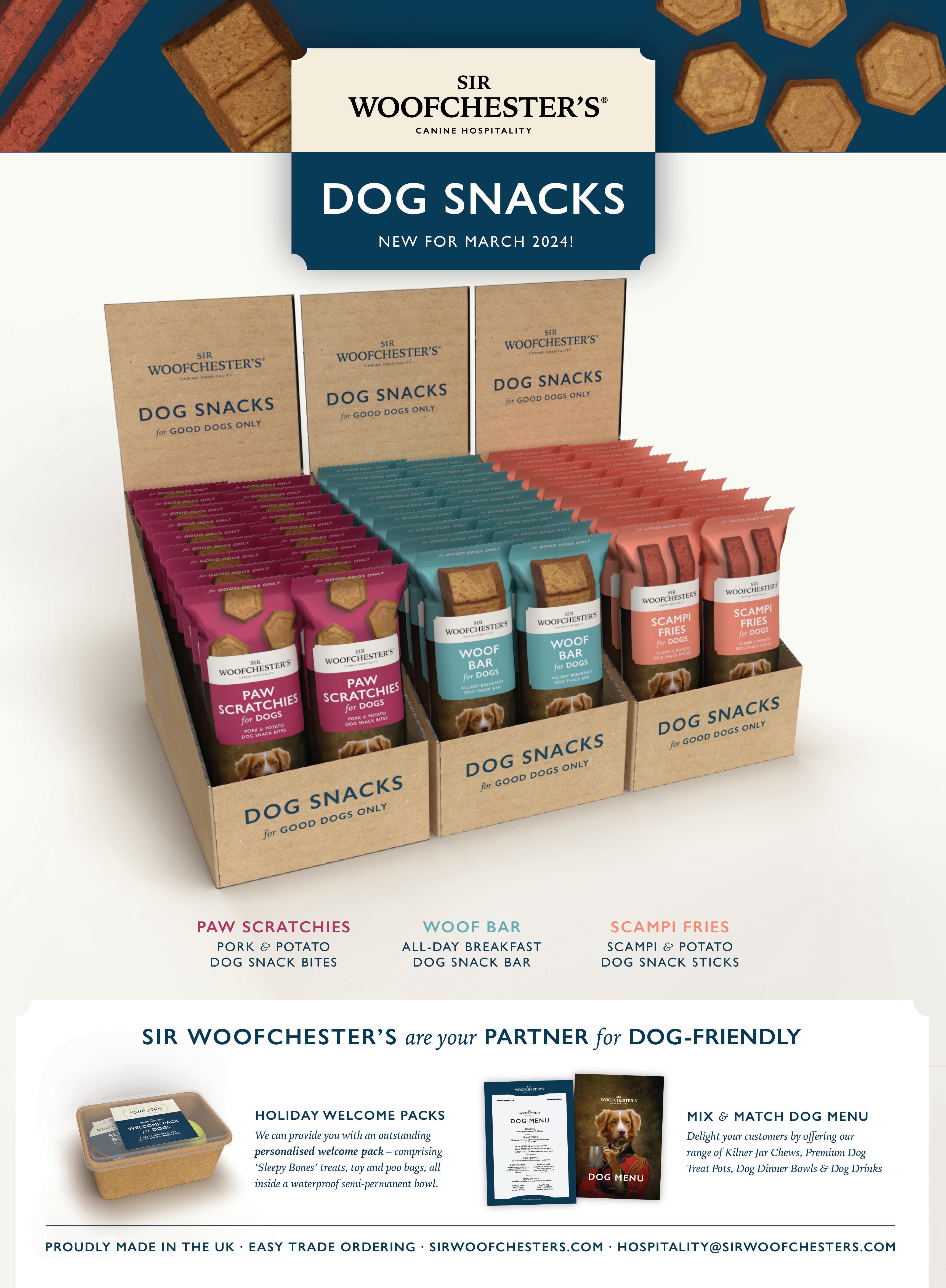
Isle of Man pub company Okell’s Inns has announced the launch of “Okell’s Independent,” a new pub model will enable individuals to own and operate their own businesses within the Okell’s estate, and is introducing a rent turnover model, based on the turnover of the tenant’s business, as opposed to the standard commercial rent payment due to the landlord on a fixed monthly or annual basis.
The initiative forms part of a strategic restructuring of the company’s 29 pubs into three categories: Independent, Heritage and Classic.
Executive Chairman of Heron & Brearley Group, Mark Crowther, says : “We’re bringing a proven UK model to the Isle of Man that empowers entrepreneurs to put their own stamp on their pub.
“This is different from franchising – it’s about genuine partnership where we provide the funding, building, supply chain, and marketing support, while our partners bring the creativity and community knowledge that makes great pubs special.”

Under the new model, Okell’s acts as an investor partner, providing financial support by covering stock, assets, and most overheads, while partners establish their own operating businesses and receive a percentage
of the site’s turnover rather than a traditional salary.
Managing Director of Okell’s Inns, Steven Taylor, explains: “We’re looking for rising chefs, experienced hospitality managers, or anyone with the passion and creativity to run a successful pub.
“The model removes traditional financial barriers – there’s no rent to pay, partners have full autonomy over their business plans, and we share in the success together.”
The turnover rent model has proven successful for major UK pub chains over recent decades and is designed to reinvigorate pub estates by empowering on-site management teams to operate with greater entrepreneurial spirit.
“Pubs are people,” adds Mr. Crowther. “So our managed model can’t always be 29 different things and be at our best all the time.
These partnerships will bring autonomy, flair, and creativity to pubs that need that individual touch – whether they’re rural venues or nighttime establishments that require special knowledge of what the local community wants.”
The Craft Guild of Chefs has once again spotlighted the UK’s most promising culinary talent, as ten young chefs have successfully passed the prestigious Graduate Awards following an intense final exam held at the University of West London.
The results were revealed in style at a celebratory event hosted at Fortnum & Mason on Monday 15th September, where industry leaders, mentors, and supporters gathered to honour the chefs who reached the required standard in either the Kitchen or Pastry Graduate Award. THIS YEAR’S KITCHEN GRADUATE AWARD WAS ACHIEVED BY:
• Dylan Evans, Henrock by Simon Rogan
• Inez Roggema, Trivet
• Kai-le Tran, Royal Air Force Club
• Oliver Porter, House of Commons
• Matthew Crane, Royal Air Force Club
• Ross Boyd, Amuse
The Highest Achiever in the Kitchen category was Inez Roggema, while the Mentor Award was presented to Elliot Plimmer from the Royal Air Force Club, recognising his outstanding support and guidance throughout the process.
IN THE PASTRY CATEGORY, THE FOLLOWING CHEFS ACHIEVED THE AWARD:
• Alina Szymanska, Harrods

• Andy Reid, The Glasshouse by Seasons
• Cameron McCrossan, Mar Hall
• Christi Myburgh, Mandarin Oriental Hyde Park
Christi Myburgh was named Highest Achiever in Pastry, with the Mentor Award going to Emmanuel Bonneau from the Mandarin Oriental Hyde Park.
Founder and organiser Steve Munkley, Vice President of the Craft Guild of Chefs said: “The Graduate Awards continue to be a benchmark for excellence amongst young chefs. What stood out this year was the sheer determination and professionalism shown by every final-
ist. Most of our Kitchen Achievers this year have entered previously and just missed out, so they’ve come back having learnt from the experience and on a mission to achieve it.
These ambitious chefs are the future of our industry, and it’s a privilege to support their journey.”
Ben Murphy, Chair of Kitchen Examiners, reflected on the collaboration amongst finalists: “This year’s group showed incredible teamwork and maturity. The Graduate Awards aren’t about competing against each other; it’s about personal growth, making new connections and learning at every stage.
It was inspiring to see how the mentor experience helped build confidence and camaraderie among the chefs. I’ve absolutely loved my time as Chair of Examiners and supporting young talent at such an important time in their career.”
Returning as Chair of Pastry Examiners, Sarah Frankland, executive pastry chef at Pennyhill Park, added: “It was clear that every finalist had grown immensely through the process and there was a really calm and positive atmosphere in the kitchen.
“For me, the Graduate Awards is about that attention to detail and really delving deep into the brief. We wanted to see simple, classic pastry skills executed brilliantly and this year’s Achievers really did that. For those who didn’t achieve the award, take on all the feedback, learn from it and if you can, come back even stronger next year.”
The Kitchen Graduates will be invited to compete in the semi-finals of the Young National Chef of the Year in 2026.
Saniflo is pleased to announce the launch of the brand new Clear Water range — a complete line-up of innovative pumps designed for the collection, distribution, and pressurisation of clean water. Building on over 70 years of expertise in wastewater management, Saniflo’s Clear Water range now offers robust, sustainable solutions for clear water applications, including jet pumps, booster pumps, submersible pumps and underground lifting stations.
Whether it’s for rainwater collection, garden irrigation, draining basements, or boosting water pressure in domestic systems, the Clear Water range has a highperformance product to suit every need.
Sanijet is a range of 5 stainless steel centrifugal surface pumps optimised by a Venturi (jet) system for increased suction up to 8m. Automated for on-demand and self-priming for a simple start, the pumps have a max head between 50 and 54m and max flow rate from 3.6m³ up to 5m³.

SaniMHP is a 10-strong range of multi-stage surface pumps ideal for irrigation, rainwater use and water supply. From the 4-40 through to the 9-50 PC4 model offering max head ranges from 40m to 52m and max flow from 4m³ to 8.7m³, there is a model that will tackle pretty much every clean water movement requirement. With 4 models in the range and max head capacities between 40 – 54m, the new Saniboost range is a domestic booster pump ideal for optimised and smooth water supply. Max flow from 3.6m³ to 5m³ ensures there is a model to increase and regulate the pressure of water collected in most sizes of domestic water tank and the units operate automatically and are particularly suited for low-flow consumption. A Saniboost includes a buffer tank that limits the frequent starts and stops of the pump to which reduces noise disturbances and wear on the product. Each model offers guaranteed service pressure on drip irrigation installations
or automatic flush mechanisms.
Sanisub is a family of submersible pumps designed for a variety of applications including flood recover, basement drainage, rainwater re-use and, in some cases, light commercial operations.
With flow rates between 9–15m³/hour and heads up to 11m, Sanisub models like the ZPK, 800 Rainkit, and Steel + Emergency Kit provide powerful, reliable water management for challenging environments.
The Sanifos range offers two pre-assembled lifting stations with 110L and 280L capacities for the management of grey or treated water. With four inlets, flow rates up to 14m³/hour and heads of 7-10m the robust Sanifos can be discretely installed underground to move water from buildings, garden rooms and multiple small units – such as pods.
From a sustainability perspective, the Clear Water range promotes responsible water reuse and offers ecoconscious solutions that support the full water cycle—from collection and storage to redistribution. By enabling the reuse of grey water and alternative water sources like rivers, pools, and rainwater, these pumps help reduce demand on treated mains supply.
The addition of the Clear Water means that Saniflo is now a one-stop-show for all water management requirements; offering complete solutions for both wastewater and clean water applications. Whether you need to flush, drain, or pump — above or below ground — Saniflo provides easy-to-install, reliable systems designed to perform automatically with minimal maintenance.
To learn more or download the Clear Water brochure please visit www.sfasaniflo.co.uk
British pubs and publicans have been at the heart of their local areas for centuries, meeting social needs and connecting communities, but new research has put a figure on just how much social value they bring.
Groundbreaking research from Pub is The Hub, the not-for-profit organisation that helps pubs to diversify and provide essential local services and activities, called ‘Pub is The Hub: Social Value’ has established that for every £1 spent investing in the provision of services and activities in the pub an average of £8.28 of social value is created.
It confirms that pubs offer social value that supports community cohesion, job security, well-being, increased social interaction and resilient communities. The report also reveals that pubs help people to overcome social isolation and replace the loss of services in rural and deprived areas.
Backed by The National Lottery Community Fund, the report measures the social value delivered by publicans and their pubs, through Pub is The Hub support, to help provide a range of vital services and activities in their local areas.
Calculating social value is an academic process that measures the added value an initiative brings to society and refers to the wider positive impact an activity, project or organisation has beyond just financial or economic returns.
The evaluation, which focuses on Pub is The Hub projects implemented between 2022 and 2024, analysed the impact of adding new services and activities. It examined how the introduction of amenities such as village stores, community cafes, and allotments, as well as events such as theatre and arts performances, help to reduce social isolation and

address community needs. The evaluation also highlighted the crucial role of the publican in these efforts.
It concluded that diversified pub-based initiatives will have lasting effects on the overall improved local well-being for individuals and their families as well as in reducing loneliness, improving mental health and giving people greater independence.
The evaluation also found that the social value created by pubs meets several of the UN’s Sustainable Development Goals. It aligned the Pub is The Hub projects with a broader impact including tackling issues such as poverty, inequality, good health and local wellbeing.
Pub is The Hub chief executive John Longden OBE said: “Publicans and their pubs have a vital social role in supporting local communities and helping people to overcome social isolation and alleviate feelings of lone-
liness. They have a significant social value that is beyond economic impact. They are crucial in helping to bring people together, and helping with the provision of lost services and amenities.”
He added: “There needs to be wider recognition of the important role that individual publicans and the vital role their pubs have in rural communities and deprived areas as social hubs. Pubs contribute to the general wellbeing of locals and help drive social cohesion and community resilience in local areas.”
Cornwall Rural Community Charity (CRCC), development and evaluation manager, Gemma Finnegan, who independently conducted the research, said:
“The report shows that Pub is The Hub’s success lies in its ability to leverage strategic relationships and its deep knowledge of both the industry and local communities to quickly drive meaningful social change.”
The Halfway in Tal-y-Coed, Wales, opened a village store and an event space in a marquee, with the support from Pub is The Hub.
Publican Rhiannon Metters said: “We are situated in an isolated rural community with the pub being the hub of the area. It is so important that we support local people ensuring they are not feeling isolated and alone.
“With the nearest supermarket being 20 mins away the village store here in this isolated rural area is such a support to people in the local community.
The marquee has become a space where we run local courses such as CPR and craft workshops to help bring people together.”
Approximately 10,000 pubs and breweries across Britain are participating in this year’s Cask Ale Week, which continues until 28 September, offering licensees significant opportunities to drive footfall and showcase traditional cask-conditioned ales.
The annual celebration, established in the early 2000s by cask ale accreditation body Cask Marque, has evolved into a decentralised nationwide event taking place across licensed premises throughout the UK. The organisation continues to oversee the initiative, which has become a key promotional period for the on-trade.
MAJOR PUB GROUPS LAUNCH
PROMOTIONAL CAMPAIGNS
Several leading pub operators have introduced compelling offers designed to attract customers during the celebration period: Arkell’s managed estate is running weekday afternoon promotions with £3 pint pricing between 3pm-4pm, targeting the traditionally quieter mid-afternoon trading period. Fuller’s properties are leveraging their customer database to drive group visits, offering complimentary pints to friends of existing customers.
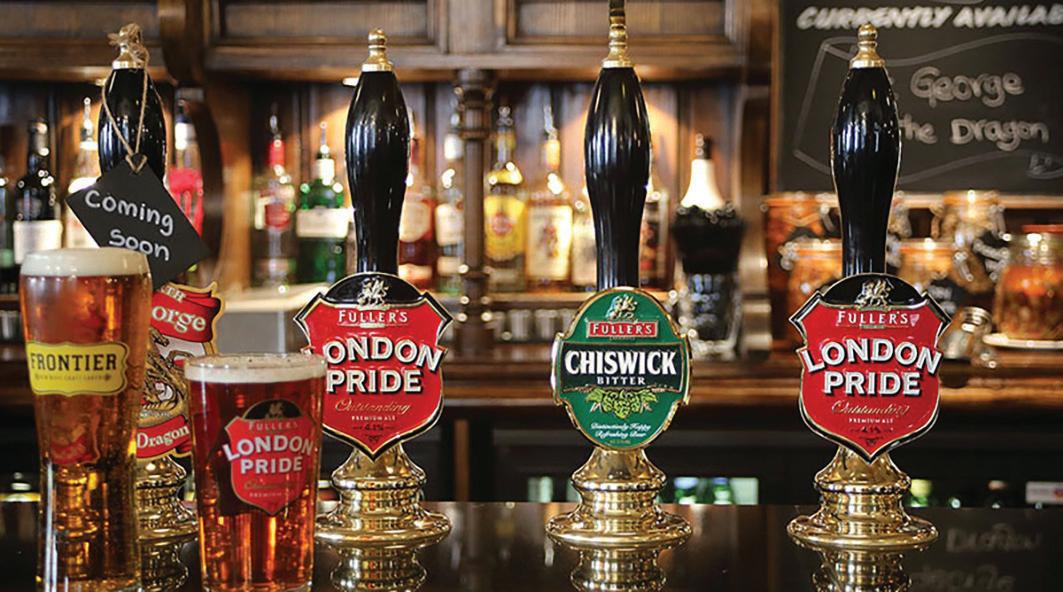
Ember Inns has activated its Cask Ale Club loyalty programme with £3.50 pricing on Mondays and Thursdays, while Craft Union Pubs is operating a “buy five, get one free” promotion. Nicholson’s 80-strong estate has implemented a Cask Card scheme offering every fifth pint free.
The Nicholson’s operation has also introduced a charitable element, with 5p from every pint of their house pale ale – produced by St Austell Brewery – being donated to homelessness charity Social Bite throughout September.
The week features coordinated activities designed to build cask ale appreciation among new consumers.
Participating venues are collectively offering approximately one million complimentary tasting samples, allowing customers to sample products before purchasing full measures.
A pub quiz format focusing on brewing knowledge has been deployed across hundreds of participating venues, capitalising on the educational aspect of the campaign while driving dwell time and additional sales opportunities.
Cask Marque’s Caskfinder mobile application, which has recorded 1.4 million downloads and averages 40,000 monthly uses, serves as the primary consumer-facing tool for locating participating venues. The platform supports a limited edition merchandise campaign, with customers earning branded t-shirts for visiting 12 listed establishments during the promotional period.
Last year’s campaign distributed nearly 400 promotional t-shirts through this mechanism, demonstrating strong consumer engagement with the digital platform.
The campaign emphasises cask ale’s unique position as an exclusively on-trade product, positioning participation as a direct method of supporting local licensed premises. This messaging aligns with broader industry initiatives to reinforce the pub’s role in British drinking culture.
The 10-day promotional window extends the traditional week format, providing operators with an extended period to implement promotional strategies and maximise the campaign’s commercial impact.
Cask Ale Week runs until 28 September. Licensed operators can find participation details and promotional materials through Cask Marque’s website https://caskaleweek.co.uk/
UKHospitality has launched a new, easy-to-use online tool for hospitality teams to write to their MP, urging Government action to support the sector at the Budget.
This initiative is part of the trade body’s ongoing #TaxedOut campaign, which highlights the damaging impact
cerns directly with policymakers, and back UKHospitality’s calls for the Government to lower business rates fix NICs, and cut VAT.
Kate Nicholls, Chair of UKHospitality, said: "We know how passionately people who work in hospitality feel
about the sector, so this new tool allows them to join the campaign, too.
“There are millions of people that have built a career in this sector and, critically, rely on it for employment and supporting their families. It’s so important that they can make their voice heard.
“I urge everyone involved in hospitality to share this tool with their teams and encourage them to write to their MPs.
“By uniting our voices, we can send a clear message to the Government that the hospitality sector is being taxed out and needs urgent support in the forthcoming Budget."
Hospitality teams can access and distribute the new tool within their businesses via this link Hospitality businesses can write to their MP here.

When it comes to food and drink pairing, the most important thing to remember is that the pairing has got to work.
This sounds simple and logical, right? But, according to Ben Cotts from Lanchester Wines (www.lanchesterwines.co.uk), more and more venues are turning to AI to create their wine lists and sometimes skipping this vital final checkpoint.
“AI’s benefits lie in helping us to save time in research, but you will have in-house experts, such as your chef or sommelier, to advise on food and wine pairings. Or, work closely with your wine supplier who will help tailor a wine list based on your specific venue and customer base.
“AI food pairings tend to be generic, often leaning heavily on classic suggestions or sticking with so-called “super varietals”. That’s because AI relies on public content, so if more pairing articles online feature, say, French wine, that’s what AI will serve up. But that doesn’t always reflect your menu or your customer base.
“There’s also the risk of homogenisation. If every bar is getting the same AI-driven wine recommendations, you lose the individuality that sets your venue apart.
“A good wine supplier will take the time to understand your business, then help build a list that’s commercially savvy and customer-friendly. A great wine merchant will also help you develop a proper wine strategy aligning your list with your food, your service style and even your wider brand. They'll support with seasonal updates, staff training and upsell opportunities tailored to your venue.
ALFRESCO MOMENTS AND THE WINES THAT WORK
With many operators making the most of pub gardens and terrace dining, your wine list needs to work just as hard outside as it does indoors. The shift to lighter food in warmer months should be reflected in your wine offer, whether you’re serving seafood salads or small plates from a sharing board.
Crisp whites like Sauvignon Blanc and Pinot Grigio remain summer staples for good reason. They're refreshing, approachable and offer a clean palate between bites, ideal for lunchtime and early evening sipping.
Albariño, continues to grow in popularity; it’s zingy, zesty and built for dishes like grilled prawns, citrusdressed salads and salt-baked fish.
For rosé drinkers Pinot Grigio Blush remains a crowd-pleaser, especially in pub gardens. Its fruit-forward style, gentle sweetness and eye-catching colour make it an easy upsell. For a drier alternative, Provence-style rosé delivers elegance with savoury food pairings like grilled vegetables or herby chicken.
And don’t overlook lighter reds. Beaujolais and Pinot Noir, when served lightly chilled, are excellent companions to grilled meats, charcuterie or cheese boards. These styles offer fruit without heaviness, perfect for latesummer alfresco menus.
Wine should never be an afterthought. With a little care and attention and the right advice, it can become a powerful tool in your business strategy. Keep it fresh, stay open to trends and above all, trust your taste buds. But, never forget the most important rule of any wine and food pairing: always taste it first.
As guests return from summer travels, they often crave the Mediterranean flavours they've enjoyed abroad. With warmer days often stretching into September and beyond, now’s a great time to bring a little sunshine to your menu. Here are three fresh pairing ideas:
• Gloria Godello with Grilled Tuna Salad
Godello from north-west Spain (a great alternative to Albariño) is fresh and citrusy with subtle minerality and a soft, rounded texture. Its acidity cuts through rich grilled tuna, while the wine’s weight complements the fish’s meatiness.
• Vallegre Colheita Branco with Light Chicken Dishes
This crisp Portuguese blend offers citrus and stone fruit notes. It brings brightness to simple chicken dishes and pairs well with lemon or herb accents, making it a smart, food-friendly house pour.
• Archivio Pecorino with Cacio e Pepe or Burrata Pecorino is lively, floral and slightly savoury. Its acidity balances creamy pasta or burrata, while its saline edge complements the saltiness of the Pecorino cheese and enhances black pepper, olive oil and herbs.

A determined team of over 35 Master Innholders and hospitality industry partners has raised more than £135,000 during this year’s Twin Cities Master Innholders Charity Cycle Ride.
The group, made up of both seasoned cyclists and enthusiastic novices, completed a challenging 370-kilometre journey over three days, finishing in Kent on Sunday 14th September. The ride began at Taittinger’s cellars in Reims, France, and wound its way north through Cambrai and Sainte-Omer, before crossing the Channel and being warmly welcomed by Domaine Evremond on home soil. Now in its tenth year of support, Taittinger and Hatch Mansfield once again played a pivotal role in the event’s success. Fittingly, the ride was bookended by Taittinger hospitality and followed a route inspired by Jean Taittinger, who, during his tenure as Mayor of Reims, twinned the city with Canterbury, just a stone’s throw from Taittinger’s English vineyard in Chilham.
for
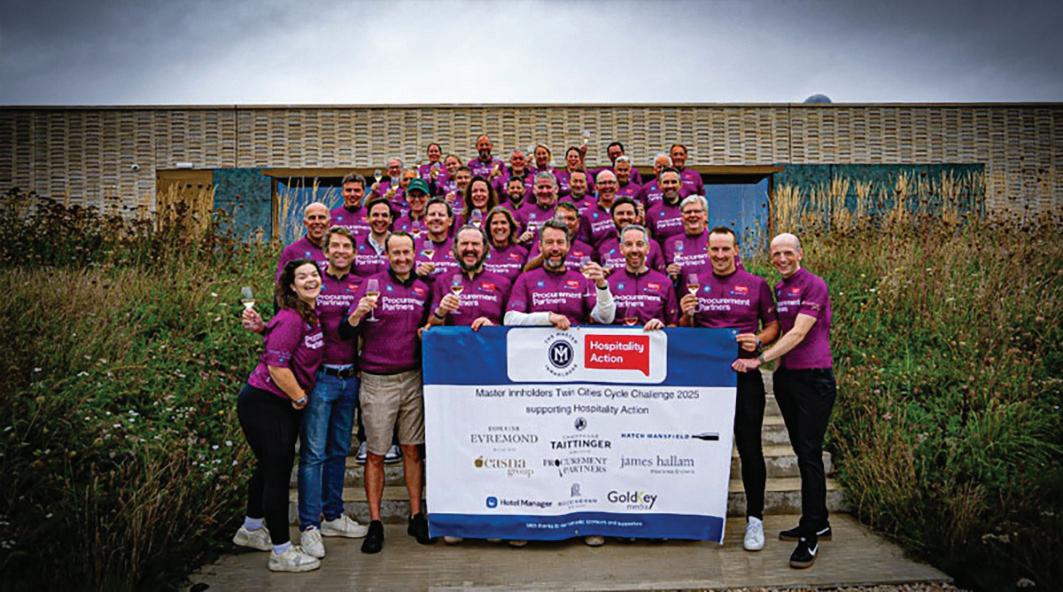
Additional key sponsors included Procurement Partners, who supplied the team’s branded cycling jerseys, Casna Group, and James Hallam, with further support from Gold Key Media, Rockingham Partners, and Hotel Manager.
All funds raised will be donated to Hospitality Action, helping to provide vital support to current and former hospitality professionals across the UK.
Andrew Stembridge MI IS, lead organiser and past Chair of the Master Innholders, commented: “I’m
immensely proud of what we’ve achieved as a collective. This is the most we’ve ever raised through the cycle ride, at a time when Hospitality Action is facing unprecedented demand. The continued support from Taittinger and Hatch Mansfield is invaluable and makes this event not only unique, but truly special.”
Other participants from the Master Innholders community included Joanne Taylor-Stagg MI, General Manager at Pennyhill Park, Stuart Bowery MI, General Manager at JW Marriott Grosvenor House London and Grant Campbell MI IS, General Manager at Nobu Hotel London Portman Square — among many others.
Speaking on the cycle ride and the money raised, Grant Campbell MI IS said: “These charity cycle rides are always a blend of challenge, camaraderie, and above all, generosity. I’m incredibly proud of our team for going the extra mile — both literally and figuratively — to raise even more for Hospitality Action this year.
Huge thanks to our sponsors, industry partners, and everyone who donated to make this the most successful Master Innholders charity ride to date.
The team of cyclists was also presented with a cheque for the £135,000 raised upon completion of the ride on the final day, which was given by Mark Lewis, Chief Executive of Hospitality Action.
Sharing his appreciation, Mark Lewis said: “Our recent Taking the Temperature survey revealed that threequarters of respondents have experienced poor mental health in adulthood, with nearly a third affected in the past year alone.
isn’t just a
From
cooked food is growing, whatever the season. And, with that comes the perfect opportunity to champion bold, premium red wines that can stand up to the grill.
The rich, smoky character of barbecued food calls for wines with depth, fruit and structure, something premium reds deliver in spades. These are wines that cut through char, complement marinades and elevate grilled meat, vegetables and even spiced dishes.
Enter Barossa Valley Wine Company and its knockout red range. The GSM blend -Grenache, Shiraz and Mourvèdre - is full-bodied and fruit-forward, packed with ripe dark berries and a hint of spice. It’s built for food, especially the kind you cook over flames. The blend offers generous fruit and softness from Grenache, structure from Mourvèdre and boldness from Shiraz; a win-
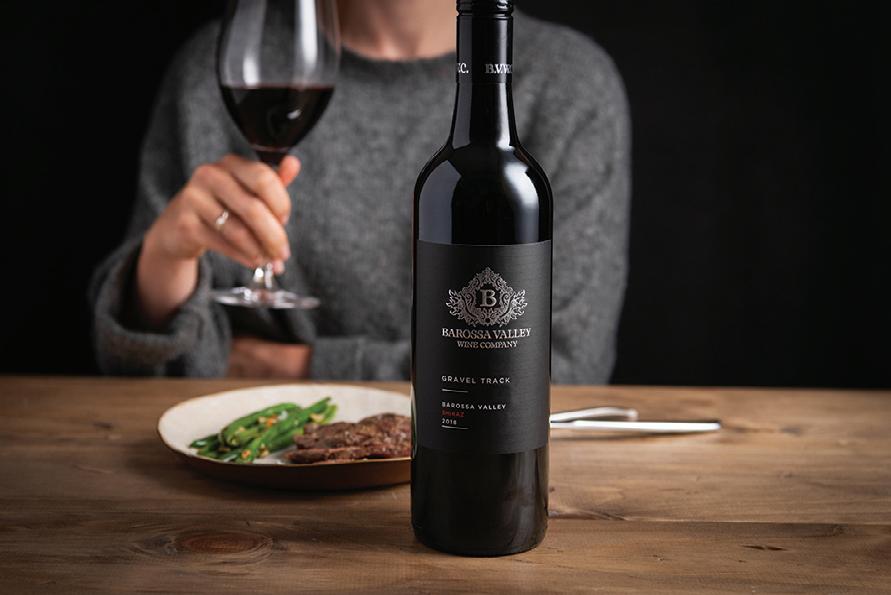
ning combination for smoky beef ribs, sticky lamb chops or grilled aubergine. Alongside the GSM, the Barossa Shiraz brings power and richness, while the Cabernet Sauvignon offers elegance and grip, both ideal for more robust grilled dishes or cheese-laden burgers. These aren’t wines for background sipping, they’re wines that take centre stage, bringing a sense of occasion to every serve. For venues, offering premium reds with barbecue dishes is an easy way to premiumise the menu. Whether it’s pairing suggestions, confident upsells or a focus on wine theatre (think big glasses and bold pours), red wine and barbecue are a natural combination with real trade appeal – no matter the weather. So, don’t wait for the sunshine, bring bold reds to the barbecue now and give your customers a reason to
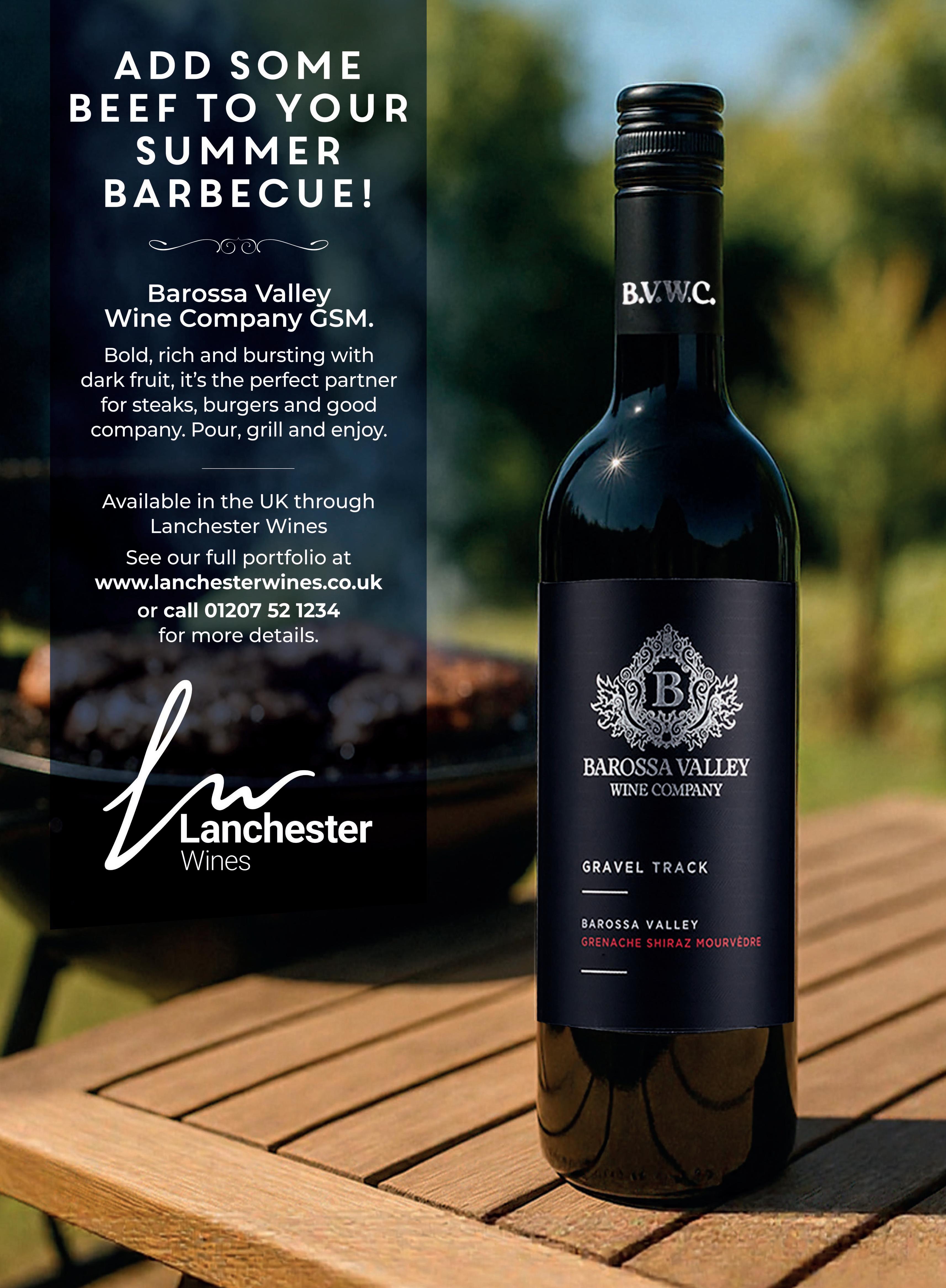
Hospitality charity Hospitality Action has unveiled its latest Step-by-Step guide focusing on Activating Wellbeing in Hospitality.
Created in partnership with its annual fundraising initiative, Walk for Wellbeing, the guide – the third in the series – highlights the importance of tackling the wellbeing challenges faced by hospitality workers and has been designed to help businesses and individuals across the industry take practical steps to support employee mental health and wellbeing.
Hospitality Action’s latest Taking the Temperature survey found that while 78% of employees feel more comfortable talking about mental health than they did five years ago, issues such as understaffing, excessive workloads and poor life balance continue to have a negative impact across the industry.
The guide points to effective solutions such as Hospitality Action’s Employee Assistance Programme, which offers 24/7 confidential support, financial guidance and counselling services to anyone working in the sector. It also encourages employers to put movement and connection at the heart of workplace wellbeing.

From team walks and informal gatherings that strengthen relationships, to simple initiatives that promote balance and openness, the guide shows how small, practical steps can make a big difference. Walk for Wellbeing is a perfect example of how movement and connection can be built into team culture, creating space to support both individual and collective wellbeing.
Mark Lewis, Chief Executive at Hospitality Action, commented: “Hospitality is one of the UK’s most exciting and rewarding industries, but it’s also very demanding. Our new Step-by-Step Guide is designed to move the conversation on from awareness to action. It offers practical, achievable ideas that can help leaders and teams improve their physical health, strengthen connections and create a workplace culture where wellbeing is a priority.”
DOWNLOAD THE GUIDE & SIGN UP
The Step-by-Step Guide is now available to download and offers an essential resource for hospitality businesses of all sizes.
To register for Walk for Wellbeing, please visit www.walkforwellbeing.org.

An historic North Berwick pub that has been closed since summer 2019 reopens this week following an £850,000 refurbishment by Heineken-owned Star Pubs and Scottish hospitality operators, The Discovery Group, who also operate the nearby and much-loved Ship Inn on Quality Street.
The overhaul of The County Hotel on the High Street has transformed it into a top-quality family and dog friendly venue with two separate bars, a restaurant, 11 ensuite letting rooms and one of the largest beer gardens in town. Marking its new direction, the venue has been renamed The Law after the well-known North Berwick Hill. The local link follows through in the décor, which has a subtle nod to North Berwick and the surrounding area running through it.
The Law opens its doors at 9am on 17th September, creating 25 new jobs and with North Berwick resident Donna McCallum at the helm as the new licensee. A weekend of entertainment will celebrate the occasion followed by a host of other activities leading up to the festive season.
The revamp has completely remodelled the building to a high standard, replacing everything from the lights to the loos. Outside there’s a 100-seater garden.
The ground floor boasts a comfortable contemporary front bar as well as a second bar – The Beach Hut – overlooking the rear garden and with its own pizza oven.
Converted from a former stable, it retains the old doors, beams and stone walls as part of its distinctive design. The two floors above house a beautifully-decorated restaurant – bookable for functions – and 11 letting rooms, each named after a Scottish malt whisky.
Says The Law’s new general manager Donna McCallum: “I’ve lived in North Berwick for years and never dreamed one day I would run The Law. It’s great news for the town to have it open again and looking so fantastic – it’s a real asset. The whole team is excited to be welcoming people in for the first time in six years.”
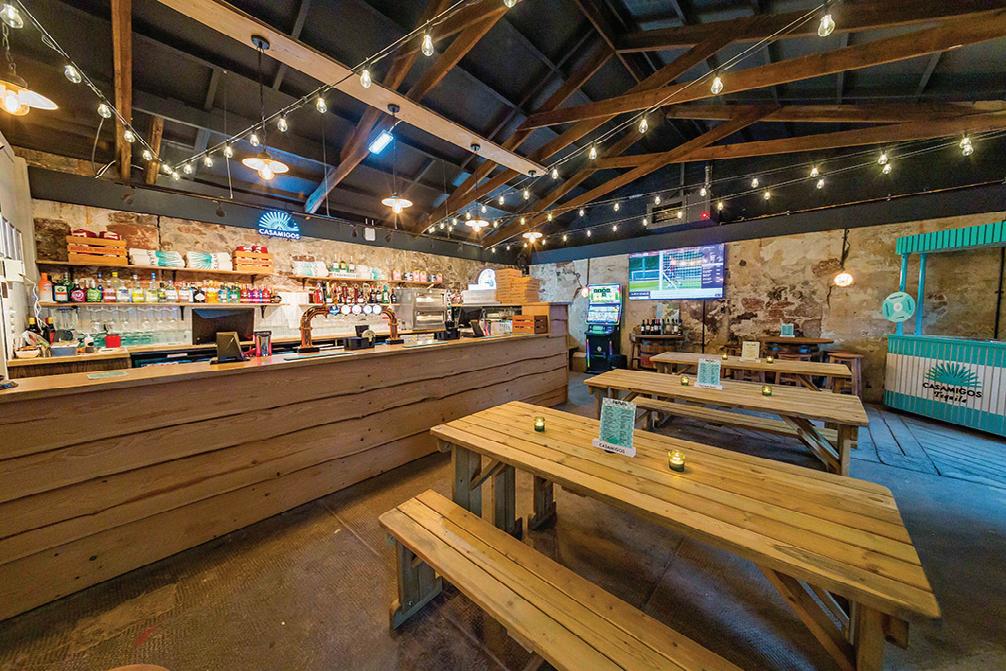
Adds Discovery Group director Steven Winton: “The Law looks sensational, better than we ever dared hope. The local interest has been phenomenal, with people keen to have a peek at the changes. We have even been getting booking enquiries for Christmas. We’re very appreciative of all the support. North Berwick is a wonderful place that is sought out by visitors to Scotland from all over the world. We feel fortunate to have a second site here and want The Law to add to all the town has to offer.”
Comments Matt Dyson, Star Pubs’ operations director for Scotland: “This is our largest investment of the year in Scotland, and it’s reflected in the transformation – The Law looks amazing and completely unrecognisable inside. The Discovery Group are just the team to relaunch The Law – they’ve got a reputation for operating superb venues across East Scotland. We’re delighted to be backing them with their latest venture. The many unique touches they’ve given The Law, will bring something different to North Berwick.”
Pub chain Wetherspoon’s will implement a temporary 7.5% price reduction across all food and drink items this Thursday in a bold demonstration of what permanent VAT reform could mean for the hospitality sector. The nationwide promotion, timed for what the company terms “Tax Equality Day”, seeks to illustrate the competitive disadvantages facing licensed premises due to current VAT disparities between on-trade establishments and retail outlets.
The initiative draws attention to the significant VAT differences affecting the industry. While pubs, bars and restaurants face 20% VAT on all food and beverage sales, supermarkets benefit from zero-rated VAT on food products. Industry leaders argue this creates an uneven playing field that enables retail chains to cross-subsidise alcohol sales using savings from food VAT exemptions.
Tim Martin, Wetherspoon’s founder and chairman, emphasised the long-term pressures facing the pub sector. He highlighted how the current tax structure creates fundamental competitive disadvantages for hospitality businesses, particularly when competing against supermarket alcohol pricing.
The pandemic period saw temporary relief for the sector, with hospitality VAT reduced to 5% in July 2020, before rising to 12.5% between October 2021 and March 2022, ultimately returning to the full 20% rate.
The campaign has garnered backing from three major trade bodies: UKHospitality, the British Beer and Pub
Association, and the Campaign for Real Ale (CAMRA).
UKHospitality chair Kate Nicholls OBE, said: “A reduced rate of hospitality VAT across the UK means lower prices and more jobs, leading to the regeneration of our high streets and communities.”
The broader context reveals ongoing pressures facing the pub industry. Wetherspoon’s current estate comprises 794 establishments, representing a decline from 955 locations in 2015, despite opening three new sites in the past year while disposing of nine others.
This trend reflects wider industry challenges, with approximately 5,000 pubs closing across the UK since 2016, highlighting the structural pressures facing traditional licensed premises.
The campaign directly appeals to the Chancellor for policy intervention, advocating for a permanent VAT reduction to 12.5% for hospitality businesses. Proponents argue such reform would create more equitable competition between on-trade and off-trade sectors while supporting job creation and business investment. The one-day demonstration aims to provide customers with tangible evidence of how VAT reform could impact pricing across the hospitality sector, while building momentum for longer-term policy discussions around tax equality in the licensed trade.
The UK foodservice sector saw a significant resurgence of inflationary pressures in June 2025, the latest CGA Prestige Foodservice Price Index reveals.
The report, published by Prestige Purchasing with CGA by NIQ, shows inflation in nine of the Index’s ten categories, while the same number recorded month-on-month inflation following mounting pressure across global supply chains.
The Oils & Fats category of the Index has been hit particularly hard, with prices rising 6.7% over the last year and by 1.6% in July alone. Palm, soy and sunflower oil prices all surged due to strong demand and tightening supplies.
Another area of significant concern is Coffee, Tea & Cocoa, where prices have soared 9.2% year-on-year. This is primarily a result of tight global availability of Robusta coffee beans, following drought in Vietnam and ongoing volatility in the cocoa market.

Meanwhile, Meat & Poultry prices rose 4.0% year-on-year, with poultry consumption outpacing production and turkey supplies for the festive season already at typical Christmas price levels. However, the Vegetables category bucked the general trend with a slight year-on-year reduction of 1.2% due to an expanded European
potato crop, although other items like leafy greens are still facing upward pressure.
The Fish category recorded a monthly price dip, despite severe supply pressures on core whitefish species like cod and haddock, with the latter’s prices having doubled compared to last year.
Shaun Allen, CEO of Prestige Purchasing, commented on the findings: “The industry is navigating a persistent inflationary climate, with a mix of factors including climatic events, geopolitical issues, and challenges in labour and logistics all contributing to cost pressures.
Businesses that remain agile and proactively review their sourcing strategies will be best positioned to mitigate the impact of this volatility and ensure long-term supply chain resilience.”
Reuben Pullan, senior insight consultant at CGA by NIQ, said: “There has been little respite in inflation for hospitality businesses in 2025, and all figures point to yet more cost rises through to the crucial end-of-year trading period. Global and local supply and demand issues are putting major stress on prices, and businesses will have to work very hard to mitigate rises. They face the tough challenge of providing consumers with good value for money without compromising quality.”
Stonegate Group has instructed Savills to market 23 free-of-tie public houses as investment opportunities, marking the latest phase in the company’s ongoing estate transformation programme.
The portfolio comprises individual properties and smaller packages distributed across England, all operating under long-term lease arrangements with annual rent reviews tied to the Retail Price Index.
Notable among the offerings is The Dartmouth Arms in Forest Hill, south-east London, which operates as a MEATliquor franchise location. Industry sources indicate the ownership change will not disrupt the venue’s current trading arrangements.
The disposal forms part of Stonegate’s comprehensive estate optimisation strategy, which has seen significant changes to its 4,300-strong portfolio over recent years. The company has utilised market data and local insights to inform conversion decisions across its managed estate.
Recent milestones include the successful conversion of 200 managed venues to Leased and Tenanted operations, alongside expansion of its Craft Union pub model. This restructuring has reduced Stonegate’s directly managed estate from 800 properties to approximately 550 sites since Chief Executive David McDowall assumed leadership.
According to company figures, the transformation strategy has generated average profit improvements of £110,000 per converted venue.
Commenting on the ongoing programme, McDowall emphasised the focus on long-term sustainability rather than traditional branding approaches.
“Our transformation centres on positioning every pub for sustained success,” the CEO explained. “We’re observing that customers increasingly value personalised service and local expertise over corporate

brand recognition. Through partnerships with entrepreneurial operators, we’re developing venues that demonstrate greater resilience and community connection.”
The strategic shift reflects broader industry trends toward localised operations and independent-style management, while maintaining the operational support and buying power of a major pub company.
THE PROPERTIES ARE ALL LET ON LONG LEASES WITH ANNUAL RETAIL PRICE INDEX LINKED RENT REVIEWS AND INCLUDE: Admiral Macbride, Plymouth Coventry Arms, Corfe Mullen
Crown & Anchor, Bromley Crown & Stirrup, Lyndhurst Dartmouth Arms, Forest Hill Dog & Duck, Walthamstow Fagins, Brookthorpe Feathers, Chalfont St Giles Frankland Arms, Washington Garden Bar, Hove Golden Ball, York Harbour Moon, West Looe Letters Inn, Tattenhall Malthouse, Timsbury Milehouse, Cross Heath Moorings, Loughborough Pax Inn, Thorp Arch Romantica, Sutton Coldfield Salthouse Hotel, Clevedon Seven Stars, Canterbury Star, Hampton Hill Wickham Arms, Brockley Windmill, Peterborough
The number of takeover deals targeting UK restaurant groups has increased 88% in the past year according to analysis by leading South East law firm TWM Solicitors. The sector saw 30 deals in 2024/25, up from 16 in 2023/24.
TWM Solicitors says that a combination of lower interest rates, improving investor confidence, and falling commercial rents has created a favourable environment for mergers and acquisitions in the restaurant sector. The Bank of England lowered the base interest rate to 4% in August 2025.
TWM added that the surge in M&A activity comes despite challenges to the sector such as the recent rise in employer National Insurance Contributions (NICs).
David Powell, Partner and Head of the Corporate and Commercial team at TWM Solicitors, comments: “The near doubling of takeover deals is a strong vote of confidence in the UK restaurant sector. We’re seeing a wave of consolidation, particularly at the lower end of the market, as buyers move quickly to acquire competitively priced businesses.”

David Powell adds that “Falling commercial rents in traditionally expensive
such as central London
have made acquisitions of restaurants more attractive to buyers. Another factor is that declining equipment
costs, which peaked during the pandemic, have made acquisitions more attractive.
Many restaurant groups also undertook comprehensive post-Covid restructuring, including closing loss-making sites and streamlining menus, which has left them leaner and more profitable.
This is reflected in improved financial performance across the sector. Recent research shows that profits for the UK’s top 100 restaurant groups increased 18% to £365m in 2024/25, up from £308m the previous year**. Turnover also rose 19% to £12.9bn, compared with £10.8bn in 2023/24.
David Powell adds: “Many of these restaurant groups are high quality businesses with healthy margins. Buyers are spotting opportunities to acquire potentially undervalued businesses that can be scaled with the right investment.”
“With footfall steadily improving post-pandemic, brick-and-mortar restaurants are once again seen as attractive investments.”
“For some buyers, consolidation also brings the operational benefits of spreading payroll and overheads across a larger portfolio.”

British pubs and publicans have been at the heart of their local areas for centuries, meeting social needs and connecting communities, but new research has put a figure on just how much social value they bring.
Groundbreaking research from Pub is The Hub, the not-for-profit organisation that helps pubs to diversify and provide essential local services and activities, called ‘Pub is The Hub: Social Value’ has established that for every £1 spent investing in the provision of services and activities in the pub an average of £8.28 of social value is created. It confirms that pubs offer social value that supports community cohesion, job security, well-being, increased social interaction and resilient communities. The report also reveals that pubs help people to overcome social isolation and replace the loss of services in rural and deprived areas.
SERVING UP SOCIAL VALUE
Backed by The National Lottery Community Fund, the report measures the social value delivered by publicans and their pubs, through Pub is The Hub support, to help provide a range of vital services and activities in their local areas.
Calculating social value is an academic process that measures the added value an initiative brings to society and refers to the wider positive impact an activity, project or organisation has beyond just financial or economic returns.
The evaluation, which focuses on Pub is The Hub projects implemented between 2022 and 2024, analysed the impact of adding new services and activities. It examined how the introduction of amenities such as village stores, community cafes, and allotments, as well as events such as theatre and arts performances, help to reduce social isolation and address community needs. The evaluation also highlighted the crucial role of the publican in these efforts.
It concluded that diversified pub-based initiatives will have lasting effects on the overall improved local wellbeing for individuals and their families as well as in reducing loneliness, improving mental health and giving
people greater independence.
The evaluation also found that the social value created by pubs meets several of the UN’s Sustainable Development Goals. It aligned the Pub is The Hub projects with a broader impact including tackling issues such as poverty, inequality, good health and local wellbeing.
Pub is The Hub chief executive John Longden OBE said: “Publicans and their pubs have a vital social role in supporting local communities and helping people to overcome social isolation and alleviate feelings of loneliness. They have a significant social value that is beyond economic impact. They are crucial in helping to bring people together, and helping with the provision of lost services and amenities.”

He added: “There needs to be wider recognition of the important role that individual publicans and the vital role their pubs have in rural communities and deprived areas as social hubs. Pubs contribute to the general wellbeing of locals and help drive social cohesion and community resilience in local areas.”
Cornwall Rural Community Charity (CRCC), development and evaluation manager, Gemma Finnegan, who independently conducted the research, said: “The report shows that Pub is The Hub’s success lies in its ability to leverage strategic relationships and its deep knowledge of both the industry and local communities to quickly drive meaningful social change.”
The Halfway in Tal-y-Coed, Wales, opened a village store and an event space in a marquee, with the support from Pub is The Hub.
Publican Rhiannon Metters said: “We are situated in an isolated rural community with the pub being the hub of the area. It is so important that we support local people ensuring they are not feeling isolated and alone.
“With the nearest supermarket being 20 mins away the village store here in this isolated rural area is such a support to people in the local community. The marquee has become a space where we run local courses such as CPR and craft workshops to help bring people together.”
Evolving food labelling regulations have played a crucial role in improving food safety standards over the years, and have undoubtedly saved lives. Almost four years ago, Natasha's Law was introduced, revolutionising the way food allergens are labelled on Pre-packaged for Direct Sale (PPDS) foods. This vital legislation empowers the two million allergy sufferers in the UK to make informed choices about the food they consume.
“Labelling is essential for allergen management, and it’s at the heart of staying compliant with Natasha’s Law. It’s pushed businesses to think differently about their labelling processes. But there’s still more to be done. A 2023 study by Erudus1 showed that 54% of PPDS labels failed to meet the required standards, with messy, handwritten labels being a major issue.
“Clear, accurate labelling isn’t just about compliance – it’s about building trust with customers and ensuring their safety too. The good news is that technology is playing a key role in helping hospitality businesses to improve their labelling processes. Label printers, for instance, have become an invaluable tool for creating clear, durable, and compliant labels. Unlike handwritten labels, printed versions are smudge-proof and easy to
By Simon Brennan, Senior end user client manager for specialist print solutions, Brother UK

read, helping businesses avoid common pitfalls.
Brother's labelling solutions for PPDS foods allow food outlets and providers to produce high-resolution and legible labels with all essential information. The option to create a standalone solution, whether with an integrated keyboard or by connecting a tablet, makes compliance much quicker and easier. These solutions help businesses meet regulations, streamline the labelling process, and give customers more confidence in their choices.
As food labelling requirements continue to evolve to ensure the safety and accuracy of food products, businesses need to adopt reliable and user-friendly technology that can produce accurate, legible, and cost-effective labels. This will not only keep customers safe but also safeguard business operations. Visit www.brother.co.uk/food-labelling to discover our full range of food labelling solutions.
LeeSan announce five new (larger) additions of in-line Carbon Vent Filters to their highly successful and well proven Microvent Range.
The new, larger, in-line filters work well in situations where outdoor septic smells occur, these products eliminate and absorb offensive odours delivering freshly filtered air where it matters most - patios, gardens, parking areas or where they might affect neighbours or customers.
These filters are ideal where the septic gas odour (hydrogen sulphide or "sewer gas") is coming out of the plumbing vent pipes on the roof. They can also be fitted onto vents that are directly connected to septic tanks or holding tanks.
For many years now the MicroVent 11/2-inch filter has been the go-to option for odour eliminating tank venting. However, over the past few years, there has been an increasing demand for a similar product in larger sizes. In response to this, Leesan have introduced new 2-inch, 3-inch and 4-inch versions.

They utilise activated charcoal to ensure that unpleasant odours from sewage tanks are swiftly neutralised. The carbon is made of high standard Taixia anthracite, processed through grinding, mixture, extrusion, carbonisation and steam activation etc. Due to the high mechanical hardness, highly developed porous structure and
huge specific surface area, it can be widely used in both gas-phase and fluid-phase purification and absorption, catalyst carriers.
The carbon granules are easily replaced. Frequency for this will depend on several factors. The main two being the amount of use that a toilet/tank has and the ambient temperature. Typically, this needs to be done yearly.
Details of the “Air Throughput” are:
ODOR2 - 2" In-line Charcoal Filter 9m3/hr
ODOR3 - 3" In-line Charcoal Filter 15m3/hr
ODOR3SV - 3" In-line Stack
ODOR4 - 4"
ODOR4SV
These units must be installed in-line vertically.
LeeSan’s Technical Director Karl Sutcliffe comments “These products offer a simple and effective solution to fix odours from sewage tanks. Providing they are fitted correctly and the carbon replaced when appropriate they are the perfect answer to this (otherwise rather nasty) problem. The new range can now cope with much larger airflows and will certainly fill a hole in the marketplace”.

The shift from daytime bustle to evening calm has long been a challenge for venues seeking to attract business after dark. Many owners worry about empty tables as the sun sets, wondering what could entice locals to leave their cosy homes. Attracting evening guests involves more than excellent illumination and last orders. Interesting entertainment keeps folks coming back. Is your plan solid? A good plan is more important than ever. Ignore this realm and expect dwindling numbers. Embrace new ideas, and you will see an increase in foot traffic as night approaches.
Smart venues host nights inspired by trends like casino online experiences. Picture poker tournaments at real tables, blackjack with play chips (no licences required), or even digital roulette projected on big screens. Punters seek excitement without the risk of losing their fortunes, and this type of event perfectly satisfies their desire. Why does it work? It gets people talking, competing, and buying one more round while they weigh up their next move. Social media buzzes when winners flaunt their mock trophies or share their amusing losses online. Game nights like these turn a slow Wednesday into a memorable outing, no dicey regulations necessary.

about craft rather than just cashing a cheque for background noise duty.
People eat dinner everywhere; few places make eating itself an event worth sharing on social media later on. Enter hands-on tasting sessions—a whisky flight led by someone who tells stories along with pouring measures, or buildyour-own pizza contests judged by local personalities rather than anonymous staffers hiding in kitchens out back. Giving guests control over the evening can lead to a surge in attendance, surpassing those who simply offer a plate of chips and a pint of lager without any flair.
Instead of focusing on innovation, theme implementation can make or break them. Instead of just hanging “Hawaiian” bunting and serving sweet punch, build spaces so convincing that guests won’t question their location for five minutes. Imagine tiki torches blazing indoors (safely!), actors dressed as islanders welcoming each arrival with garlands or mysterious accents that are hard to identify. Enthusiasm breeds contagious energy; regulars return simply to see what spectacle arrives next month.
Some will claim live music is predictable—hardly innovative at all—but that’s missing the point entirely. Imagine acoustic duos performing stripped-back pop songs or local jazz collectives that captivate with their energetic brass sections. Guests want something authentic: raw vocals bouncing off brick walls or an unplugged guitar battle between rivals from two towns over. Word spreads fast when performers actually care
Venues seeking to fill seats after sunset can play it safe—or push beyond tired formulas to genuine spectacles and connection-building moments instead. Refusing to innovate means surrendering a custom to competitors who are less cautious about trying something new every week or month. The evidence is plain: evenings become busier and atmospheres livelier wherever clever ideas are allowed space to thrive regularly rather than occasionally dusted off during quiet seasons only. In hospitality today, fortune still favours the bold, and risk-averse owners rarely come out ahead when doors close at night.
In hospitality, every square foot needs to earn its keep. From breakfast service to weddings, from DJ nights to brand launches—modern venues must flex fast. And if your AV can’t keep up, you’re leaving money on the table. That’s where Audiotek comes in.
We design and install AV systems that shift with your schedule. Lighting and audio that move from mellow


Sunfly is undoubtedly the best-known name in Karaoke, having been formed in 1991. However, technology has come a long way since the 90s.
Sunfly now have over 20000 HD Karaoke videos designed specifically for large screens. All songs have been digitally remastered for consistent audio quality. There are specially curated playlists and international content on all systems.
Sunfly now have a large range of online and offline systems. The most popular in the pub and restaurant market is the Sunfly Showcase Touchscreen System which features an intuitive interface and robust touchscreen designed for frequent use. Available for sale and on
lease for just £100 + VAT per month for two years (then £25 per month).
We also have tablet-based systems such as the EVOBOX Club which is available for only £60 + VAT subscription per month, minimum one year.
In addition, we have partnered with SingPods who have a fantastic range of professional systems as well as their famous self-contained pods.
If you have an under-performing function room, you may be surprised to hear how easy and affordable it is to convert part or all of the room to a Private Karaoke room.
Customers can then book online and enjoy 2 or 3 hour timed sessions; bookings are managed with intuitive room management software. Contact us for a free consultancy or for a full build quote. ROI possible within 3 months.
All systems are fully licensed and legal, sales are reported to PRS every quarter. We also provide great 24/7 IT support.
Visit our website today @ sunflysolutions.com to view our other products such as the Satellite Laptop and Wireless Microphones systems as well as apps and subscription packages. See the on page 9 for details.

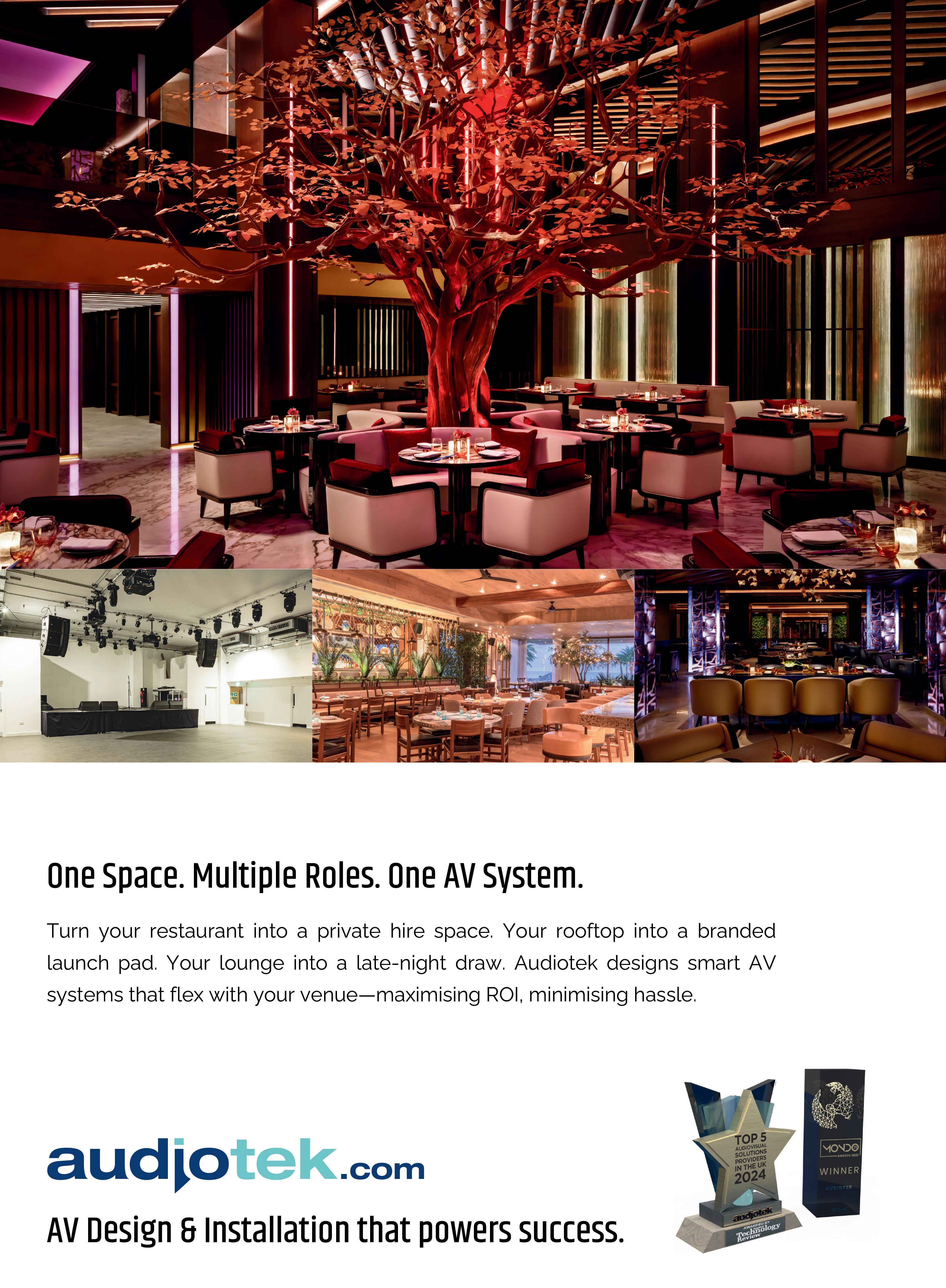
Packaged snacks remain an integral part of the pub experience according to a recent report from CGA by NIQ.
Nearly 8 in 10 pub-goers buy packaged snacks (food not from the kitchen), with 1 in 5 of these consumers doing so during every or most visits. Crucially, almost two thirds will make in-venue snacking decisions. A further 1 in 5 know the type of snack they want before visiting, but not the brand. This signposts an enhanced opportunity for success by increasing visibility at the point of sale and projecting the right message to connect with the snacking audience.
The data suggests pub snacking remains steady even amid uncertain economic conditions, with around half of consumers stating they don’t expect their buying behaviour to change over the next 12–18 months. This level of consumer confidence reinforces the reliability of the snacking out-of-home revenue stream.
Interestingly, Gen Z are particularly engaged with pub snacking. Their approval signals optimism, given this demographic already represents 25% of the global population and is forecast to become the wealthiest gener-
ation. Their openness to trying different flavours and formats sets them apart from other age groups. For all these reasons, brands with an understanding of Gen Z’s motivations and behaviours are well-placed to secure both short- and long-term wins.
Affluent snackers, defined as those earning £50k+ annually, spend an average of £68 more per month in the out-of-home market than their non-affluent counterparts, making them a crucial demographic to understand and target marketing efforts towards.
So, what are today’s pub-goers nibbling?
Crisps, nuts, and pork scratchings dominate the pub-snacking repertoire. All the same, there’s space to diversify beyond these traditional options and flavours, particularly for younger and more adventurous audiences. But there’s a curveball to work around- the biggest barrier to purchase isn’t price… many consumers just don’t think about snacks when ordering drinks.
This insight alone is actionable for suppliers and operators alike, suggesting a focus on promotions, alignment with big trends (for example
health and wellness), and product visibility can shift habits and encourage more spontaneous purchases.
The implications for suppliers are clear. A deeper understanding of consumer expectations, preferences, and spending behaviours can support the development of more compelling sales stories for wholesalers, enable better menu planning for operators, and ultimately help brands and venues grow business together.
Andrew Hodgson, CGA by NIQ’s Client Business Partner –Foodservice commented: “Pubs are a key part of UK culture, and snacks are a key part of the pub experience. We have found that the opportunities for success aren’t just in understanding what people eat, but knowing when and why they buy, as well as why they won’t. This gives suppliers and operators the tools to make smarter decisions about range, promotion, and placement. At the end of the day, understanding these behavioural drivers can support and promote connection with consumers and shape snacking habits before they’re fully formed.”
Read the full report at https://tinyurl.com/38a5mn7j
Snack Brands, based in South Yorkshire have been supplying the licensed trade with pub snacks for over 30 years.
The former publicans boast a unique offering, with their own brand of pork snacks. Uncle Alberts Porkshire Pig come in three sizes of packaged scratchings alongside crackling and crunch options.
They also stock a large range of hand picked quality bar snacks from other brands.
The biggest winner though is that they deliver your order straight to your pub, restaurant or bar.
Alex Morrisey, one half of the father son duo behind the business explains.
‘Our advantage is we are a family business who have had first hand experience of the pub trade, this is why we are constantly asking ourselves, how do we make life easier for landlords and ladies?’
Their brand new website has given them the scope to offer a new service with customers filling in their
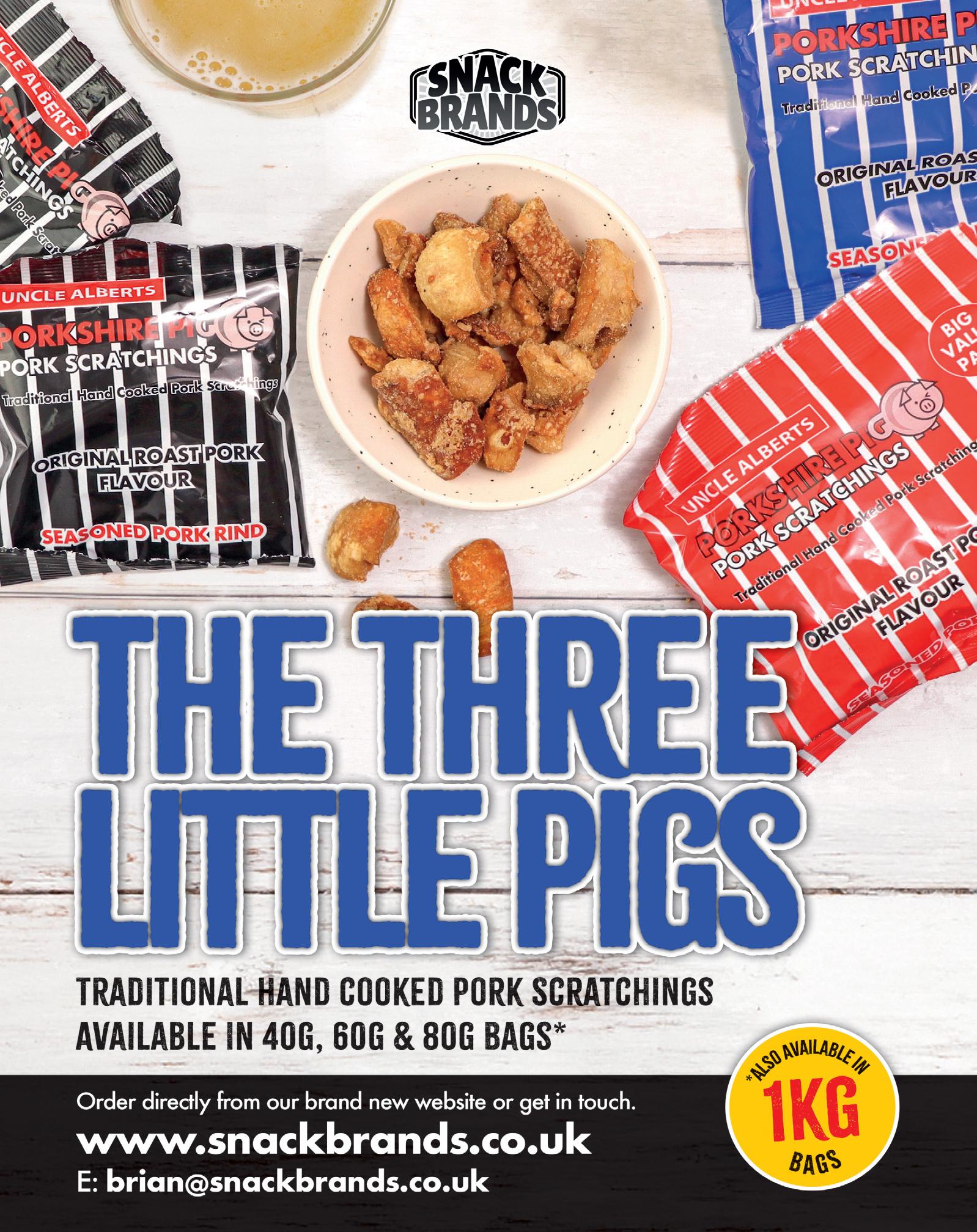
details to set up a retail account, giving them access to exclusive trade prices.
‘It is about removing barriers, No more trips to wholesalers, a quick call, email or a few clicks and your order is on the way.’
‘The delivery model allows us to reach venues across the country, we have customers in Southampton, up in Scotland and even on the Isle of White’.
‘We are really confident in our pork snack range, we think they are the best in the business and the word is definitely spreading’
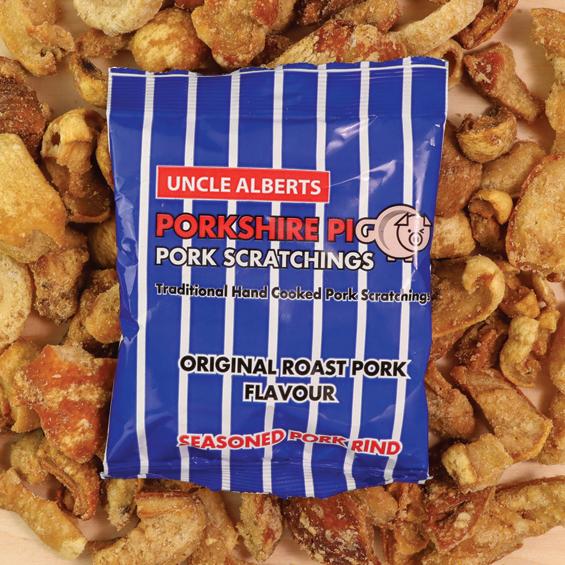
You can access The Snack Brands offering by going to www.snackbrands.co.uk or get in touch at brian@snackbrands.co.uk See the advert on the inside front cover for further details.
DON’T MISS OUT ON REAL HAND COOKED CRISPS’ MASSIVE TRADE EXCLUSIVE COMPETITION… WIN YOUR SHARE OF £25,000 WORTH OF FREE STOCK!
REAL, the foodservice focussed premium hand cooked crisps with bags of character, is running its biggest ever competition, giving away over £25,000 worth of free stock.

Every month from May to September, five lucky winners will each receive £1,000 worth of REAL Hand Cooked Crisps stock. That's five chances every month for five months to win a share of this incredible prize!
Mark Dyer, Tayto Food Service National Account Controller shares, “We’re REAL-ly excited about our biggest ever trade exclusive on-case promotion. With over 20 years of supporting the food service channel, this MASSIVE stock giveaway - alongside our ongoing partnership with the Springboard Charity - underlines our commitment to this vital sector.”
Entering is easy - purchase any case of REAL Hand Cooked Crisps from your delivered wholesaler or C&C and visit realcrisps.com/win
Upload your receipt and be entered into the monthly draw.
With a draw every month you have even more opportunities to win if you buy REAL regularly!
REAL is a Great Taste Producer with a range of 9 ‘in your face’ flavours that are all gluten free, vegetarian and with no added MSG.
With five chances to win every month, there's never been a better time to get your hands on some of best-selling flavours!
This is a REAL-ly big prize that you don't want to miss!
Tayto Group is the largest family-owned, Britishmade snack company, with a stable of well-known British brands:
• Great Taste Award winning pork scratchings
- Midland Snacks, the ultimate and traditional pub snack
• Golden Wonder fully-flavoured crisps – the iconic favourites
• Animal Adventures - the fun, gluten-free, vegan, family-friendly snack
• Marmite Crisps – your customers will LOVE these moreish crisps
With the perfect product for everyone, Tayto has food service snacking sorted…


By Gary Lintott, CEO of ecosync (https://ecosync.energy), an Oxford University spin-out

Energy costs remain one of the most pressing challenges facing hospitality. Compared with winter 2021/22, average hotel energy bills are still around 43% higher. At the same time, regulatory deadlines are looming, with UK hotels expected to meet EPC “C” by 2027 and “B” by 2030 under Minimum Energy Efficiency Standards (MEES). And unlike many other sectors, hospitality faces a unique non-negotiable: guest comfort.
The result is a difficult balancing act. Operators must protect margins in the face of rising bills, satisfy investors and corporate clients who are increasingly asking for ESG reporting, and meet guest expectations for sustainability; with 76% of travellers saying they want to travel more sustainably, and 43% willing to pay extra to do so.
But new data suggests that hotels may actually be leading the way in solving this equation.
A recent cross-sector analysis of building energy use, carried out by ecosync, revealed that hospitality assets achieved the highest average heating energy savings of any sector – 44%. That figure outpaces schools, universities, and even public sector estates, many of which are under intense pressure to cut waste.
These gains aren’t coming from major HVAC overhauls or retrofits that require lengthy closures. Instead, they reflect a quieter shift towards smart retrofits, allowing hoteliers to target energy waste in the background, without impacting guest experience.
For example, one UK hotel group using room-by-room controls reported savings of more than 43% on its energy bills. This prevented the heating of empty guestrooms, while ensuring occupied rooms were kept at a comfortable temperature.
The common thread is data-driven, low-disruption, smart retrofits. Rather than mass renovations, hotels are layering new technology onto existing heating systems. Room-by-room controls are preventing energy waste in empty spaces, while occupancy sensors and AI adjust heating in real time. Machine learning then refines settings continuously, analysing temperature, flow rates, and usage patterns to deliver significant savings. Together, these solutions integrate seamlessly with existing assets, enabling hotels to avoid invasive construction work and operational downtime.
For facilities managers (FMs) and hotel operators, the operational and financial advantages are compelling. Cutting heating waste by more than 40% offers financial protection from consistently volatile energy prices. Guest comfort is actually enhanced, as smart systems ensure that occupied rooms are heated properly while avoiding complaints about cold or overheated spaces. There’s also a clear reputational and commercial benefit: with corporate travel buyers, investors, and sustain-
ability-conscious guests all paying close attention to sustainability performance, hotels that demonstrate measurable progress are at an advantage.
Modern hotel operators are under increasing pressure to prove their sustainability claims. Intelligent heating platforms provide automated, auditable data for Scope 1, 2, and 3 carbon reporting, internal performance dashboards, and external stakeholder communications. By integrating with existing ESG frameworks, these platforms support compliance and create a transparent story of progress toward net-zero goals.Finally, from a purely financial perspective, these smart upgrades usually offer much faster payback periods than deep retrofits - often within just a few years - making them one of the most pragmatic investment choices available to hoteliers.
The regulatory picture makes this shift even more urgent. Non-compliance with EPC requirements risks not only fines, but also reputational damage and asset devaluation. In the long run, properties that cannot meet energy standards may even become unlettable.
The road to decarbonisation includes a transition to low-carbon and electric heating systems. But this can be expensive, so retrofit projects with existing wet radiator systems should also be explored. Hotels that deploy AI-driven optimisation today gain a scalable platform that integrates seamlessly with future technologies; protecting their investment and accelerating their sustainability journey.
Smart retrofits provide a bridge solution: they deliver immediate, measurable savings while positioning hotels for deeper decarbonisation strategies in the future, such as electrification or low-carbon heat networks. For owners and operators, this short-term ROI and long-term resilience makes a strong case for action.
What’s striking is that hotels are managing to achieve some of the most significant savings in real estate, despite being among the most challenging building types to decarbonise. Continuous use, guest expectations, and diverse spaces from restaurants to spas all add layers of complexity.
Hotels managing to cut heating waste by almost half shows that smart, data-led retrofits are more than a stopgap. They represent a pragmatic pathway for other sectors too; education estates, heritage properties, and public sector buildings can all draw lessons from what hospitality is achieving.
Hotels don't need to wait for large-scale capital projects to start saving money and carbon. By adopting a smart heating optimisation layer, operators can drive immediate, measurable savings, operational simplicity, enhanced ESG credentials and future-ready infrastructure. In a competitive market where operational efficiency and sustainability are key differentiators, AI-powered heating optimisation is quickly moving from a "nice to have" to "essential".
For FMs and hospitality leaders, the message is clear: cutting carbon does not have to mean cutting comfort. With the right technology, it’s possible to reduce energy waste dramatically, safeguard guest experience, and stay ahead of compliance deadlines, all without any disruption.
As the colder months approach, the question is not whether hotels can strike this balance, but how quickly others follow their lead.

How Zennio’s KNX-based integration is redefining efficiency, guest comfort, and sustainability in hospitality.
In hospitality, every percentage point counts. Energy alone accounts for 3–6% of a hotel’s running costs — yet waste remains rife. The solution isn’t guesswork, it’s insight. The path to leaner, greener hotels starts with data, and ends with intelligent control.
That’s where Zennio comes in.
By integrating the hotel’s PMS with a KNX-based Guest Room Management System (GRMS), every element — HVAC, lighting, access, and entertainment — can work in sync. If a guest hasn’t checked in, the AC won’t run. If housekeeping sees a live “Make Up Room” signal, they head straight where they’re needed. If maintenance spots early-warning alerts, breakdowns are prevented before they cost revenue or refunds.
The KNX standard’s open interoperability means hotels aren’t locked into one vendor — they choose the devices that fit their needs today, knowing they can expand tomorrow. This flexibility, paired with Zennio’s global experience and local support, ensures systems grow with the property, not against it. For guests, it’s seamless comfort — personalised lighting, temperature and services at their fingertips or via voice. For operators, it’s operational clarity, cost savings, and a measurable cut in environmental impact.
From luxury suites to common areas, front-of-house to back-ofhouse, Zennio’s technology delivers actionable insight and precise control. The result? Rooms that adapt in real-time, staff deployed with purpose, and assets maintained proactively.
In an era where sustainability sells and efficiency drives profit, intelligent integration is no longer a luxury — it’s the baseline. The hotels that thrive will be those who see technology not as an add-on, but as the engine of their operation.
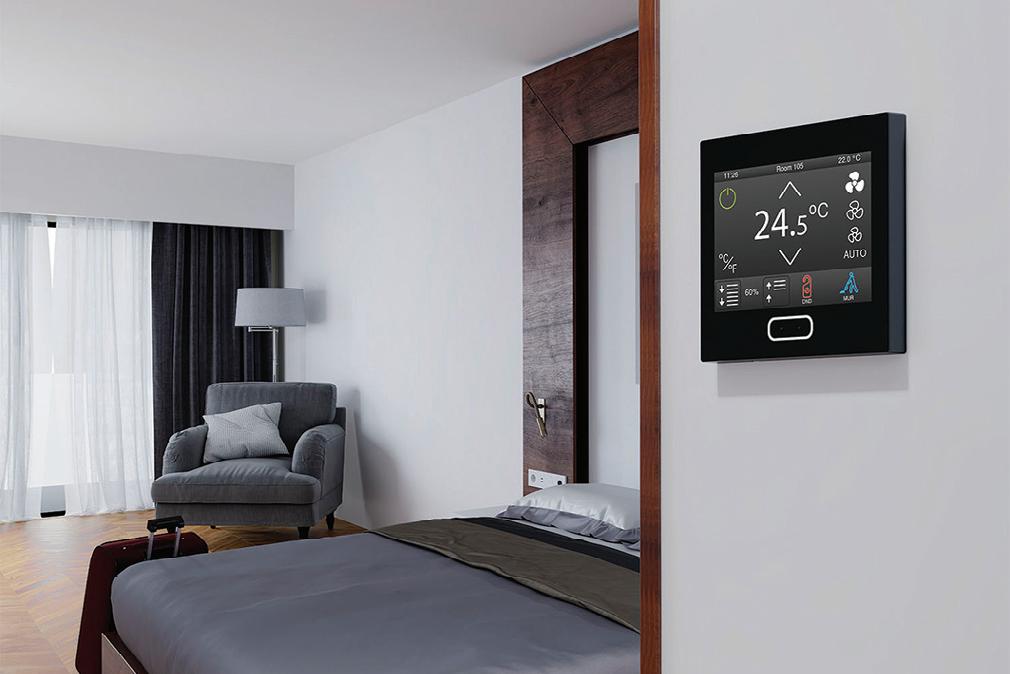
Zennio already powers that future in over 100 countries. The question is: will your hotel be next?
Zennio was founded in 2004 with a vision to make the world “smarter” by providing innovative solutions to the control automation industry, what is many times referred to as smart buildings. Along the path it became more and more evident many hotels were missing the benefits of those solutions and Zennio committed itself to provide them
www.zennio.co.uk


From round-the-clock operations to vast supply chains, the path to sustainability for hotels and restaurants can seem daunting. Yet, as consumer awareness grows and the spectre of mounting costs looms, the imperative to go green is no longer a choice, but a strategic necessity.
David Woon, head of net zero engineering and operations at leading net zero engineering consultancy Ennovus Solutions (http://ennovus.co.uk), discusses the challenges for the hospitality industry and how it can embark on a greener pathway. One of the biggest hurdles for hospitality businesses embarking on a sustainability journey is the misconception that it's "net zero or nothing." The reality, however, is that taking incremental steps, though seemingly small, can collectively lead to significant impact.
Hospitality’s energy hunger is undeniable. Heating and hot water alone is estimated to account for a staggering 60% of direct energy use in hotels, and these are predominantly reliant on gas – a fossil fuel that is inherently at odds with green aspirations. Unlike the nine-to-five rhythm of an office, hotels operate 24/7, and restaurants extend their hours well beyond a typical workday, meaning utilities are constantly engaged. This inherent demand makes energy efficiency a paramount concern.
Adding to the complexity is the diverse nature of the industry itself. A boutique hotel in central London with its historic charm faces vastly different challenges than a sprawling rural resort. The age of a building, its architectural style, branding and even the variety of guest experience all play a significant role in determining viable sustainability solutions. For example, an efficient radiator with a high surface area would work best for a heat pump, but may well clash with a traditional, period aesthetic, making it hard for businesses to prioritise the right choice.
Beyond direct energy consumption, the "hidden" costs lie within the supply chain, known as Scope 3 emissions. These can account for a staggering 70% of a business's total carbon footprint. Everything from the sourcing of food ingredients to the materials used in interior design, and even the individually wrapped chocolates on a pillow, contribute to this vast network of indirect emissions. While there's currently no mandatory legislation in the UK to report on Scope 3, proactively tackling this area is a powerful step towards true sustainability and a significant differentiator.
For operators daunted by the initial investment, there are numerous impactful choices that don't require significant upfront capital.
Simple yet effective measures include switching from traditional halogen light fittings to smart LEDs. This can slash electricity bills by up to 60%, a surprisingly underutilised opportunity for many. Similarly, retrofitting outdated manual heating systems to smart thermostatic radiator valves (TRVs) offers a shortcut to reduce gas consumption. By making these upgrades and then integrating automated systems, controls and sensors can be used to reduce waste heat and light during quieter hours.
Other quick-win options are more culturally-based initiatives. In bars, restaurants and hotels, particularly those with larger premises or multiple floors, it is a good idea to be strategic with the space. Filling certain zones with guests in a set order can reduce the need to heat or cool an entire floor or building. Similarly, empowering employees to understand and participate in sustainability efforts cannot be underestimated. From simply turning lights off to more mindful waste management, every employee has the opportunity to make a real difference.
From here, the focus shifts to medium and long-term strategies. The ultimate goal is to move away from fossil fuels, particularly gas, and electrify as much as possible. For properties with sufficient space, on-site renewable energy generation – such as solar panels or wind turbines powering air source heat pumps (ASHPs) for heating and cooling – represents the pinnacle of sustainable operation. When on-site generation isn't feasible, exploring corporate Power Purchase Agreements (PPAs) or
People have eaten from leaves for thousands of years - in Asia and Africa, it’s still common. TAPARI is reintroducing this concept to the West as an ancient solution to a modern waste problem. 72% of consumers reported buying more eco-friendly products than five years ago. Today's customers are actively seeking out brands that share their values, especially when it comes to health and wellbeing. TAPARI products are a unique, natural choice that your customers will immediately notice.
Just made from stitched leaves, with no glues or chemicals - our dishes have a beautiful, organic texture that makes food look and feel special. When your guests see you’ve made a conscious choice, it shows them you care - about your business and about the planet.
In today’s competitive market, customers are looking for more than great food - they want a memorable experience. Traditional plastic and paper disposables can make your hard work look uninspired, leaving a poor final impression. This is the challenge TAPARI solves. We offer a sim-
ple, powerful way to upgrade your food service, ensuring every detail reflects the quality and care you put into your business.
You might wonder - “how will my customers perceive these very natural products?” - With more than a million meals served on TAPARI in the UK already, we believe that the response has been overwhelmingly positive so far!
From weddings to beer gardens - you can use TAPARI in a wide variety of settings and you always get more than a great-looking dish. You get to offer a truly guilt-free experience. Our disposables compost naturally, so you and your customers can enjoy your meal without worrying about waste. It's a simple change that makes a powerful statement. Serve with style, serve with purpose, serve with TAPARI. Get in touch with us to sample our products today!
Visit: www.tapari.co.uk - Email: info@tapari.co.uk - Call: 03301 339 369
See the advert on page 13 for more information.
purchasing Renewable Energy Guarantees of Origin (REGOs) certificates offer a fallback pathway to green energy sourcing.
Waste management, particularly food waste, remains a significant challenge in hospitality kitchens. Effective strategies must encompass both kitchen practices and customer engagement, but apps like Too Good to Go are making it easier than ever for businesses to bake the redistribution of food waste into long-term operations. Furthermore, businesses need to address single-use plastics in amenities like soaps and toiletries, exploring bulk dispensers and other sustainable alternatives that don't compromise the guest's perception of luxury.
Water consumption is another substantial area for improvement, with cleaning processes like laundry and daily towel/bedding changes accounting for a significant portion of both water and energy use. Challenging guest expectations around daily changes, coupled with the implementation of AI-driven water monitoring systems, can lead to substantial reductions.
The foundation of any successful sustainability programme lies in monitoring. Without a clear baseline of energy consumption, efforts are more likely to become random. Technology plays a pivotal role here, with virtual energy management systems capable of identifying seasonal patterns and highlighting high-emission areas within a portfolio. This data-driven approach allows businesses to prioritise interventions, ensuring the most impactful changes are made first.
The future of hospitality is undeniably green. But with growing public pressure, coupled with continuous advancements in sustainable technologies, investing in eco-friendly practices is no longer an optional extra but a core business decision. The final piece of advice for any hospitality operator committed to this journey is to embrace a holistic, strategic approach. It's not about one quick fix, but a well-thought-out plan that integrates various solutions for the most efficient and cost-effective path to a more sustainable future. By taking action today, the hospitality sector can not only reduce its carbon footprint but also set a powerful example, influencing guests and fostering a wider culture of environmental responsibility.

REDUCE ENERGY
Omnium, an experienced energy consultancy, partners with businesses across the country to transform complex energy challenges into clear-cut, sustainable solutions, resulting in all important financial savings.
Many businesses can feel overwhelmed by rising energy costs, complex contracts, inefficient systems, and evolving compliance mandates. Without specialist knowledge, savings and sustainability targets can at times feel hard to reach.
Omnium deploys a methodology which focuses on balancing profit and sustainability to guide clients from hidden inefficiencies to optimised, cost-effective energy use. Energy audits are initially carried out to benchmark current consumption and make way for the next phases of strategic energy purchasing and renewable integration.
All this service is delivered through data informed and impartial
are


Businesses could benefit by focusing on three non-negotiables: • Know Your Data – You can’t reduce what you can’t measure.
• Don’t Neglect Water – It’s often overlooked, yet can be ripe for savings.
• Use Efficiency to Futureproof – Energy efficiency isn’t just cost-saving—it’s a way of ensuring the longevity of your business.
• Ask Omnium
and
and reliable business for both their customers and their

We’ve all experienced it, a table that looks clean but feels unpleasantly sticky. In hospitality, that single moment can make or break a guest’s impression. Many assume sticky tables mean poor hygiene, prompting negative online reviews on platforms like Tripadvisor. These reviews can erode trust, impact bookings, and damage your brand’s reputation, all because of something that isn’t dirty at all.

The culprit? Quat build-up. Quats (quaternary ammonium compounds) are common disinfectants, but when used repeatedly without proper rinsing, they leave a residue that builds over time. This “invisible grime” creates the sticky sensation that guests misinterpret as uncleanliness.
The reality is, removing quat build-up is labour-intensive and costly. It requires deep cleaning, retraining staff, and often a full reset of cleaning protocols. In a busy hospitality setting, that’s time and money many don’t have.
One way to avoid this problem is by choosing a sanitiser with a non-quat-based formula. Always check the label for the active ingredient, for example, Sani Professional® Protect 360° biodegradable sanitising wipes contain a plant-based natural active that helps mitigate this issue, without leaving sticky residues behind.
With the right product, you can keep surfaces genuinely clean, and ensure your guests feel it too.
Request your FREE Protect 360° samples by writing an email to samples@sanipro-intl.com
Hygiene should be a top priority for all businesses, especially those that regularly host and feed the public. But in many cases, and particularly for larger hospitality settings, achieving good hygiene efficiently can seem like a struggle. Settings can have many washrooms, and multiple systems can be difficult to maintain. For restaurant owners, it may not be apparent that hygiene maintenance and stocking of hygiene products throughout the facility can often be as complex as food operations, and equally as important to maintain. Without the appropriate protocols in place, catering settings run the risk of reputational damage and fines. It is, therefore, crucial for operators to invest in the most up-to-date systems to maintain and attract customers and boost environmental credentials.
EFFICIENT HYGIENE, FOR BETTER
Clean front-of-house and washroom facilities should be a top priority to encourage repeat visits and maintain guest satisfaction. But in many cases, the number of washrooms in a facility can pose a challenge, so it’s no surprise 71% of cleaners wish their washrooms were easier to restock1
The key here is to reduce the refill frequency. By using solutions such as the Tork Xpress® Multifold Hand Towel System, caterers can free up staff time and improve the guest experience. In fact, the system means you can serve twice the number of guests before needing to refill.2
In a busy catering environment, staff often must perform various roles, such as taking orders, serving food and
In the hospitality world, first impressions are everything. Guests may not always notice a beautifully cleaned room—but they will notice a lingering smell.
That’s why an increasing number of hotels across the UK and Ireland are turning to the Smell Away® HEPA air purifier—a sleek, silent, and powerful solution designed to eliminate odours and improve air quality, one room at a time.

Originally trusted in residential care settings, Smell Away®’s new dual-action purifier is now making waves in hospitality, combining HEPA-grade allergen filtration with a premium activated carbon odour control system. The result? Cleaner, fresher air that guests immediately notice—without the heavy perfumes or noisy equipment.
The purifier’s HEPA filter captures 99.97% of airborne
drinks, and welcoming guests. As a result, cleaning can fall down the priority list for many as staff struggle to juggle tasks and instead, understandably, prioritise customer-facing requests. Ensuring your facility has the efficient cleaning systems in operation allows staff to target their cleaning efforts to areas that matter, freeing up time to do what they do best: provide a welcoming and warm environment to guests.
particles—like dust, pollen, and pet dander—while the Australian RC412 carbon layer absorbs VOCs, smoke, and persistent smells from cooking, bathrooms, or prior guests.
Designed for hoteliers, Smell Away® is:
• Plug-and-play with no installation required
• Whisper-quiet—ideal for guest rooms and lounges
• Low-maintenance, with filters lasting up to 2 years
• Energy-efficient and compact, with a discreet footprint Hotels using Smell Away® report fewer guest complaints, reduced reliance on fragrances, and improved reviews tied to cleanliness and comfort. With free UK and Ireland delivery and volume discounts, it’s a smart investment in both brand and guest experience. Smell Away®: Because fresh air is the best welcome. www.smellaway.com
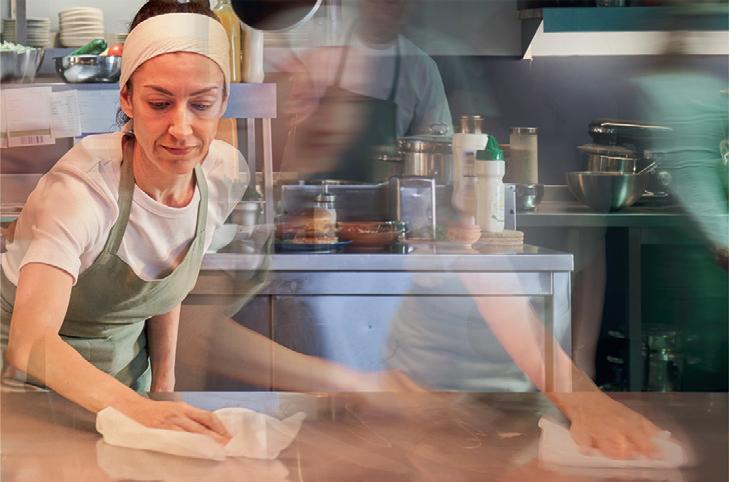
To help educate restaurateurs on improving cleaning practices, Tork Workflow™ for Restaurants is an expert consultation designed to reduce interruptions, increase efficiency and maintain a hygienic environment across all aspects of a restaurant’s operation. In fact, over threequarters of kitchen staff would be happier if their workplace were more organised.3 Training staff on the most up-to-date cleaning practices is one of the most important responsibilities for a manager, to ensure everyone takes responsibility for hygiene.
Prioritising hygiene isn't just about cleanliness—it's about protecting your business, your staff, and your customers. By investing in efficient systems and smart workflows, hospitality businesses can create safer, more welcoming environments that keep guests coming back.
torkglobal.com/gb/en/foodservice


A passionate team, fanatical about food, and committed to creating the freshest, most flavourful, globally-inspired food concepts for our clients across foodservice, we’ve been delighting customers with exciting concepts for over a decade. Never standing still, we constantly innovate with fresh new ideas and category-leading levels of service and agility.
Our bold, adventurous spirit and positively restless dedication to innovation fuel us to find new flavours and unearth the freshest, tastiest food concepts to meet our clients’ needs — from vibrant global street food to hand-stretched fresh dough pizza.
We’re clear in our purpose: to take the weight off our clients’ plates and make life easier with our complete

end-to-end, market-leading foodservice solutions. We’re collaborative, working side by side with our clients from menu innovation and concept development through to product training, marketing, and sales support. We provide the tastiest, most innovative food solutions so our clients can focus on delighting their customers and unlocking opportunities to drive revenue.
Tel: 01295 367351 Email: hello@tugo.co.uk Web: www.tugo.co.uk
See the advert on the facing page for mor information

Skinny Malinkys is a small batch hot sauce company based in Southbourne, Dorset, a place that has become well known for making food lover's dreams come true. Known throughout the area for their unique hot sauces, Skinny Malinkys only use market fresh, fermented chillies to create Louisiana-style vinegar based sauces that are fiercely flavourful with just the right amount of tongue tingle. Skinny Malinkys has a broad range of flavours to suit all tastes; from the savoury depth of the OG Roasted Garlic to the tropical tang of Pineapple Gold, made using fiery Golden Habanero chillies, or the tastebud teasing Green
Chilli, Cumin and Coriander - it makes sense to try them all! Bold, uncompromising taste in every drop. Join in with the full flavour misbehaviour at every meal.
Always dreamed of bespoke hot sauce for your business? Contact Skinny Malinky’s today to see what they do to elevate your condiment game.
www.skinnymalinkys.co.uk
Even though the sun is shining and high temperatures continue to spread across the UK, for foodservice, the attention turns to preparing for the festive season. And while Christmas cheer will fill dining rooms, many hospitality businesses face a familiar struggle — delivering exceptional experiences under mounting cost pressures. With rising costs, staffing shortages and supply chain pressures, careful planning is more important than ever. So, to help tackle these challenges, Bidfood has the perfect Christmas gift: an array of cost saving cost-saving tools designed to help the out-of-home industry thrive during its busiest season.
Unwrap Bidfood’s brand new online Christmas Range Brochure, which blends creativity, efficiency, and flexibility, enabling operators to keep standards high without overstretching budgets.
Inside, caterers will discover:
• Christmas menu planners – Digital tools to create profitable, portion-controlled menus using seasonal, cost-effective ingredients.
• Costed recipes – Chef-curated dishes with clear costings for minimal waste and maximum creativity.

• Tiered festive range – Quality products at multiple price points, maintaining a premium feel, whatever the budget.
• Waste reduction advice – Expert tips to cut waste, save money, and support your sustainability goals.
• Labour-saving products – Ready-to-serve and preprepped items to ease kitchen pressures and improve consistency.
To further inspire this Christmas, Bidfood’s Culinary Development Team has unveiled ‘The 12 Bites of Christmas’, which includes twelve brandnew recipes showcasing the latest festive products and trends and how chefs can apply them to menus. Think tender pulled turkey and sweet caramelised onion puff pastry rolls with cranberry and brie, moreish smoked salmon bruschetta with mascarpone and dill, and gingerbread French toast with spiced mincemeat and crème anglaise. Each dish is available as a short, easy-to-follow recipe video, helping chefs stay ahead of the curve with menu innovation.

This year also brings Bidfood’s biggest ever Safari Reward Members prize draw, alongside a variety of seasonal deals — giving you more reason to get involved!
From menu planning to staff training, sustainability advice to time-saving products, Bidfood is delivering far more than food this Christmas. Find the tools, inspiration, and expertise to help you turn challenges into opportunities and make the festive season truly sparkle!
Visit www.bidfood.co.uk/christmas/ to explore the Christmas Range Brochure and discover how Bidfood can help your business shine.
See the advert on page 15 for further information.
By Richard Thorpe
As the UK’s Less Healthy Food (LHF) legislation comes into force in October 2025, hospitality and OOH (out-of-home) operators are facing a significant shift. The new rules will restrict the promotion of high-fat, salt, and sugar (HFSS) foods— particularly across digital and broadcast channels—placing pressure on businesses to rethink their menus and marketing strategies.

But this challenge also presents an opportunity.
Eatlean Cheese, made from 100% British cow’s milk, is helping operators reimagine indulgent favourites like burgers, pizzas, and loaded fries. With up to 90% less fat and 45% more protein than standard cheddar, Eatlean enables chefs to create better-for-you versions of classic dishes—without compromising on flavour or function.
“It’s not about removing indulgence—it’s about rethinking it,” says Sara Greenhalgh, Director of Ingredients at Heler Ingredients. “We’re helping operators deliver bold, satisfying dishes that meet
nutritional targets and customer expectations.”
Eatlean’s range—including Tasty, Red, Chilli, Smoked and Grated blends—offers versatility for recipe development. Whether it’s a high-protein pizza, a leaner cheeseburger, or a calorieconscious mac & cheese, Eatlean supports smarter choices that go beyond token “healthy” options. These are dishes that will appeal to all diners, not just the health-conscious.
With the LHF legislation also affecting how suppliers and third-party platforms promote HFSS products, flexibility is key. Operators who adapt now can stay ahead of the curve—offering menus that are not only compliant but commercially compelling. Eatlean empowers the industry to lead the change—delivering indulgence with intention, and menus that are as marketable as they are mindful.
For more information or to request samples, visit www.eatleaningredients.com

It began with a humble butcher’s shop in Northern Ireland in 1898. Now, over 125 years later, McWhinney’s is a leading name in sausage production. Spanning six generations and still family-owned, the business has kept its original Irish recipe a closely guarded secret.
Using only the finest cuts of pork alongside the benefits of modern-day production, McWhinney’s has crafted sausages with exceptional taste and consistency.
All the ingredients and pork used are sourced from quality suppliers and farms, ensuring consistency and full traceability. McWhinney’s are a member of The British Frozen Food Association and backed with Erudus affiliation for allergy, nutrition and accurate product data, and SALSA approved. We have extensive ‘best practice’ food safety audit for professional food buyers and welcome customers to our facility to proudly showcase our family business and our longstanding, dedicated team.
Breakfast is a really important customer satisfaction measure
• 83% said a breakfast service is essential for a positive hotel experience
• 91% said they prefer an in-hotel breakfast
• 65% of the customers interviewed admitted they chose the hotel based on breakfast service.
*TripAdvisor’s TripIndex Breakfast statistics indicating guest habits.
Some of the key products within the McWhinney’s range are:
70% Pork Breakfast Sausage: Our lightly herbed, quality Cumberland pork sausage will create a memorable breakfast. The breakfast experience, including a quality sausage, can attract more guests and improve your reviews!
63% Pork Gluten Free Sausage: Great for those with a particular diet, but don’t worry…it’s the same taste, same quality, just Gluten Free! You won’t tell the difference!
60% Pork Cocktail Sausage: Suited for Buffets, Parties or Christmas, our bite size Cocktails are sure to be a hit and are perfect for any occasion. Where we are today?
Continued company growth has driven demand for the next stage of investment. A second factory is currently being built to increase manufacturing capacity by 2.5 times, and it is expected to be completed by March 2026.
Make it McWhinney’s!
Proud and confident in its range, McWhinney’s is offering an opportunity to try its sausages for yourself. Claim your FREE SAMBLE BOX* by e-mailing info@mwhinneys.com with your name, establishment, address and the code: CLH264.
*samples are for foodservice establishments currently operating in the UK
Ever since launching LittlePod in 2010, Janet Sawyer MBE BEM has been on a mission to underline vanilla’s versatility.
So when it came to hosting a dinner with which to mark her latest book – Real Vanilla: Nature’s Unsung Hero – there was no question about the main ingredient on the menu.
Having long supplied The Farm Table in Topsham with products from LittlePod’s responsibly-sourced range, the East Devon-based company’s Managing Director and founder was thrilled when Head Chef Tom Chivers suggested creating a bespoke four-course vanilla-infused feast. He did not disappoint – treating Janet and her guests to a masterclass in natural flavours.
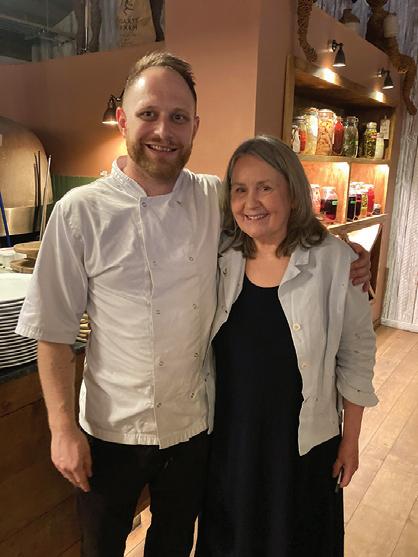
Tom cooked LittlePod Vanilla and Mushroom Arancini, Baked Brixham Sole with LittlePod Vanilla Sauce, LittlePod Vanilla and Lemon-Stuffed Chicken Breast, and LittlePod Tiramisu at last month’s dinner and UK book launch at Darts Farm’s award-winning restaurant.
“We use LittlePod’s vanilla paste and pods in our recipes
regularly, mainly in our puddings, so it was a pleasant challenge to build four courses to celebrate Janet’s latest book. We look forward to her next publication!”
The Farm Table was recently crowned Best Farm Restaurant at the Farm Restaurant Awards and presented with two AA rosettes for “outstanding culinary standards.”
Putting the focus on provenance, flavour and sustainability, Tom and his team have earned a reputation for excellence in the three years since The Farm Table first opened its doors to diners in Devon.
In creating a menu that Janet described as ‘delicious, delicate and summery,’ Tom demonstrated that there’s little as versatile as the ingredient at the heart of LittlePod’s longrunning Campaign for Real Vanilla!
Janet’s second book – Real Vanilla: Nature’s Unsung Hero – is available to purchase online from LittlePod here: www.littlepod.co.uk/shop – please email sales@littlepod.co.uk for more details and visit www.dartsfarm.co.uk for more about Darts Farm.


In a professional kitchen, sharpness isn’t a luxury — it’s a necessity. From the first prep of the day to the final plating at night, chefs count on their knives to deliver precision. That’s where the Tormek T-2 Pro Kitchen Knife Sharpener comes in — a sharpening solution trusted by culinary professionals around the world.
Backed by over 50 years of sharpening expertise, and developed for the intensity of the commercial kitchen, the Tormek T-2 Pro Kitchen Knife Sharpener gives chefs full control over their edge. The machine is gentle on knives — it sharpens, not shortens. Thanks to the slow-rotating diamond grinding wheel and high-precision guide, it only removes minimal steel, preserving the life of your knives while delivering exceptional sharpness.

fessional-grade results. No guesswork. No overheating. Just consistent, razor-sharp edges — time after time. With its low-noise operation and compact design, it integrates seamlessly into even the busiest culinary spaces — and is also suitable for sharpening other blades commonly used in food preparation.
The Tormek T-2 Pro Kitchen Knife Sharpener is designed to handle a wide range of kitchen knives — from large chef’s knives to small paring blades — and can also be used to sharpen other common kitchen blades, including mandoline blades and S-blades.
No matter the task, a properly sharpened knife is essential for efficiency and control. The Tormek T-2 doesn’t just sharpen knives — it elevates the entire kitchen workflow. tormek.com
What sets the Tormek T-2 Pro Kitchen Knife Sharpener apart is its blend of simplicity and pro-
Phone: +46 581-147 90 Email: info@tormek.se
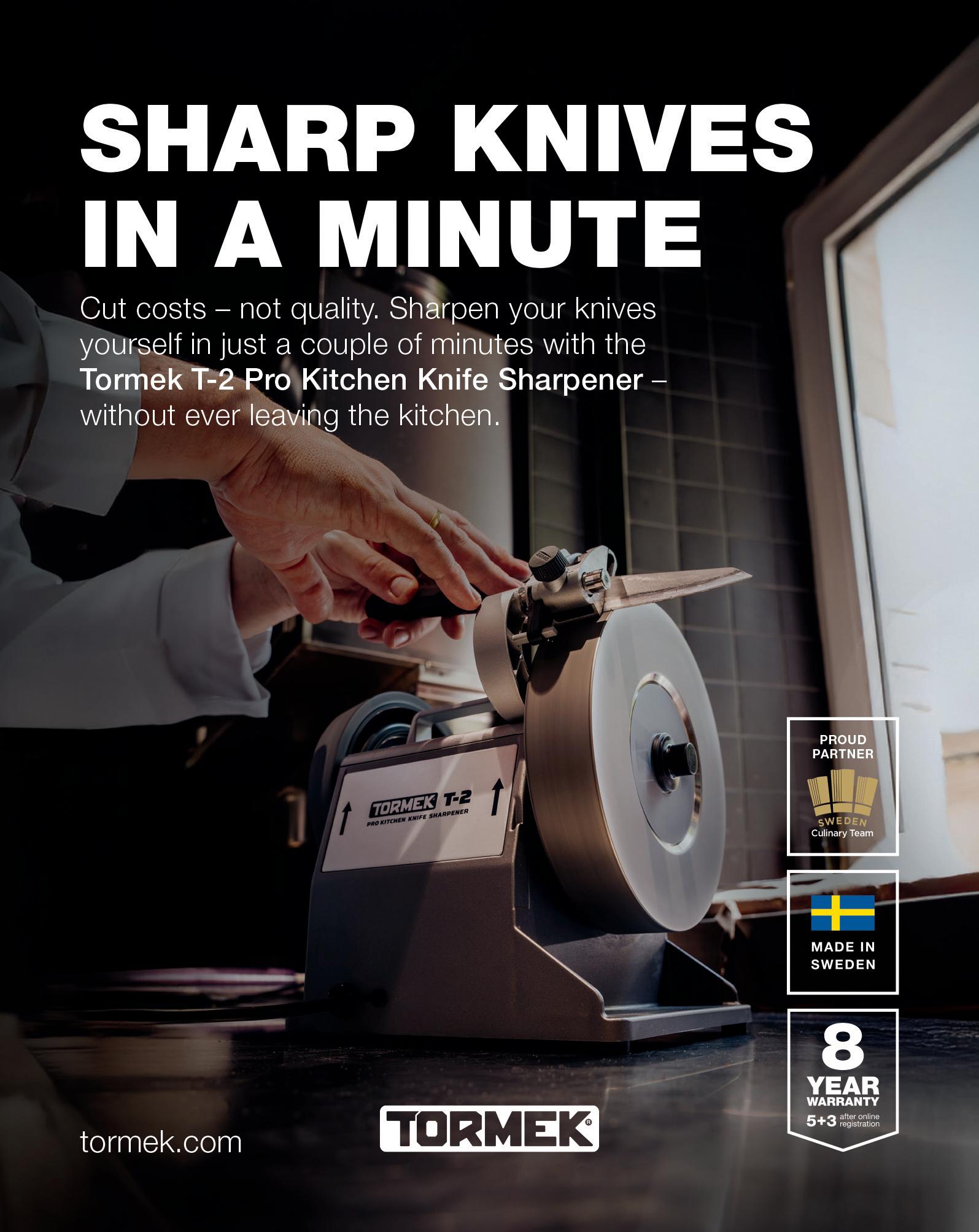


The UK has long been known for its love affair with outdoor events, from summer festivals to vibrant food markets. However, as the seasons shift, so too does the landscape of these events.
No longer confined to the warmer months, outdoor gatherings are now boldly extending into autumn and even winter, reshaping the UK’s hospitality and festival scene. But what’s driving this shift? And why are outdoor events becoming such a strong contender during traditionally colder months? We ask Rita Kastrati, CEO, Pioneering People (www.pioneering-people.com)
A significant factor behind the rise of outdoor events is the changing climate and we’ve all noticed the longer, hotter, heat wave summers over the last few years. The Met Office has even confirmed that the UK is experiencing much warmer summers than five years ago, with milder autumns, and what was once considered the tail end of ‘festival season’ in September and October is now prime time for more outdoor gatherings.
In 2023, the UK recorded temperatures over 30°C in September, shattering records and allowing outdoor events to flourish well into the traditionally cooler months. The extension of this warmer, drier weather has not only prolonged the outdoor event season but has also sparked demand from the public for more opportunities to socialise in the open air.
We know that people crave outdoor experiences too, and the allure of open-air gatherings has only intensified with changing seasons. It’s no longer just about escaping indoors to avoid the cold, it’s about finding new ways to connect with nature, friends, and experiences.
This craving for authentic, immersive experiences is not a passing trend either, it’s a cultural shift. After the pandemic forced us indoors, the great outdoors became a symbol of freedom and reconnection. There’s a psychological benefit to being outside, too - it boosts mood, reduces stress, and improves sleep quality.
For decades, the UK’s event culture relied heavily on indoor venues and the British weather, particularly in winter, made outdoor gatherings impractical. However, over time, event infrastructure has evolved - weatherproof tents, heated marquees, and adaptable spaces have made it easier for organisers to extend the outdoor event season and us Brits love it and we’ve at last become more European by extending our love for outdoors
almost all year long.
With this expansion, however, comes a significant challenge, staffing. As events stretch into the autumn and winter, the demand for reliable, adaptable staff grows exponentially. The unpredictability of the weather requires flexibility in planning and staffing. Organisers need workers who can handle whatever the elements throw their way, whether it’s managing crowds, overseeing catering, or ensuring safety.
Unfortunately, unreliable or inexperienced staff can make the difference between a smooth event and a logistical nightmare. Many organisers find themselves struggling with last-minute cancellations, no-shows, and undertrained workers ill-prepared for the fast-paced, ever-changing outdoor environment. This growing need for skilled staff places increased pressure on organisers to find a solution that’s not only professional but also flexible enough to meet the dynamic demands of these events.
Enter the gig economy and companies like Pioneering People are meeting this growing need by providing highly skilled, reliable event and hospitality staff, sometimes at short notice and even within minutes.
These teams understand the unique demands of outdoor events and offer a flexible, responsive workforce able to tackle organisers’ ever-changing requirements.
From welcoming large crowds with a friendly face to efficiently managing catering operations or serving drinks while delivering outstanding customer service, Pioneering People ensures event managers have access to experienced professionals who are fully briefed and prepared ahead of a job.
This level of reliability gives organisers the peace of mind they need, allowing them to focus on crafting unforgettable experiences no matter what the weather brings.
This approach also ties into the broader gig economy model, where temporary, on-demand workforces are playing a vital role in keeping events running smoothly. It is especially well-suited for the flexible, fast-paced demands of the hospitality and event sectors, where skilled, experienced professionals are needed at short notice and can quickly adapt to varying conditions.
As we hit the peak of summer 2025, I predict that the trend of experience-driven, all-year-round events will only continue to grow.
Companies like Airbnb are now tapping into this market by offering unique, curated experiences for their customers, and as innovation progresses and large global organisations lean into this trend, organisers will no doubt follow – what’s needed to make it work seamlessly is a skilled, adaptable workforce ready to rise to the occasion.

If you have an outdoor area that isn’t used in the winter, plus room to store the furniture, then packing your outside seating away for the colder months is always best practice to ensure future longevity. Or why not make your outdoor furniture work doubly hard by using it indoors in the winter months during busy periods? Currently with 15% off, our rust-resistant Alma Aluminium Table looks great indoors when paired with our Monaco Aluminium Stacking Chair, which is available with 10% off.
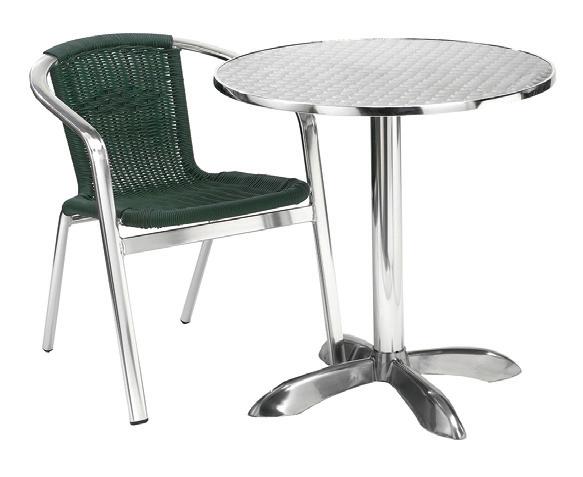
If you do want to keep this hardy aluminium furniture outdoors in a smoking or other outside area during the colder months, you can always cover it when not in use, safe in the knowledge that if it does get caught in the rain, it’s built using a technique that stops the warping that can happen when water finds its way into the core of the tabletop. That said, after heavy rainfall, it’s always a good idea to wipe away any water on the surfaces of your outdoor furniture.

Synthetic wicker is also a highly durable option for hardy outdoor furniture. With 10% off the chairs, our sturdy and stackable Plaza Range is made from synthetic wicker woven over rust-resistant aluminium, resulting in tough UV and water resistant furniture that won’t fade in the sun. Our highly popular Monaco Wicker Stacking Chair is another great wicker option. Alternatively, the Cannes Range is a reliably chic and contemporary choice in black powder-coated aluminium.
If you’d like more information on what durable outdoor furniture is best for your venue, give our experts a call on 01162 864911 or email sales@trentfurniture.co.uk
The UK outdoor furniture market is heavily influenced by changes in weather conditions, with consumers more likely to purchase picnic benches during periods of good weather. MG Timber specialise in the manufacturing and supply of highquality wooden picnic tables. Their picnic tables are made from high-grade timber and are designed to withstand the harsh outdoor elements. Crafted from the finest Swedish Redwood, each piece is expertly pressure treated to ensure longevity and protect against the elements. Renowned for their robustness, our treated
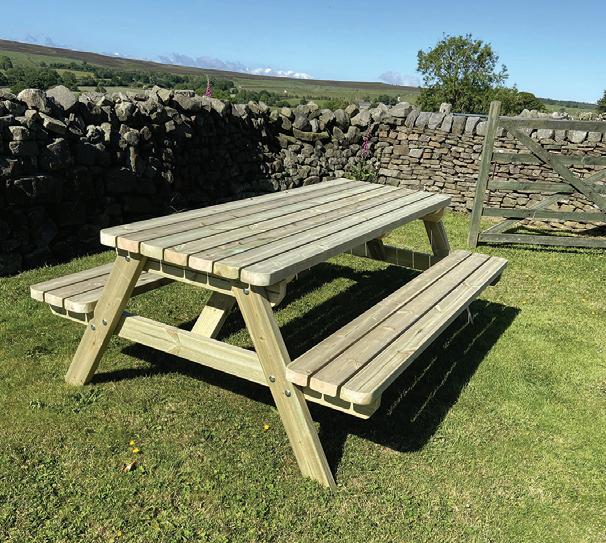
outdoor furniture is designed to withstand the unpredictable British weather, making them a reliable choice for any catering and licensing industry outdoor space. For full details about our vast array of top-quality outdoor picnic benches for sale contact us today. We are also offering up to 15% off on commercial orders, please visit our website www.mgtimberproductsltd.co.uk or call us on 01902 953166
the advert on the front cover.
and
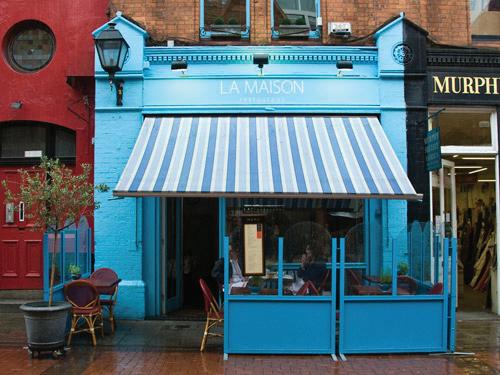
Our hardy planters are built to order using rot proof artificial wood planks. This unique material is not only
With over 30 years of industry expertise, Indigo Shading has become a leading national supplier of commercial grade awnings, giant parasols with accessories, screening plus glazed and retractable roof fixed structures. Built on a foundation of innovation and quality, the company has transformed countless outdoor spaces across the UK, providing exceptional outdoor solutions for businesses enabling them to grow their own turnover and profits.
From initial consultation to installation, Indigo Shading is committed to delivering unparalleled service. Indigo’s Managing Director Trevor Ruddle says “that’ll do won’t do, for us it has to be the best or nothing”. Every pro-

completely waterproof but is formed from UK factory waste plastics and materials that would otherwise have gone into landfill. They will last you countless years and are a genuine recyled investment.
From our workshops in Kent we deliver UK wide and are happy to visit and survey your site to to discuss your needs and prepare a drawing and quotation outlining what could be done, all within your available budgets.
We firmly believe the better you look on the outside, the more customers will come to the inside so contact us on 01733 559437 or sales@cafeculture.biz
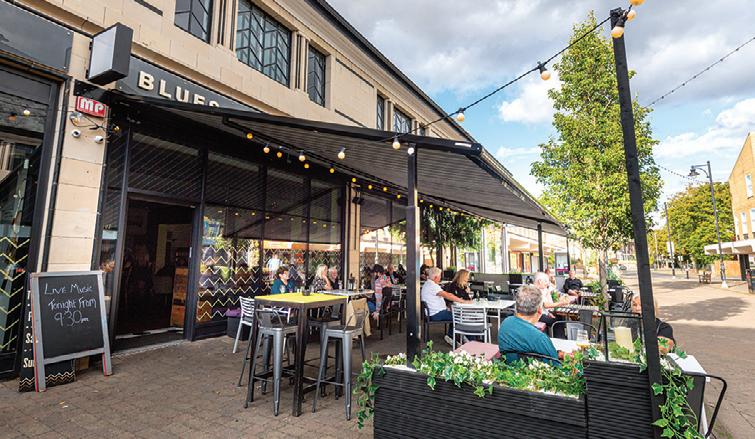
ject is approached with precision, ensuring tailored solutions that exceed expectations. Expert guidance, attention to detail, and seamless execution guarantee a flawless experience from start to finish.
Indigo Shading specialises in transforming outdoor spaces with premium products designed for style, comfort, and functionality, these shading solutions cater to a variety of industries, including Pubs, Hotels, Restaurants, Sporting venues, hospitality, retail, and education. From providing elegant shelter to enhancing brand visibility, Indigo Shading offers high-quality products that are both practical and visually stunning. Email enquiries@indigoshading.co.uk
Web www.indigoshading.co.uk Call - 01352 751889


Summer means busier kitchens, longer hours, and more strain on equipment—especially in restaurants and commercial food businesses. One of the biggest seasonal hazards? Kitchen extract fires.
Extraction systems—ducts, hoods, and fans—remove heat, smoke, and grease vapour from cooking areas. But over time, grease builds up inside, creating a highly flammable risk. One spark or flare-up can send flames racing through ductwork, causing major damage, downtime, and danger to staff and customers.

WHY SUMMER INCREASES RISK
Commercial kitchens face higher fire risks due to:
• Higher grease output from large-scale cooking and frying.
• Continuous operation, leaving little time for cooling or cleaning.
Overloaded systems during peak hours.
• Extensive ductwork that’s hard to clean thoroughly.
• Strict legal and insurance rules, with penalties for noncompliance.
STAYING SAFE AND COMPLIANT
In the UK, the TR19® Grease specification—set by
the Building Engineering Services Association (BESA)—outlines cleaning best practices. High-use kitchens may require professional cleaning every three months or less.
To protect your business this summer:
• Book professional cleanings with certified specialists following TR19® Grease.
Adapt cleaning schedules for increased summer usage.
• Maintain documentation of inspections and cleanings for compliance and insurance.
• Train staff on filter maintenance and daily surface grease removal.
ACT BEFORE IT’S TOO LATE
A kitchen fire can devastate a business. Proactive extraction system maintenance is the most effective way to reduce fire risk, meet regulations, and keep your kitchen running safely through the busy season.
Fire prevention starts with awareness—and a clean extraction system.
For help with your kitchen extract fire safety cleaning requirements, contact Swiftclean on 0800 243 471 or www.swiftclean.co.uk
Rational’s latest innovation transforms stadium catering with speed, consistency, and sustainability.
Tottenham Hotspur Stadium, opened in April 2019, is the largest club stadium in London. With over 60 food and drink outlets serving tens of thousands of fans during football matches and major events the stadium’s catering operations demand high performance and reliability.
To meet these demands, Tottenham Hotspur has become the first stadium in the world to install double-stacked iHexagon cooking systems. The iHexagon combines steam, convection, and microwave energy across six racks, enabling rapid, high-quality food production, essential in environments with short service windows and high footfall.

“We’re very proud to be the first stadium in the world to have double stacked iHexagons,” says Mark Reynolds, Regional Executive Chef for Levy in London, and National Chairman of the Craft Guild of Chefs. “They’ve taken up the space of two standard combi ovens, but they’re doing the work of four.”
For Ian Green, Head Chef of Retail and Culinary Development at Tottenham Hotspur Stadium, the impact has been immediate. “On an event day, we’ll probably put about 4,500 to 5,000 products through the iHexagons. It used to take 20 to 25 minutes to produce what we now do in five to seven minutes. That’s allowed us to cook fresher, better-quality food for the fans.”
With only a 15-minute window to serve thousands at half time, the iHexagon’s speed and precision have proven invaluable. “Now we’re producing a lot more food - an increase of around 18 to 22%. We’ve reduced queue times, improved quality, and seen sales go up,” Green states, adding that this has translated into “an approximate 30% increase in revenue.”
“Every game we seem to be putting more and more product through the iHexagons,” Reynolds adds. “They really deliver for us. For speed, ease of use, reducing electrics, reducing chemicals. And to be fair, it does what it says on the tin.” Discover
The King’s Head in Carlisle is a great example of how modern pubs can adapt and thrive by embracing high-speed cooking technology. Faced with rising staff costs and the need to serve food quickly without compromising on quality, landlord Mike Vose turned to the Lincat CIBO+ oven from the High Speed Oven Company to bring a new level of efficiency to his kitchen. A seasoned operator with decades of experience, Mike understood that traditional kitchen methods were too slow and labour-intensive for the fastpaced service he wanted to provide.
The CIBO+ offered an immediate solution—combining powerful convection cooking with microwave technology to deliver his menu rapidly. Instead of re-heating portions of pies in his combi-oven (taking 7-8 minutes) they are now ready in under 2 minutes. The oven has also allowed the pub to bring in an expanded lunch menu of toasties cooking in just 90 seconds.

The oven delivers consistent results with minimal training. On site training is provided and Its compact footprint

also makes it ideal for kitchens with limited space, something that’s often a challenge in busy pubs and bars.
What’s more, the oven requires no ventilation or extraction, allowing it to be placed virtually anywhere. This opens up new opportunities for food service even in locations that couldn’t previously accommodate hot food equipment. For Mike and The King’s Head, that meant turning more drinkers into diners and offering food throughout the day, not just during peak service.
If you’re looking to improve kitchen speed, cut labour costs, and increase your menu range, the Lincat CIBO+ high-speed oven could be the game-changer your pub needs.
See more here:
www.highspeedovens.co.uk/case-studies/the-kings-head-lincat-cibo/
See the advert on page 7 for details.

• Be ready for your inspections
• Damaged fridge seals are unhygienic
• Make your fridge more energy efficient with a good seal on your fridge
• We provide custom seals for cold rooms, discontinued models, and units with no identification information
• Next-day delivery service
• Discounted prices on large orders
WhatsApp, phone, and email support
07936807320

Blue Seal have noticed over the last few years a definite increase and trend for modular suited cooklines, especially for front of house customer facing kitchens where there is a theatre element to the dining experience.
With the current sustainability/ high efficiency and carbon footprint directives, the requirement for electric equipment options to future proof and modernise the operations has become a priority. This expansion is predominantly for new site install, where the site has the power supply for 3phase and the operator is looking to future proof the kitchen and incorporate a full electric line up, including high efficiency induction hobs etc.
This complete electric specification also avoids the complication & cost of expensive gas regulation canopies and interlock systems. Electric equipment is also generally easier and cheaper to Install, routinely maintain, as well as having a longer life span in some cases. This encourages restaurants, Hotels etc. to invest in high efficiency, low carbon sites.
There has not, however been any downturn for demand on gas equipment in general, especially twin tank gas fryer units, chargrills, ranges and griddles. The running cost of gas is on the increase, however there
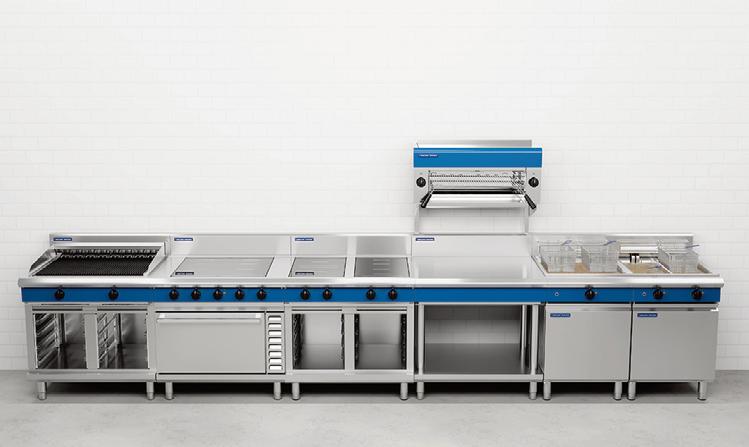
are a huge quantity of commercial kitchen sites in the UK that do not have the 3phase power supply to run a high-performance electric cook suite. A more common general application is a balanced mix of high efficiency induction equipment and gas equipment such as char grills/ solid fuel grills/ high efficiency gas fryers, which give the operator a unique equipment performance or finish and flavour to food items. With most manufacturers investing their R&D into high efficiency technology & solutions, to replace gas equipment, long term there is no doubt that electric powered appliances are the future. www.blue-seal.co.uk
Alto-Shaam's pioneering multicook ovens provide expanded menu potential, with up to four ovens in one

The UK’s restaurant and hospitality industry continues to navigate a complex landscape. With mounting cost pressures – everything from inflation to rising energy prices, a wave of closures, staff shortages, shifting consumer behaviour, as well as the increasing demand for sustainable operations has resulted in the need for a more cost effective and efficient kitchen.
For many operators, the need to identify greater efficiencies in space and food production has presented one of the biggest challenges – how to do more with less. Versatile and multi-functional foodservice equipment can play a key role in maximising operations.
Alto-Shaam created the multi-cook oven category when it introduced its Vector H and W Series ovens. Its pioneering portfolio of multi-cook ovens, which also includes its latest addition, Converge multi-cook ovens, transform kitchen operations with unmatched food volume and variety.
Featuring Alto-Shaam's patented Structured Air Technology, which delivers unique high-velocity, vertical
Caterquip Ventilation Ltd is proud to be celebrating their 25th Anniversary this year.
This Warwick based company offers nationwide coverage for all your commercial catering needs: free site surveys, quotations and designs (CAD), quality bespoke and standard fabrications, specialist knowledge of catering ventilation systems including input air, odour reduction (carbon filtration and ESP) and sound attenuation. Affiliated members of Constructionline and CHAS, Caterquip Ventilation have a strong hold in the marketplace often advising industry professionals on ventilation systems to a DW172 specification & BSEN:6173.
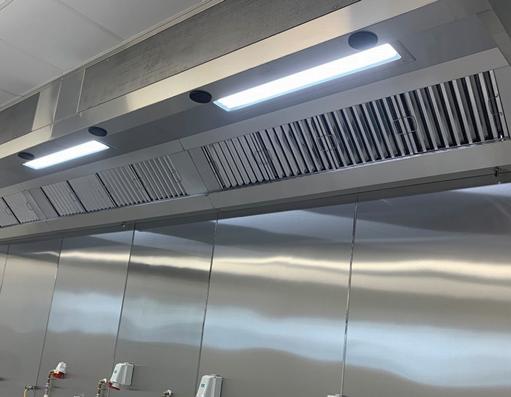
They have strong relationships with all leading kitchen equipment suppliers, and they offer a kitchen design service to help you build
your ideal kitchen. Projects undertaken have included Olympic Villages, Basildon Hospital, The Mitre Hotel at Hampton Court, The Truck Stop at Anglesey, The Lodge at Old Hunstanton, Colleges, Schools, Hotels, Restaurants and Public Houses. They ensure their systems are compliant with the current guidelines whilst maintaining an efficient and dynamic facility.
With extensive knowledge of manufacturing and installing ventilation systems, they can help you design the best kitchen within the space available.
Call: 01926 887167, visit: www.caterquipventilation.co.uk, email: info@caterquipventilation.co.uk
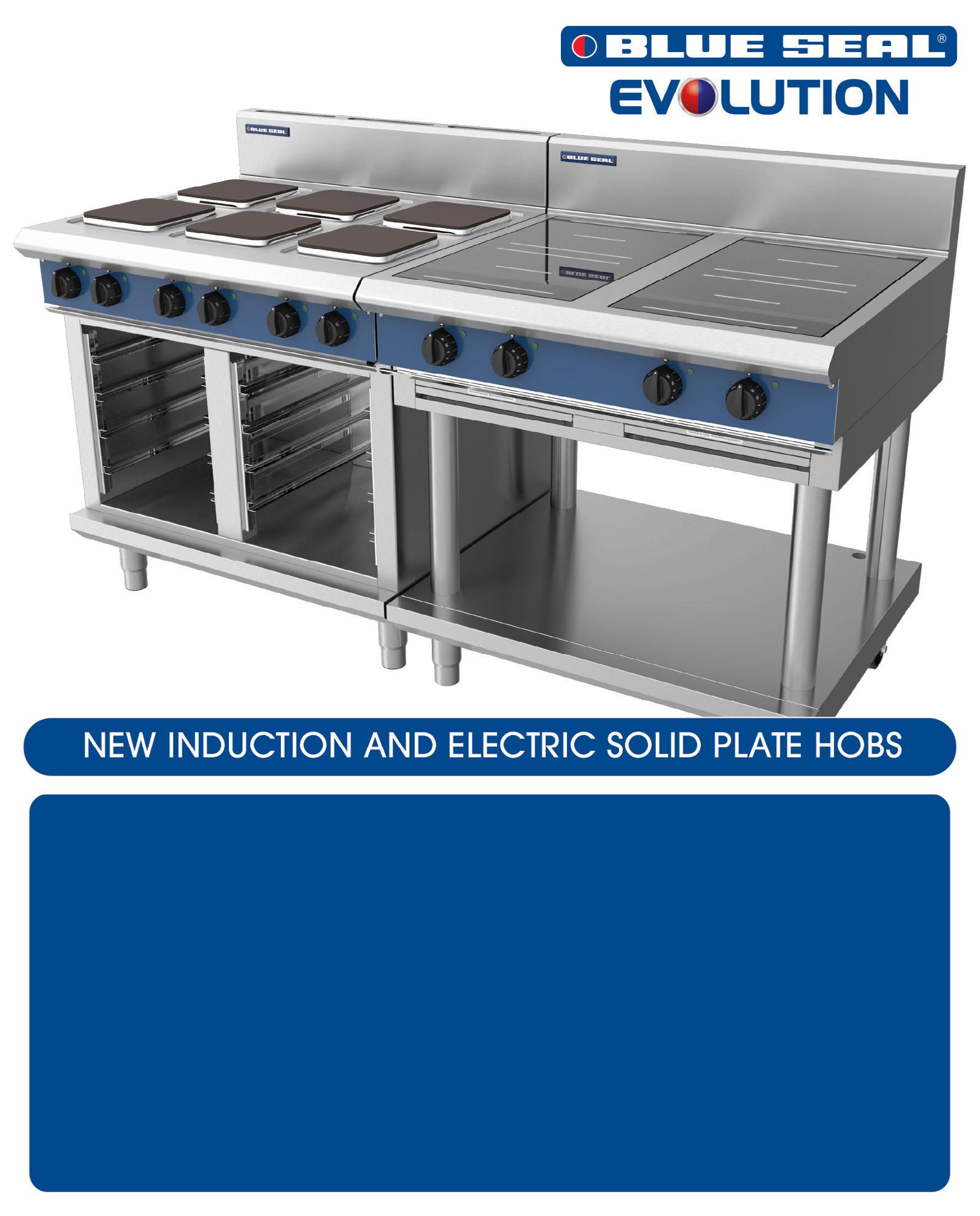
working day service.
Find out more at: www.blueseal.co.uk
upward and downward airflow for the most consistent and high-quality cooking, both Vector and Converge models provide up to four independent ovens in one. The versatility of multi-cook ovens is such that they can cook multiple food items, from meat and fish to cookies and cakes, simultaneously at their ideal cooking settings with zero flavour transfer.
When paired with ChefLinc, Alto-Shaam's cloud-based remote oven management system, operators can gain even greater control of their equipment and menus from wherever they are, with the ability to seamlessly create, manage and distribute recipes to ovens through the cloud.
Available in a variety of sizes and configurations, including stackable, waterless, ventless and even selfcleaning models, Alto-Shaam's multi-cook ovens add significant value any foodservice operation – saving you space, labour and operating costs.
To find out more, visit www.alto-shaam.com/en/products/multicook-ovens or get in touch with James Olbort, AltoShaam's UK Commercial Leader, at jameso@alto-shaam.com

Fridge Seals Direct proud to be UK's no1 supplier of replacement fridge and freezer seals. We fabricate for a wide variety of commercial fridge & freezers. The management team at Fridge Seals Direct have over 30 years of experience in the refrigeration industry and have each spent many of those years installing gaskets and hardware for a range of styles, brands and sizes of fridges.
From restaurant kitchens to food warehouses - we have experience in dealing with fridge & freezers of all sizes
and scales. To learn more about fridge seals, be sure to explore our range of extensive guides on how to replace a refrigerator door seals. Otherwise, find your specific guides in how to identify, measure, install or maintain your fridge or freezer door seal.
Our reputation in the industry along with our commitment to providing a high-quality gasket without having to buy from the factory allows us to have competitive pricing and fast turnaround time. Try us out, order your door gaskets from us and discover a better way to do business. We are here to help you. www.fridgesealsdirect.co.uk
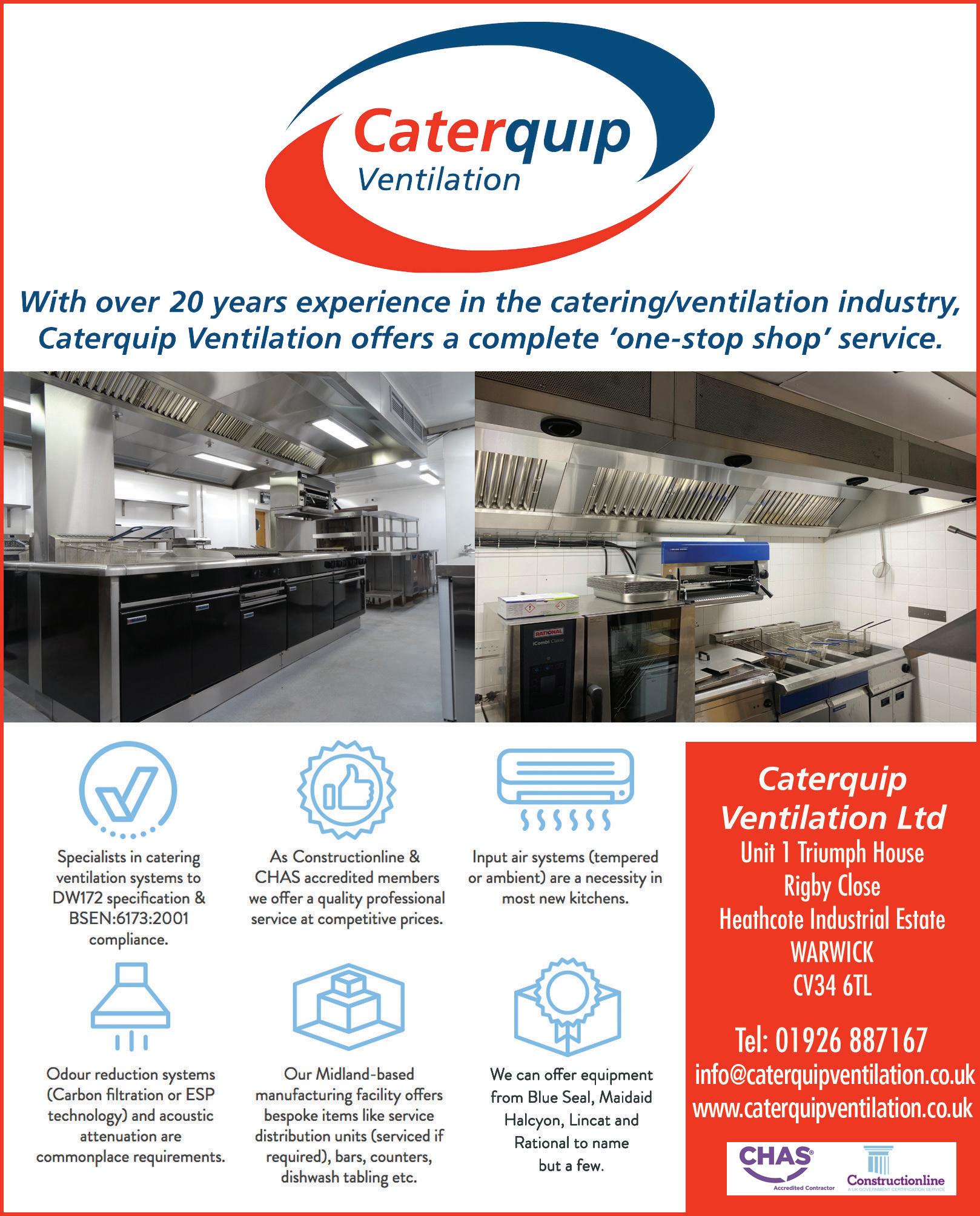


When buying a waste water pumping system for a commercial kitchen, installers and end users naturally want the best pump for the job at the best price!
Talking with catering pump experts Pump Technology Ltd is an extremely effective way to find exactly the right system for any installation and to learn all about the benchmark DrainMinor or DrainMajor pumps that they have to offer.
Historically, the company’s customers often confirm that this is how they almost always find exactly the right product first time.
Pumps operate successfully within a specified performance envelope. This envelope is relatively narrow, not only in respect of how far or how high the pump can pump, but also considering parameters such as
the water temperature and volume of debris which are likely to be present in the so-called waste.
Factors such as coffee granules, milk skin, elevated waste water temperatures, low inlet levels etc. all make a difference to the correct selection and the resulting trouble-free operation of the pumping system.
For smaller applications the below-sink DrainMinor 30SL is a compact unit incorporating a Jung Pumpen U3KSL pump. It has a fluid facing, carbon/ceramic, rotating mechanical seal on the motor / impeller shaft, rather than the static lip seal normally found on other small pumps. This means that, unlike with lower spec. pumps, settled or suspended food waste such as coffee granules can’t get forced past the seal.

This quality construction ensures that no moisture path can be created to the submersible pumps motor windings which would lead to premature failure and the pump tripping.
For larger installations the DrainMajor 730HES is ideal. This features a cast iron pumping volute and stainless-steel body with class F motor insulation, making it suitable for pumping hot waste water up to 90°C. Importantly, this is not just for a limited time period as stated by other pumps, but rated for continuous operation!
In hospitality, speed, consistency and quality are everything. With fresh bread forming the backbone of countless staple dishes at busy hotels, bakeries and restaurants, slicing is a time-consuming bottleneck workers can do without. Whether prepping breakfast buffets, crafting elegant afternoon teas, or serving up artisan sandwiches, precision bread slicing matters.
That’s where MHS-Schneidetechnik comes in with its automated slicing technology. Designed for highdemand environments, MHS bread slicers bring over 30 years of German engineering to your kitchen. These machines offer slicing speeds of up to 220 slices per minute, with adjustable thickness down to 4mm, perfect for melba toast, rye, sourdough, and more.
From compact tabletop units to robust floor-standing models, MHS slicers fit seamlessly into hospitality spaces as narrow as 60cm. Built with hygienic stainless steel, easy-clean components, and GS-certified safety, they’re trusted by hotels, restaurants, bakeries, and catering operations across Europe. They are now available exclusively in the UK and Ireland through bakery equipment specialist EPP.

Designed specifically for applications such as Combi Ovens is the DrainMinor C.
Like all of the Jung pumps fitted by Pump Technology Ltd, it features their very large, low level triangular pump float, externally mounted to the pump body via a rigid float arm. Compared with a tube float on the side of the pump this float is proven not to jam or stick due to food waste debris.
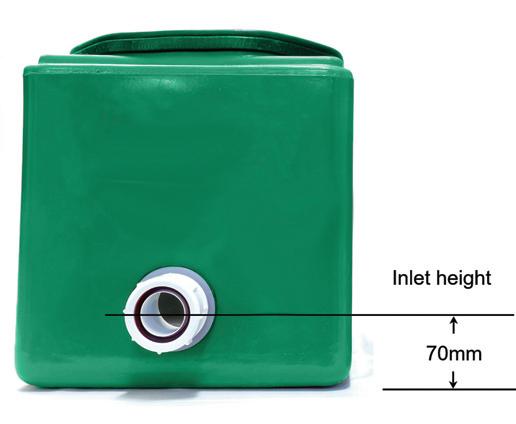
It is this level of product detail, combined with many years of application knowledge from the Pump Technology Ltd experts, which offers potential customers a technically appropriate and cost-effective solution every time they call.
For all your catering pumping requirements a call to Matt Camille will be well worth it!
matt@pumptechnology.co.uk

“Hospitality businesses need equipment that performs under pressure,” says Steve Merritt, Managing Director of EPP. “MHS slicers help automate prep, reduce waste, and deliver consistent results, saving time and money every day.”
Manufactured in Abstatt, Germany, All MHS models feature hygienic stainless-steel housing and easy-access components for quick cleaning. Its durable blades stand up to the rigours of hospitality and ensure quiet, efficient operation. Tabletop or floor standing models are available in a range of sizes, able to fit into hospitality spaces as narrow as 60cm.
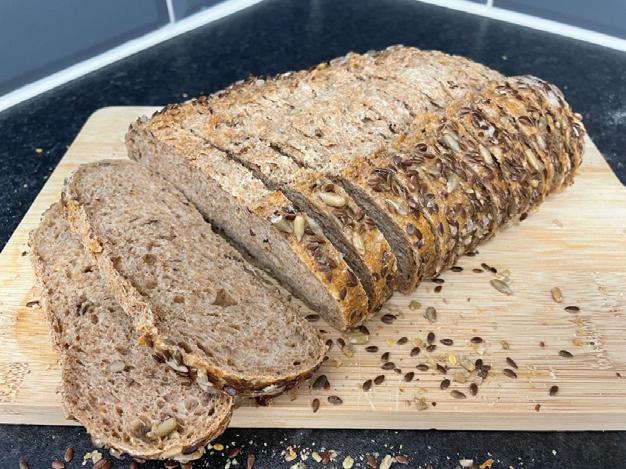
Whether you're running a busy kitchen or scaling up production, MHS slicers are a smart investment in quality, speed, and reliability. Ready to upgrade your slicing game to cut costs and enhance productivity? Visit www.eppltd.co.uk to explore the full MHS range and take the stress out of slicing.
See the advert on page 3 for further information.

When it comes to commercial kitchens, cleanliness isn’t just a about presentation – it’s a matter of safety, compliance and operational efficiency.
Two critical areas often overlooked are kitchen extract systems and deep cleaning routines. Neglecting either can lead to serious fire hazards, hygiene issues and costly long-term issues.
Kitchen extract systems, responsible for ventilating heat and smoke, are prone to grease buildup. This accumulation doesn’t just hamper airflow – it dramatically increases the risk of fire. Regular professional extract cleaning removes flammable residues and ensures your ventilation operates efficiently.
At Jasun Envirocare, our Kitchen Extract Cleaning Service helps reduce fire risks, improves hygiene and ensures you stay aligned with insurance and inspection standards. It’s not just recommended – it’s essential.
Equally important is a full-spectrum kitchen deep clean. Surface-level tidying may

suffice for appearances, but bacteria and grime often linger in hidden corners and all over equipment.
Our Kitchen Deep Cleaning Service provides a comprehensive cleanse, targeting contaminants that can compromise food safety. Tailored cleaning schedules mean minimal disruption, saving time and money, and maximum peace of mind – so your team can get back to work in a safe, sanitary environment.
Whether you’re due for an extract system refresh or a complete kitchen deep clean, Jasun Envirocare offers professional solutions to keep your operation compliant and protected.
Get in touch to book your extract cleaning or schedule your deep clean today. www.jasun-envirocare.com/company/contact
You, your team and customers, and your kitchen, deserve top-tier care from its team of experts.
Air Vent Technology offers three ranges of high temperature fans designed for installation into commercial kitchens.
At TheCommercialOvenStore.com, we know that the heart of any professional kitchen is a reliable, high-performance oven. That's why we offer an extensive range of ovens from the world’s leading brands – including Blue Seal, Lincat, Unox, Rational, and Merrychef.
Whether you’re running a bustling restaurant, a cozy café, or a fast-paced catering business, you’ll find the ideal solution with us. Our selection includes powerful gas and electric ranges, versatile combi ovens, high-efficiency speed ovens, and durable convection ovens, alldesigned to keep your kitchen operating at peak performance.
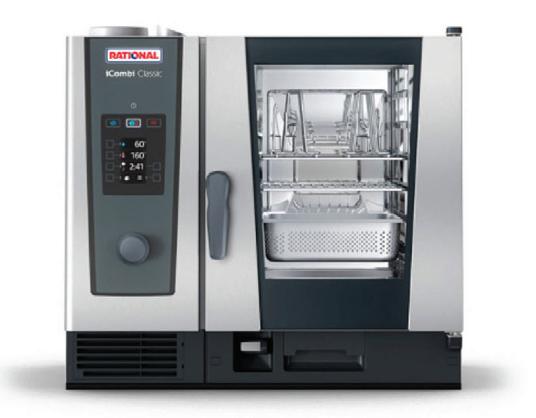
Explore cutting-edge fea-
tures, energyefficient designs, and trusted engineering –all in one place. From compact units for smaller kitchens to heavy-duty systems for large-scale operations, we make it easy to find the right fit for your needs and budget.
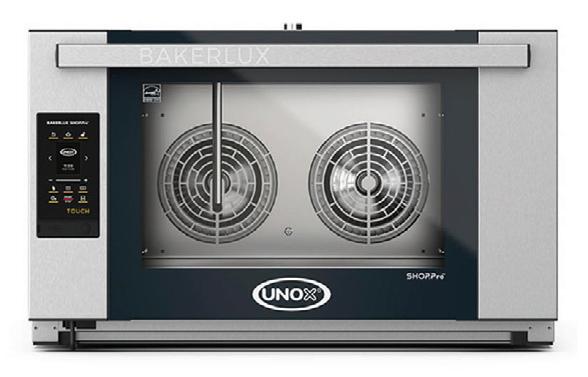
Expert advice, competitive prices, and trusted brands – all at TheCommercialOvenStore.com
Get the equipment you can rely on, and take your kitchen to the next level.
T 0207 965 7502 sales@thecommercialovenstore.com

The “QBK,” the “QMF-HT,” and the “STR/MOS” can handle operating temperatures between 80ºC and 180ºC with performances from 0.10 m³/sec to 7.45 m³/sec, single and three-phase.
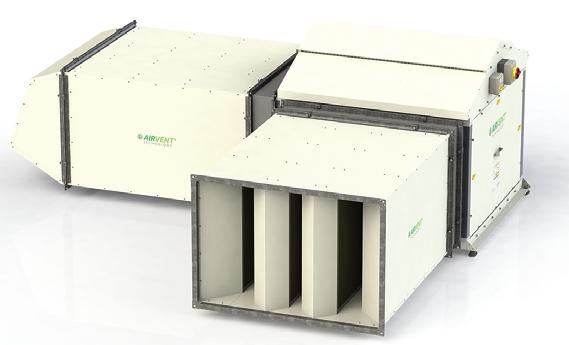
For maximum durability, the motors are out of airstream, preventing overheating, reducing exposure to dirt and grease, and minimising maintenance and cleaning. All have acoustic linings to reduce noise breakout.
The "QBK" range comprises six fans and five sizes, single and three-phase. They have energy efficient, direct drive fans with backward curved centrifugal impellers. "QBK" units have flexible airflow configurations - straight through or 90º.
Cases are of robust extruded aluminium frame in double skinned galvanised steel with a plastisol coated finish. All are fitted with energy saving controls. Attenuators, cowls, flexible duct connectors and weatherproof kits are available.
The "QBK" range will operate in temperatures of up to 120ºC with performances from 0.10m3/sec to 2.97m3/sec.
The “QMF-HT” range comprises nine sizes - single and three phase, four and six pole motors. They are continuous running in temperatures up to 180ºC with performances from 0.10 m³/sec to 3.40 m³/sec and are for ducted or direct installation. They are easy to install horizontally or vertically, inside or out.
The “STR/MOS” are continuous running in temperatures of up to 80ºC and can be installed internally and externally.
There are two sizes, each with two motor ratings giving performances of between 2.00 m³/sec to 7.45 m³/sec. The “STR/MOS” are versatile with seven spigot options which can be set at installation. Air Vent Technology can design custom ventilation systems using these high-temperature fans to ensure optimal performance for any situation.
Tel: +44(0)1264 356415
Email: sales@airventtechnology.co.uk Web: www.airventtechnology.co.uk

At The Commercial Oven Store, we take great pride in being your go-to destination for all your commercial oven needs.
We understand that when it comes to running a successful business, having the right equipment is crucial. That’s why we have dedicated ourselves to providing top-notch products, coupled with expert advice, to help you make informed decisions and achieve your goals.
As a supplier of commercial ovens, we have established strong partnerships with leading manufacturers in the industry. By working closely with these renowned brands, we ensure that our customers have access to a wide range of high-quality ovens that meet the diverse needs of various businesses.
Whether you’re in the food service, hospitality, or catering industry, we have the perfect oven to suit your requirements.

Two Michelin-starred chef Aktar Islam pushes the possibilities of food ageing in pursuit of flavour with Williams meat ageing refrigerators
Opheem is the only two Michelin star restaurant in Birmingham, and one of just two Indian restaurants in the UK to achieve this. At its core, this level of fine dining demands a seamless synergy between quality ingredients, technique and personality. Aktar Islam, chef and proprietor of Opheem, explains it simply. “We’re in a business of flavour. Any process which we adopt has to be for that reason.”
The restaurant’s menu focuses on seasonal British produce but through the culinary practices, history and flavours of Indian cuisine. It combines classic approaches with modern techniques and aesthetics. For Aktar, Opheem’s marriage of cultures is emblematic of its setting, his home city of Birmingham.
“I think over the last sixty years one thing Birmingham has always been good at is adopting new cultures,” says Aktar. “The food scene here is incredible. To be part of that is really important to me.”
Although Birmingham also formed his upbringing and culinary roots, Aktar spent years working in restaurants in Argentina, renowned globally for its outstanding quality of beef. Unlike the UK, where beef is often dry-aged for 28 days before it is sold, much of Argentinian cuisine favours fresh, unaged cuts.
“For me personally dry ageing brings out the best in the beef,” says Aktar. “As a nation we’re renowned for it; it’s something I’ve been doing for years. We don’t do this process of dry-ageing for vanity or for the sake of doing it. There is a tangible benefit. When you get meat, fish or poultry that has been aged, it tends to intensify the flavour.”
Growth is at the heart of Opheem, having transformed its kitchen three times since its opening in May 2018. In light of this, and the importance of using dry-aged ingredients on the menu, Opheem recently purchased three Williams meat ageing refrigerators.
“I think the decision to install three Williams dry-agers into the kitchen is important. It’s very much part of the journey we’re on,” says Aktar.
Before installing the Williams meat ageing refrigerators, Opheem would often rely on its suppliers to dry-age its proteins. This had its limitations as the level of customisation required was not always possible. The team would often end up with “makeshift” dry agers, particularly when ageing fish. Upon installing the three Williams meat agers, all dry-ageing was able to move in-house.
“Now we dry-age all our proteins. We have control over the entire process.”
Of the three Williams meat ageing refrigerators currently installed, one is used for poultry, another for beef, and the third for fish. All require different conditions and so flexibility and control is essential. For Aktar, the Williams units allow for this.
While dry ageing brings out intense flavours, it can also transform the cooking of the ingredient in question. “With poultry we’ve found the skin is lovely and crisp by removing some of that moisture in the drying process. Same with fish, it really helps the marinades actually stay on the fish as opposed to dripping,” says Aktar.
Given the fish at Opheem tends to be chargrilled over charcoal, this has been vital at improving the cooking process and maximising the overall flavour and finish of the fish.
“With beef, we find we get a far better sear. That Maillard process, where we really build up layers of flavour, I find so much easier with a lovely dry-aged piece of beef.”
Of all the proteins Aktar currently dry-ages, beef is given the longest. "We’re getting at least two and a half months out of it” says Aktar. “The quail we’re using at the moment is aged for a week, and the fish for four days.
“For me having the three cabinets, having that flexibility, being able to experiment and find what works for me, that’s really important and that’s something I’ve got now which I never used to have before.”
The equipment at Opheem was supplied by Vision Commercial Kitchens Limited. Aktar’s relationship with Vision is longstanding, having worked with the company’s managing director, Jack Sharkey through multiple projects over the last fifteen years. The kitchen at Opheem has itself had three renovations in a six year period since its opening in 2018, and for Aktar, Vision has been on board every step of the way.

“I love working with Vision because they understand exactly how I operate and what I want. They work with me to create the perfect kitchen for my needs.”
“Aktar’s vision, precision, and constant drive for innovation make every project we collaborate on truly special,” says Jack Sharkey of Vision. “Integrating the Williams meat ageing units gave Aktar the exact control and consistency he’s been looking for.
“The specification had to allow for different humidity and temperature zones and the Williams units delivered that perfectly. Seeing how Aktar and his team are now using them to refine flavour and elevate texture is exactly why I love what we do at Vision. It’s not just about supplying and installing equipment — it’s about enabling culinary innovation.”
While other meat agers are available on the market, Aktar chose Williams Refrigeration. “I’ve always opted for Williams Refrigeration because I find it to be very dependable. That’s really important when it comes to refrigeration.”
Location also plays a part. Williams remains a British company with its factory based in the UK, a big draw for Aktar when it comes to reliability and availability.
“I think because Williams is a British product manufactured in Britain, if I ever do have any issues, it’s all there. Labour, service and after care; they’re always able to support you.”
Although the three cabinets currently age poultry, beef and fish respectively, the ever-evolving menu at Opheem demands constant reinvention and experimenting, and for Aktar, dry-ageing has potential beyond meat and fish.
“Ageing is something that most ingredients benefit from. It’s incredible what you can do. Now we’re looking at what we can do with vegetables as well because the possibilities are endless.
"I’ve been behind this movement for well over two decades and the Williams Meat Ageing Refrigerator is something I wholeheartedly recommend. I think your customers will love it.”
Williams Refrigeration offers a comprehensive range of commercial refrigeration including gastronorm cabinets and counters, specialist bakery equipment, coldrooms, multidecks and blast chillers.
To learn more about Williams extensive product range visit www.williams-refrigeration.co.uk.
For more on Vision Commercial Kitchens Limited visit www.visionck.co.uk

In football, it's not only about the game; it's about creating a memorable experience for fans. That's why clubs are continuously seeking ways to enhance matchday experience by reducing queues and providing more options for their supporters.
Notts County FC adopted an innovative strategy to achieve this by installing a new bar inside a repurposed shipping container at their Meadow Lane stadium, with the aim of improving fan experience and boosting matchday revenue.
To ensure seamless operations and efficient transactions at the new bar, Notts County turned to MCR Systems, a leading provider of EPOS (Electronic Point of Sale) solutions.
INSTALLING A WINNING SOLUTION
MCR Systems swiftly responded to Notts County's needs by installing eight cutting-edge EPOS terminals with the new bar. These state-of-the-art terminals were equipped with interactive media screens and integrated payment devices, providing a robust solution to manage the bustling crowds during home games.
MCR Systems conducted thorough training sessions with the club's team to ensure a seamless transition
and help the team maximise the functionality of the new system.
NOTTS COUNTY FC NETS IMMEDIATE RESULTS
The installation had an immediate and practical effect. Fans enjoyed shorter wait times and quicker transactions, significantly improving their matchday experience.
Encouraged by these positive outcomes, Notts County FC decided to take further steps to enhance their matchday offerings by expanding their partnership with MCR Systems.
Notts County ordered an additional ten terminals from MCR Systems for two new sections in the away end of Meadow Lane. These terminals were operational just in time for the Boxing Day fixture against Doncaster Rovers, further enhancing the stadium's amenities and revenue potential.
MCR SYSTEMS
T: 0116 299 7000
E: enquiries@mcr-systems.co.uk www.mcr-systems.co.uk

By Lewis Sawyers, business consultant at

Using outdated systems to manage a restaurant is akin to driving a car with square wheels. As the front-of-house team tries desperately to maintain the car's control and speed, the vehicle itself is unsettled and shudders frequently, leading to an uncomfortable experience for the passengers.
Amid an increased demand for seamless customer experiences and enhanced service speed, streamlining operations for front-ofhouse staff has become a priority for restaurants. Similarly, convenience, speed, and a personalised experience have become standard expectations for consumers when dining. As a result, integrating technology into restaurant operations is now considered essential to meet these demands. Without this digital convenience, restaurants run the risk of delays in processing orders and taking payments, creating disruption for customers. There is also the issue of changes within areas like inventory management and menu optimisation suffering as a result of restaurants relying on one central computer in the back-office.
These operational issues frustrate diners and place added pressures on staff in equal measure. In worst case scenarios, they lead to slow table turnover and reduce revenue opportunities for restaurants, potentially damaging a brand’s reputation and customer loyalty. To remain competitive in a continuously evolving landscape, restaurants must embrace technologies that not only support their staff, but also meet the expectations of the modern day, digitally savvy consumer. Failure to keep up leaves restaurants at the risk of falling behind competitors.
The food and drink industry is fiercely competitive, with 1,932 establishments going insolvent in 2023 – an astonishing 45 percent increase from the previous year. To stand out from the crowd, those providing customers with enhanced digital offerings are at a clear advantage. Particularly in the face of soaring costs, profitability challenges and labour shortages, additional offerings like digital menus and a variety of payment options, can make a significant difference in ensuring customer loyalty and satisfaction.

In addition to meeting customer expectations, digital offerings can also refine back-office operations. Without digital assistance, employees have to manually track inventory, leaving room for error. Similarly, restaurants without digital payment systems rely on manual calculations and counting out cash by hand, potentially resulting in costly mistakes. This often leads to transactions being misrepresented, producing inaccuracies, as well as requiring additional time and resources to correct them.
Fortunately, integrated solutions are readily available in the form of all-in-one point of sale (POS) systems. A good POS system not only streamlines operations, but helps restaurants to boost revenue. By automating otherwise manual tasks like inventory management and transaction tracking, errors are minimised, time is saved, and workflows run smoother on one integrated platform.
POS systems can also assist restaurants with their wider business strategies. One of their key features is the ability to provide real-time data on sales, customer preferences and employee progress. These insights can subsequently be used to better inform decision making and enhance profits. For example, data indicating which menu item has been the most popular could offer awareness into the best items to include in a deal.
Additionally, a strong POS system can improve customer retention, by ensuring consumers can pay using the method which is most convenient for them, whether that be cash or contactless. With integrated payments solutions like this, front-of-house teams can also focus on serving customers face-to-face from their handheld devices, without needing to divert back to the bar to process their orders or payments.
UK consumers are increasingly seeking dining experiences that offer more than just food. They are prioritising establishments that provide sustainably sourced meals and value through loyalty programs. Diners are more inclined to support and return to trusted restaurants that deliver quality.
The right POS solution can help with this. For example, online rewards programs can be run through a restaurant’s POS system. Offerings like this boost customer loyalty by fostering engagement and creating connections with customers, as well as personalising their dining experience, making customers feel valued beyond their financial contributions to the restaurant. As a result, consumers are more likely to return to a restaurant. Potential rewards are also a good incentive for consumers to try a new venue.
The real-time data that POS solutions gives restaurant owners access to, also augments the customer experience. By understanding which items are most popular, restaurants can create more targeted and impactful marketing campaigns that resonate with their customers. Customers will feel more valued knowing their feedback has made a difference to a restaurant’s strategy.
From streamlining back-office functions to personalising customer experiences, a strong POS system makes all the difference for restaurants trying to stay competitive in a highly dynamic environment. Those relying on manual processes will struggle to keep up with competitors that are leveraging digital tools like POS systems to optimise operations. Investing in the right POS system isn't just an upgrade – it's a strategic move that can define a restaurant’s success in today’s fast-paced industry.
CardsSafe has been used by pubs, restaurants, bars, hotels and golf clubs all over the UK, from independent inns like the Deers Hut in Hampshire to top chains like Hilton Hotels and golf clubs like Silvermere and Lord’s, the home of cricket for over twenty-five years. The CardsSafe system is designed to retain customer bank cards while you run their tab safely.
Deterring dine and dash incidents will reduce losses and improve the bottom line. Consider hiring the CardsSafe system, which is designed to securely retain customer credit, debit, and ID cards while the cardholder runs a tab. It’s the ideal deterrent for anyone contemplating walking out of your establishment without paying because their card is safely tucked behind the bar in a CardsSafe unit.
CARDSSAFE IS AFFORDABLE
The beauty of CardsSafe is that it’s remarkably affordable—it pays for itself. One CardsSafe unit contains ten drawers that can hold ten customer bank cards. It can be hired for just £9.95 per month, and each hire comes with customer service, troubleshooting and free replacement keys. Just one £120 dine and dash incident is the equivalent of one ten-card CardsSafe unit per year. With CardsSafe, the potential to prevent thousands of pounds of loss is significant.
The system is super easy to use and requires min-

imal instruction, saving you time and virtually eliminating the hassle of staff training. It is not hardwired and does not capture any data. Our hospitality clients use it alongside existing point-of-sale behind the bar, while our golf centre clients use it across their site to offer refreshments on the green. THE SECUREST WAY TO KEEP BAR TABS
It’s a fact that hospitality and leisure customers want their bank cards kept secure when they run a tab. Leaving a bank card in a till or folder is irresponsible and not good practice. Eliminating the worry that customers’ credit or debit cards are professionally looked after while they enjoy a meal and drink should be a top priority at every venue. For more information, visit www.cardssafe.com or call 0845 500 1040.

Tell us about your background
I began my hospitality career as a teenager washing dishes at the Ardlui Hotel on Loch Lomond. Despite leaving school early with few qualifications, I worked my way up through the ranks to become General Manager at venues like Edinburgh’s Old Waverley Hotel and Ayr Racecourse. These experiences helped me understand the daily pressures different hospitality departments face. In 2009, frustrated by inefficiencies in the industry, I transitioned into technology which is when I built Procure Wizard, the UK’s first integrated procure-topay platform for hospitality. It went on to serve over 8,000 sites and was acquired by The Access Group in 2018. Now with triSaaS, I am focused on creating intelligent software and consultancy solutions for the hospitality industry to fix the problems I once faced in the industy.
Purchase Warrior is described as your boldest innovation yet. What makes it stand out from other procurement platforms in the market?
Purchase Warrior is a truly next-generation procure-to-pay platform. It is AI-powered and mobile-first, making it intuitive and accessible for hospitality teams. What sets it apart is its ability to manage the entire procurement process from supplier onboarding to invoice reconciliation while delivering real-time insights and control. It is built specifically for hospitality and shaped directly by user feedback and operational realities. With your extensive experience in hospitality, how did those real-world
3R is a leading provider of Electronic Point of Sale (EPOS) solutions, offering both integrated countertop and wireless payment solutions, as well as Mobile Top-Up services. With competitive rates and durable, secure hardware, 3R’s signature EPOS software, CES Touch, is a gamechanger for businesses seeking to optimize their day-to-day operations and streamline their financial reporting.
Another essential feature of CES Touch is its full Stock control functionality, which enables businesses to manage their inventory effectively. This feature ensures that businesses can maintain optimal stock levels, avoid overstocking or understocking, and keep track of their stock movements accurately.
challenges shape the development of Purchase Warrior?
Every feature in Purchase Warrior is rooted in my experience of hospitality operations. From inconsistent ordering to time-consuming admin and lack of visibility, these were daily frustrations I personally dealt with. We designed the platform to eliminate those pain points by making procurement faster, smarter, and more transparent for teams under pressure.
How does the AI-powered functionality in Purchase Warrior improve decision-making for hospitality teams, and what kind of impact are you seeing so far?
The platform uses smart algorithms to surface key insights in real time. It helps teams make informed decisions on purchasing, identify trends, and spot potential issues before they arise. As users interact with the system, it adapts and evolves, becoming more accurate and predictive. Early feedback from clients that have signed on shows faster ordering, fewer invoice errors, and improved supplier engagement.
triSaaS has seen impressive growth recently. What’s next for the company, and how do you envision the future of hospitality tech evolving over the next few years?
We are continuing to invest in product development and expanding our portfolio to meet emerging needs. The future of hospitality tech lies in intelligent, connected solutions that drive efficiency and performance. Our goal is to lead that transformation by delivering tools that are not justpowerful but also grounded in the realities of daily operations.
For further information, please visit www.trisaas.com
In addition to these features, CES Touch offers intensive operator management and in-depth financial reporting, which is vital for businesses seeking to manage their staff and financial performance effectively. With full cloud business analytics, CES Touch also provides businesses with real-time insights into their sales, inventory, and customer behaviour, enabling them to make data-driven decisions to optimize their operations.
CES Touch also links directly to a wide range of Symbol Groups, including Londis, Booker, Premier, Budgens, Shop Local, Best-one, and NISA, allowing businesses to take advantage of automated promotions and price changes. This feature is particularly useful for businesses looking to offer competitive pricing and promotions while maintaining profitability.
At the heart of 3R’s offering is their commitment to excellent customer service, providing 24/7 support, 365 days a year. Whether you’re a small business owner or a large retailer, 3R’s EPOS solutions and CES


Touch software are sure to provide you with the tools you need to succeed.
See the advert on page 2 for details or visit www.3rtelecom.co.uk

A LEADING PROVIDER OF TECHNOLOGY AND SERVICES THAT IMPROVE EFFICIENCY, COMPLIANCE AND PERFORMANCE
Introducing the most advanced procurement platform available in the UK sector.
This AI-powered, mobile-first procure-to-pay (P2P) platform draws on nearly two decades of procurement expertise to transform how hospitality businesses manage purchasing and supplier relationships from food, to cleaning supplies or contractors, it covers it all.
Purpose-built to address the real-world challenges of hospitality procurement, Purchase Warrior delivers speed, accuracy, and control at every stage of the process—from supplier onboarding and purchase order creation to invoice reconciliation and analytics.

The platform uses smart algorithms to highlight important business data in real time, helping with ordering, spotting trends, and making faster, better decisions. As teams use the system, it adapts and evolves, becoming a proactive operational companion across departments.

Kinedo has revamped its range of walk-in showers and added some stunning new options to the range.
The Solo range brings together a range of existing products in a variety of sizes with a range of door options, including pivot, bi-fold and sliding, as well as static and kick panels.
A stunning new addition to the range is the Solo Design +. A single shower panel encased in a beautifully slim aluminium thin frame, the Solo Design + is available in 5 profile colours - white, black, brushed graphite, brushed stainless steel and brushed gold with matching reinforcement bar.

There are 6 different glass types that can be specified depending on the panel chosen and the options are stunning. As open bedroom/bathroom design becomes popular, the popularity of shower privacy glass increases. Two options - Cosmos and Weave - feature frosted designs that lend themselves perfectly to this purpose.
Patterned glass is also making a comeback and the Art Deco glass from the Solo Design + range features a stunning gold pattern which partners beautifully with the brushed gold profile.
The black Mondrian pattern version caters to the industrial trend pairing nicely with pretty much all profile options, whilst the fluted glass option makes for a spectacular statement piece in any bathroom.
With anti-limescale treatment on all glass panels, the new range is designed to be low maintenance and easy to clean. And whether with wet room flooring or a shower tray, the panels have been designed to work with both and feature reversible left/right installation (depending on the glass finish).
The new range of walk-ins are the perfect complement to Kinedo’s Kinewall panels and trays – enabling a whole solution to be purchased from Kinedo.
Visit www.kinedo.co.uk for further information
Colder, crisper weather calls for cosy evenings in the pub. Here at Trent Furniture, we have a fantastic collection of traditional pub furniture that will look instantly at home even in the very oldest of heritage establishments.
All our cast iron tables are made to be gathered around for many years to come, and when the tabletops do eventually need to be replaced, you can add new wood or laminate tops in a choice of attractive wood finishes to your existing base. Thanks to the fact they are made using the centuries-old technique of pouring molten metal into moulds, the construction of tables such as the Lionhead Table are every bit as authentic as their intricate heritage design. The Narrow Girlshead Table and Dolphin Table also deliver timeless style to your pub’s interior. When it comes to seating, we’ve got a great range of traditional chairs to complement our cast iron tables
perfectly. The colonial style of the Straight Leg Mates Chair instantly marks it out as a design classic built for sturdy comfort. Alternatively, the Straight Leg Captains Chair also draws on timeless colonial style and features spindleback design and turned legs.

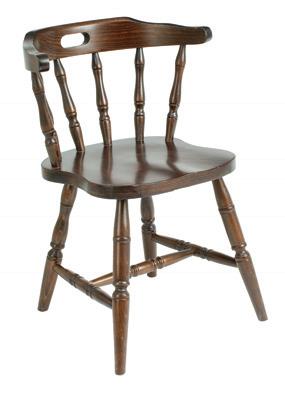
Of course, no traditional pub is complete without poseur tables and tall bar stools. Our cast iron table range is also available as tall tables, with the Double Dolphin Poseur Table being a magnificent addition to any interior, with its double height offering ample space for elbows and drinks. Pair with the Tall Captains Bar Chair or opt for the classic Tall Brass Rail Stool, which has 15% off for a limited time.
For more information about pub furniture to create a warm and welcoming atmosphere, please call us on 01162 864911or email sales@trentfurniture.co.uk

Commercial kitchen and washroom surface manufacturer Rearo has launched a cutting-edge sterile wall covering to enhance hygiene and durability in healthcare, catering, education, sports and commercial sectors.
Stericlad is a PVC-based hygienic cladding that offers a seamless, easy-to-clean surface, making it ideal for environments that require stringent infection control.
The proprietary brand is available in satin white, gloss white, and a selection of pastel colours, ensuring functionality and aesthetic flexibility.
Stericlad’s non-porous, hygienic surface resists bacterial growth and can be easily disinfected, making it appropriate for hospitals, dental surgeries, care homes, and food preparation areas.
The material is 2.5mm thick, providing robust protection against impact and wear while maintaining a sleek, professional appearance. It is available in 2440mm x 1220mm sheets, with satin white also offered in
3050mm x 1220mm for larger installations. A range of matching trims and adhesives ensures a complete system for professional installers.
Stericlad can be installed using H-section trims for a clean, professional look, or joined together using a welding rod for joints in high-specification environments.
The product is compatible with two-part adhesives for permanent bonding or silicone-based adhesives for simpler applications.
VERSATILE APPLICATIONS
ACROSS MULTIPLE SECTORS
Rearo is marketing and selling Stericlad to commercial clients in a range of sectors across the UK, including:
• Catering and hospitality: A durable solution for kitchens, canteens, and washrooms.
• Commercial and retail: Used in public washrooms, transport hubs, and retail spaces where easy maintenance is essential.
See the advert on this page for more.
Have you recently taken over premises, just fancy a change or need to replace your tired old fixed seating and fixtures? At Drakes, we can help you realise your dreams with our bespoke furniture design service.
Every week we build new tailor-made furniture up and down the UK, working with owners to come up with design concepts for fixed seating, booths and even bars and fixtures. We can take ideas from you, or your interior designer, or we can design something ourselves, all done efficiently, with professional quality and on time within budget. Our service provides a unique opportunity to make your establishment stand out from others and add additional comfort for your customers.

We have been providing bars, pubs, restaurants, cafes, clubs, and hotels with high-quality furniture and fixtures for decades. We employ over 15 joiners, upholsterers, polishers and designers who are capable of installing fixed seating and bespoke joinery, new bars and full refurbishments, or simply making stools for the front of the bar, or providing quality tables that last. Our dedicated team are either timeserved officially trained craftsmen or externally based professionals.
Got you interested? We are available for a chat on 01422 839 690. If you prefer, email us at sales@askdrake.com, and of course please visit our website www.askdrake.com


In today’s hospitality landscape, where guest satisfaction drives loyalty and every room night matters, poor bed installation is a hidden cost many operators can’t afford. At Silentnight Contract, we’re hearing increasing frustration from hoteliers who’ve experienced the impact of sub-standard installations –rooms out of service, frustrated staff, and guests who notice the difference. The problem? Many delivery teams treat hotel installations like residential drop-offs. They’re in a rush, unfamiliar with the unique challenges of working in an operational hotel, navigating guest check-outs, using service lifts, and coordinating multiple installations across a property. The result: mattresses that aren’t fitted properly, timelines that aren’t met, and standards that slip. One hotelier recently told us how choosing a cheaper installation option led to nearly 20 rooms fitted incorrectly. The team had to pay again for a professional service and lost revenue from rooms they couldn’t sell. It was a costly mistake, and one that could have been avoided.

Silentnight Contract (silentnight.co.uk/hospitality)
That’s why Silentnight Contract has built dedicated hospitality service teams with expert installers who understand the pressures of your world. Our teams work to your schedule, reduce disruption, and ensure every mattress is positioned and installed with care and precision.
A correctly installed mattress doesn’t just perform better, it lasts longer, maintains comfort, and reduces the risk of guest complaints or negative reviews. Professional installation isn’t just about convenience, it’s about protecting your investment, your operational efficiency, and your reputation.
After years working with leading hotel brands, we know that getting the small things right makes all the difference. While others may cut corners, we deliver quality from delivery to final fit.
To find out more, email our team at contracts@silentnight.co.uk or visit silentnight.co.uk/hospitality.
See the advert on the back cover of this issue for more details.
Beverley Holidays has completed its refurbishment of its restaurant with two dumbwaiters from Stannah Lifts, enhancing efficient operations at the on-site restaurant.
Open all year round, the Beverley Holidays in Devon welcomes guests seeking a fun-filled getaway with on-site entertainment, engaging daytime activities, a tasty range of food and drink options, swimming facilities, a wide-range of amenities, from EV charging points to laundry areas and stunning sea views of the South Devon coastline.
Beverley Holidays has been a valued Stannah customer for two and a half decades, with Stannah Lifts maintaining their 50A model dumbwaiter, which had been in service for 24 years. As part of a recent kitchen refurbishment, Beverley Holidays chose to invest in more modern and reliable dumbwaiter models to improve food service and enhance overall operational efficiency.
Stannah Lifts worked alongside contractors and architects, Gutxi, to install two new dumbwaiters
serving the kitchen on the ground floor and the restaurant on the newly extended first floor.
As this was a new installation, a prebuilt enclosure was constructed to house the lift and ensure it could be maintained over time. Once the installation was complete, Stannah returned to site to test, commission and UKCA mark the Microlift dumbwaiters, ensuring their safety for immediate operation.
The goal was to streamline the transit of food from the kitchen to the restaurant and enhance the guest experience, while working closely alongside the construction team and architects to ensure a smooth installation into both existing and new structures.
Stannah Lifts attended an initial site visit and a detailed pre-order meeting with the construction team and architects to discuss the installation requirements and anticipated challenges.
One challenge was designing a dumbwaiter solution that would fit within a newly built enclosure attached

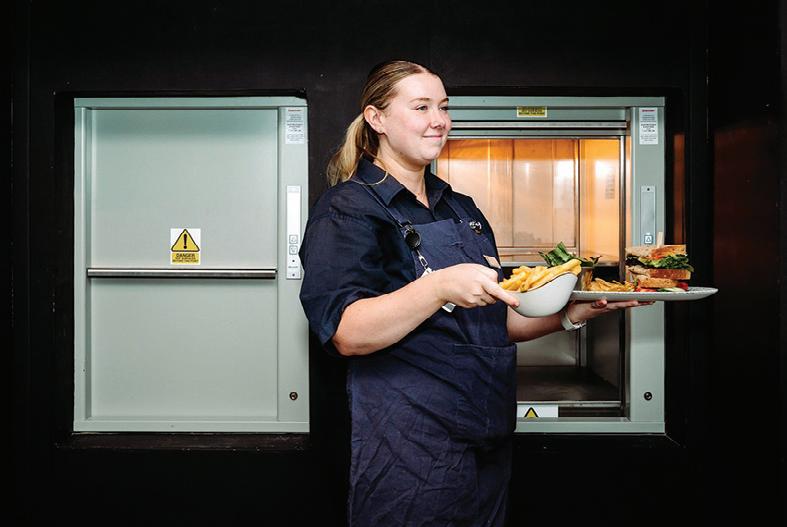
to the side of the existing clubhouse. After comparing them with the actual built dimensions of the site, the dumbwaiter models originally envisaged for the project were found to be too wide to fit in the available enclosure space. Therefore, an alternative Microlift model with more compact dimensions was selected to ensure compatibility with the enclosure width.
Drainage systems and a mechanical cowling were also obstructing the proposed shaft location and needed to be rerouted and repositioned. The firstfloor extension had to accommodate not only the two dumbwaiters but also provide adequate space for ongoing maintenance access. This involved close coordination with the site teams to ensure structural modifications, such as wall opening and shaft dimensions, were correctly executed.
The first-floor extension was revised to include sufficient space not just for the lifts, but for safe and practical access for future maintenance.
Stannah Lifts proposed the installation of two 50C dumbwaiters, which were better suited to fit the narrow shaft dimensions. These small service lifts are ideal for pubs, clubs and restaurant settings, enabling the efficient and safe movement of items between floors.
With an upgraded capacity of 100kg and reduced headroom of 2800mm, as opposed to the original 100B model specified which had a 3000mm headroom, this kitchen lift solution makes it easy to fit into the space available.

Built with removable stainless-steel shelf and infrared heat lamps to keep food warm during transportation, the Microlifts are fully compliant with regulations, offering smooth operation rise and fall shutters fitted with safety locks.
The dumbwaiters installed in the restaurant are controlled with fully automatic push buttons at each entrance for ease of use.
The two dumbwaiter service lifts were successfully installed and fully integrated into the extended structure on schedule. These Microlifts now play a vital role in minimising manual handling hazards and enhancing the efficiency of food service between the kitchen and restaurant, enabling quicker and more hygienic food transportation across floors. Finished in a sleek grey baked enamel, the revised lift models fit precisely within the new shaft, with access points that complement the overall design. Through close collaboration with the construction team and architects, from the planning phase to project completion, Stannah Lifts provided a bespoke solution that met all specifications and significantly improved the holiday park’s food service operations. Stannah Lifts is proud to continue supporting Beverley Holidays with ongoing maintenance and repair services for the dumbwaiters. With twelvemonth warranty and servicing included, including 24/7 emergency callout, Beverley Holidays can be confident that their dumbwaiter will remain in optimum condition, leading to fewer breakdowns, lower running costs and a reliable service overall.
Pete Allen, Platform Lift Sales Manager from Stannah Lifts Platform and Microlifts Division, said:
“This project is a great example of how thoughtful planning and close collaboration can deliver a practical solution that enhance both operational efficiency and user experience. The successful integration of our dumbwaiters has transformed food service at the holiday park, and we’re proud to support their continued performance through our dedicated maintenance service.”
For more information, visit: www.stannahlifts.co.uk
MST AUCTIONEERS Ltd specialise in handling & auctioning a wide variety of goods.
We act for Insolvency Practitioners, Receivers, Bailiffs and Solicitors as well as large PLCs.
We are members of The National Association of Auctioneers and Valuers (NAVA).
For the past 25 years, we've provided a unique disposal service tailored to suit, liquidators, banks, receivers as well as private and corporate vendors. We carry out probate valuations and conduct complete house and commercial clearances.
We have the largest Auction venue in the South of England. Our regular monthly Auctions occupy 45,000 sq.ft. of undercover space, selling over 2500 lots from 3 rostrums over two days.
We also hold regular Auctions ”On Site” and "On Line"
Visit www.mstauctioneers.co.uk for further information.
Holmes Catering is a leading UK supplier of bars, countering and fabrication for the catering and hospitality sectors, working with leading hotel, pub, retail, and food service chains. Be it The Grand Hotel Brighton or a niche country pub, Holmes prides itself on providing practical solutions and implementation of designs, utilising its skills, experience and well-developed supply chain refined over 30 years in business. Examples include ultra-long highly durable stainless and solid timber events bars; sophisticated stone clad champagne bars; through to cocktail stations and breakfast counters, with brands such as Mercure, Novotel, Millennium and Premier Inn.
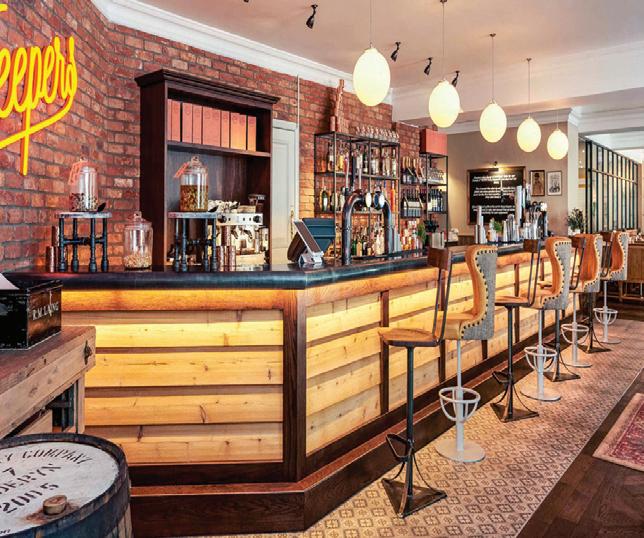
materials. They can include features for drink fonts, payment points, bar rails, lighting, and finishes such as tiles, paint, prints and wallcovering. Over-structures can be incorporated to enhance both form and function—ranging from classic brass racks to modern, glazed, and painted designs. Similarly, back bars help define the look and feel, whilst offering precious storage, prep, and display areas. Behind the scenes Holmes provides high-grade stainless steel under bars, with configurable features such as ice wells, payment points, cocktail stations, and speed rails, long with sturdy kitchen benching and storage units to complete back-of-house facilities.
Holmes is a leading UK manufacturer and installer of premium countering, bars and bespoke fabrication solutions. Why choose us?
• Durability you can trust – Built-to-last, rugged stainless-steel structures.
• Premium materials – Quality quartz, solid surface (Corian), real stone, marble, timber and more – finished to your exact specification; polished, stained, painted, patinated… exactly as you envision.
• Tailored designs – Custom frontages and layouts to suit your style and functional needs.
• Finishing touches that impress – integrated LEDs, custom printing, signage, screens, bar fittings, edge detailing, and more.
At Holmes, we bring concepts to life—working from architect drawings, brand guidelines, or even just a sketched idea. Counters and bars are often a focal point but must also be durable, hygienic, and functional. Holmes builds theirs to last using stainless-steel frames. These can be clad and topped in many materials, including quartz stone, Corian, real or composite timber, even metals like brass or zinc, or recycled
Mayfair Furniture will be celebrating 12 years this year of providing the UK’s fastest and affordable commercial furniture. Supplying all kinds of establishments from high end hotel chains to small local takeaways.
We keep in stock a huge variety of items ready for immediate dispatch, and can fulfil a wide range of bespoke orders. We deliver to all areas of the UK, Ireland & Europe.
We are not just a supplier; we understand that from time to time hospitality and leisure establishments like to give themselves a fresh new look. That's why not only do we supply contract furni-
Now part of the Nisbets and Bunzl plc, Holmes continues to develop and grow sustainably to support its customers aspirations, offering a full-service solution from concept to installation, with a ‘can-do’ approach.
01759 375500
sales@hce.co.uk www.hce.co.uk

Along with our sister company Caterfair who provides commercial catering equipment for your kitchens we are the ideal people to speak to when you are looking to refurbish.
01733 310115
sales@mayfairfurniture.co.uk www.mayfairfurniture.co.uk
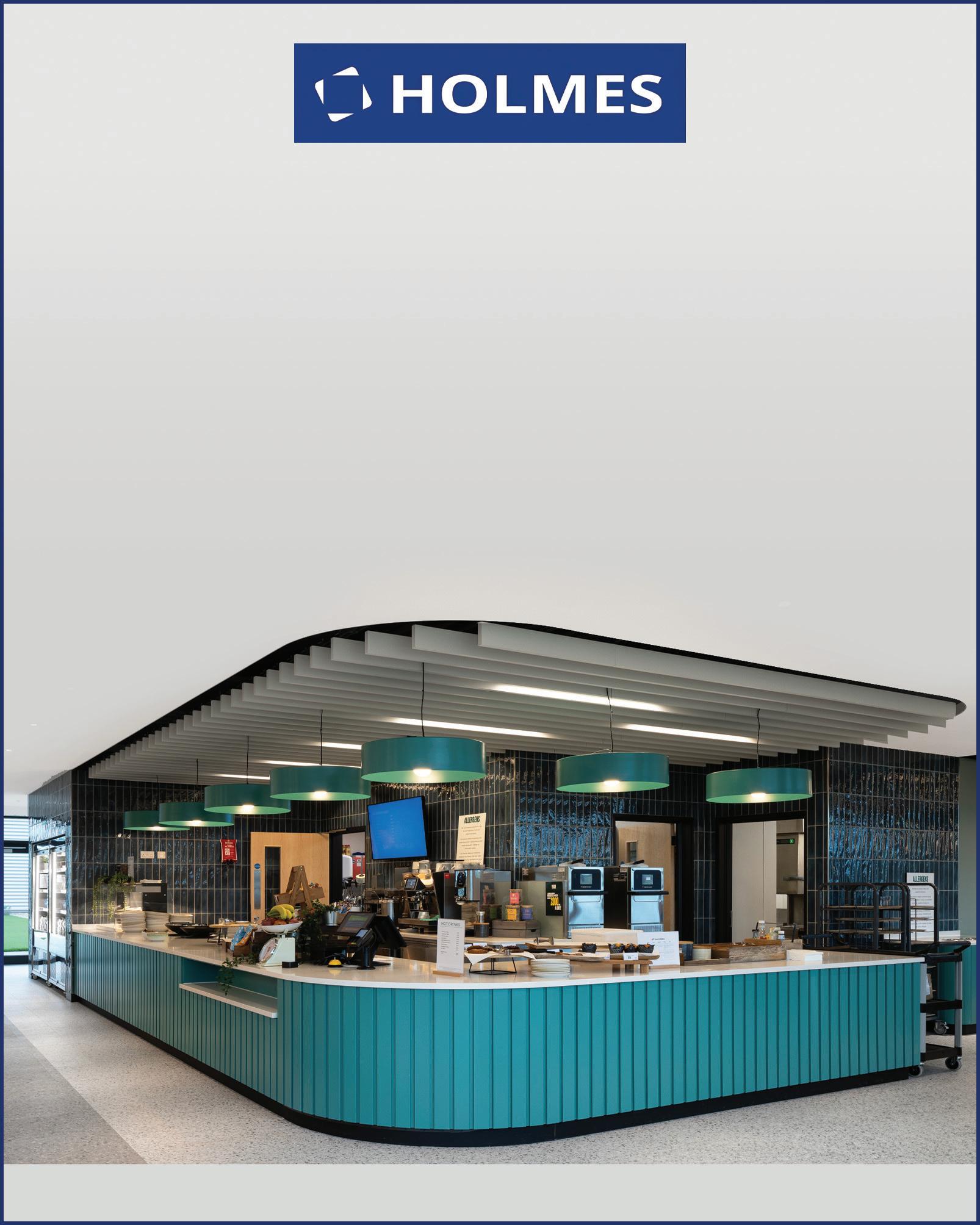



Earlier this year, the Treasury confirmed it will permanently lower business rates multipliers for retail, hospitality and leisure properties in the upcoming Autumn Budget, to apply from April 2026.
This is clearly good news for the hospitality industry. However, with a revaluation due in 2026, the reality is that this change provides no real certainty for hospitality businesses. Until the draft 2026 Rating List is published along with the multipliers, no business knows what their rates payable will be from April 2026. Additionally, the lower multipliers afforded by the Non-Domestic Rating (Multipliers and Private Schools) Bill only apply to properties with a rateable value of less than £500,000, leaving the rest subject to even higher multipliers than before.
So, what needs to be done to ensure long-term relief? And what other factors might be impacting hospitality on our high streets?
As well as an interim report on the future of businesses rates expected to appear in the immediate term, there have been further interesting recent developments of note for hospitality operators – among them the government’s insertion of a clause in the Devolution Bill that bans upward only rent review clauses in new commercial leases. The Law Commission also determined that only modest changes were required to the Landlord and Tenant Act 1954. Often having high fit-out costs, hospitality businesses need to be aware of the risks of contracting out of the Landlord and Tenant Act. It is also crucial they remember the rateable value is meant to represent the open market rental value at the relevant valuation date – currently 1 April 2021, but from 1 April 2026 this will change to 1 April 2024. With the move to revaluations every 3 years there will be another revaluation in 2029 with a valuation date in April 2027. With rental agreements followed by changes in rateable values in the ensuing years, it is essential care is taken by all businesses to ensure their rental agreements are as low as possible from the outset to ensure

With over 30 years of industry experience in the Hospitality sector, The Bowden Group’s Managing Consultant David Hunter will work with you to address the following elements:
Profitability, Operational Strategy, Staff Management, Marketing and The Future of your business.
Our experts will analyse your entire operation and also its key operating figures if they are available. We then help you to identify strategies to manage costs and overheads associated with the core Profitability of running a Hospitality business.
The largest overhead, even higher than Cost of Sales, is the Labour cost, so, with detailed analysis of your wages and being able to understand ‘’the way
your business actually works’’ we can ensure that you are maximising the labour usage in your business.
Budgeting, Forecasting, Menu Management, Stock Controls, Purchasing, and controlling Variable Costs are just a few of the other areas that David Hunter, your Restaurant Consultant, will work on with you, and improve with you.
Managing people brings with it a whole set of new skills that are now needed more than ever. From ‘’Managing the Managers’’ through to Service and Kitchen staff, your team needs careful and skilful Management, Motivation, guidance and Development.
If your business is actually struggling, or if you just feel that it could be doing some things better, give David Hunter a quick call on 07831 407984 to arrange a ‘’Free of Charge’’ initial consultation (please quote CLH Offer), when David will discuss with you what could be achieved if you ask us to work with you.
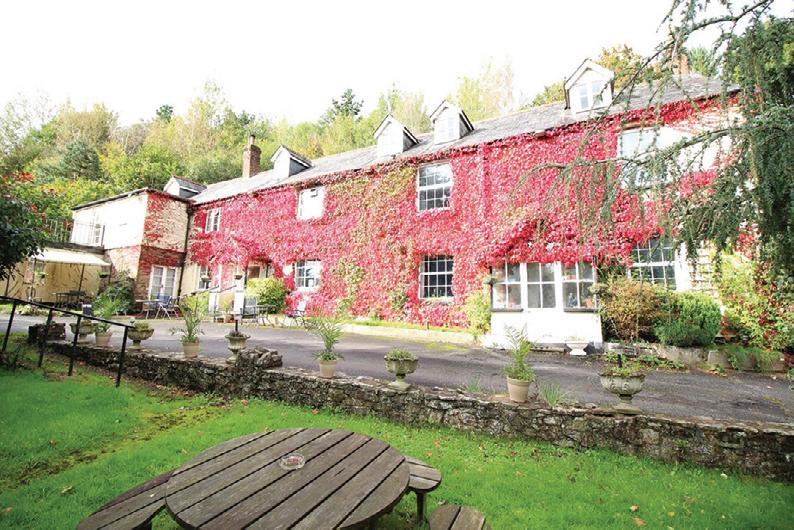
By Chris Grose, Rating Director, Hartnell Taylor Cook (https://htc.uk.com)
costs don’t rise astronomically. Those in hospitality also have to make sure they do not end up paying more rent just because their rates are lower – the catch here is that the higher rent will reflect in higher rates at the next revaluation.
The reality is that the governments changes are merely a sticking plaster to try and keep retail, hospitality and leisure businesses onside, but the wounds are deeper and more serious than the relief offered. These changes make little worthwhile contribution to reducing the costs of running a business, which is the chief challenge for hospitality operators trying to get by in today’s climate, and will have also naturally been offset by April’s rise in national insurance contributions.
Ultimately, if all the government does is tinker round the edges of the business rates system, we can wave goodbye to meaningful change for the sector. The uniform business rate was 34.8p in 1990 and is now 49.9p for smaller properties and 55.5p for larger ones (higher in London due to the Crossrail and City of London supplements), illustrating a percentage increase for rent paid in rates of 35% to 50% and above – it’s certainly not hard to illustrate why the sector is worried.
If the system worked correctly, the total value of the Rating List would accurately reflect the economic circumstances of commercial property and the rate in the pound would stay fixed. This would in turn give businesses the advantage of being able to budget ahead as they would be able to directly estimate their ongoing liability for business rates.
Of course, fixing the rate in the pound now does businesses no good as the rate is at a historical high. The government needs to find a way of reducing the rate in the pound to nearer the 34.8 that applied in 1990, but this would involve difficult decisions because there would be a loss of income to the Treasury which would have to be made up some way or another.
We await publication of the draft 2026 Rating List and details of the rates in the pound later this year. In the meantime, though, the government have attempted to silence their critics by introducing a scheme where, actually, the benefits are unknown. Irrespective of how the Government spins the announcements about business rates later this year, there will be winners and losers, but it is likely the government will lay on thick the lower multiplier for most hospitality businesses instead of enacting more extensive, systemic and sorely needed change.




